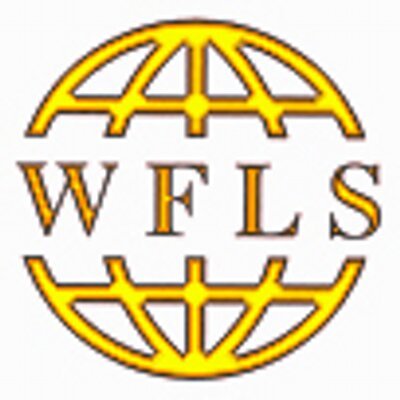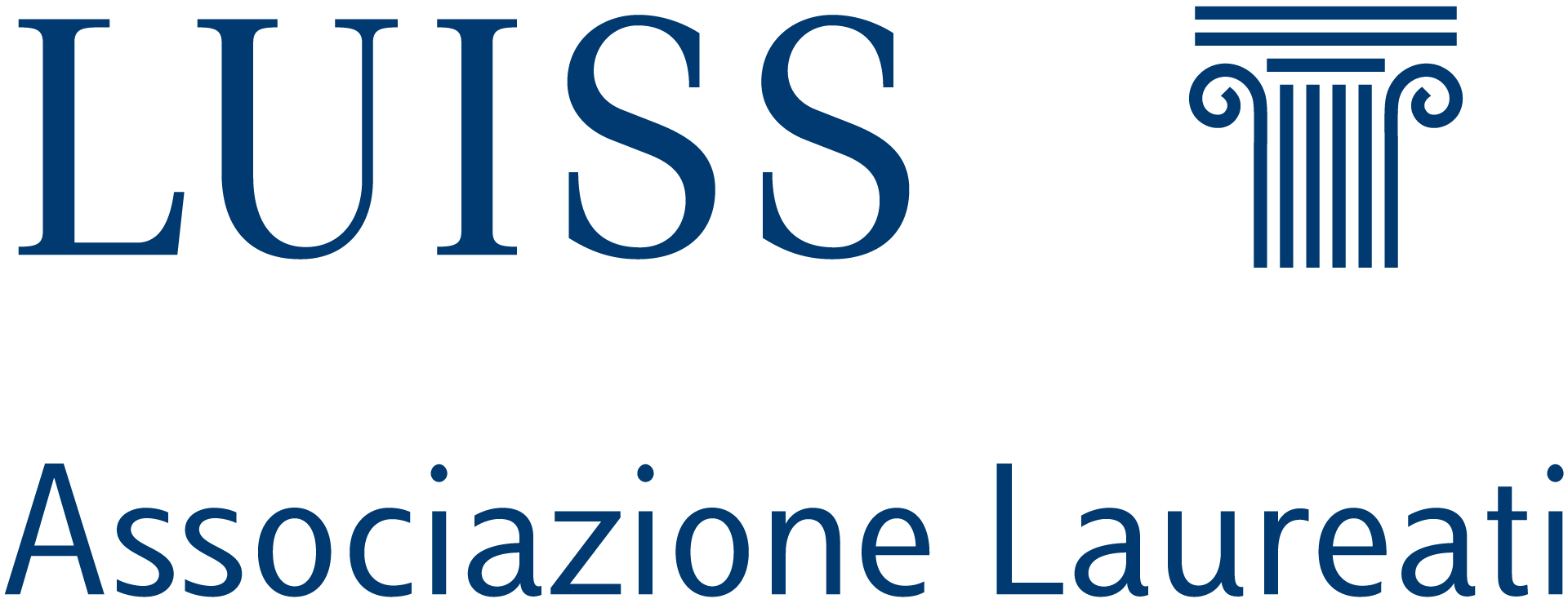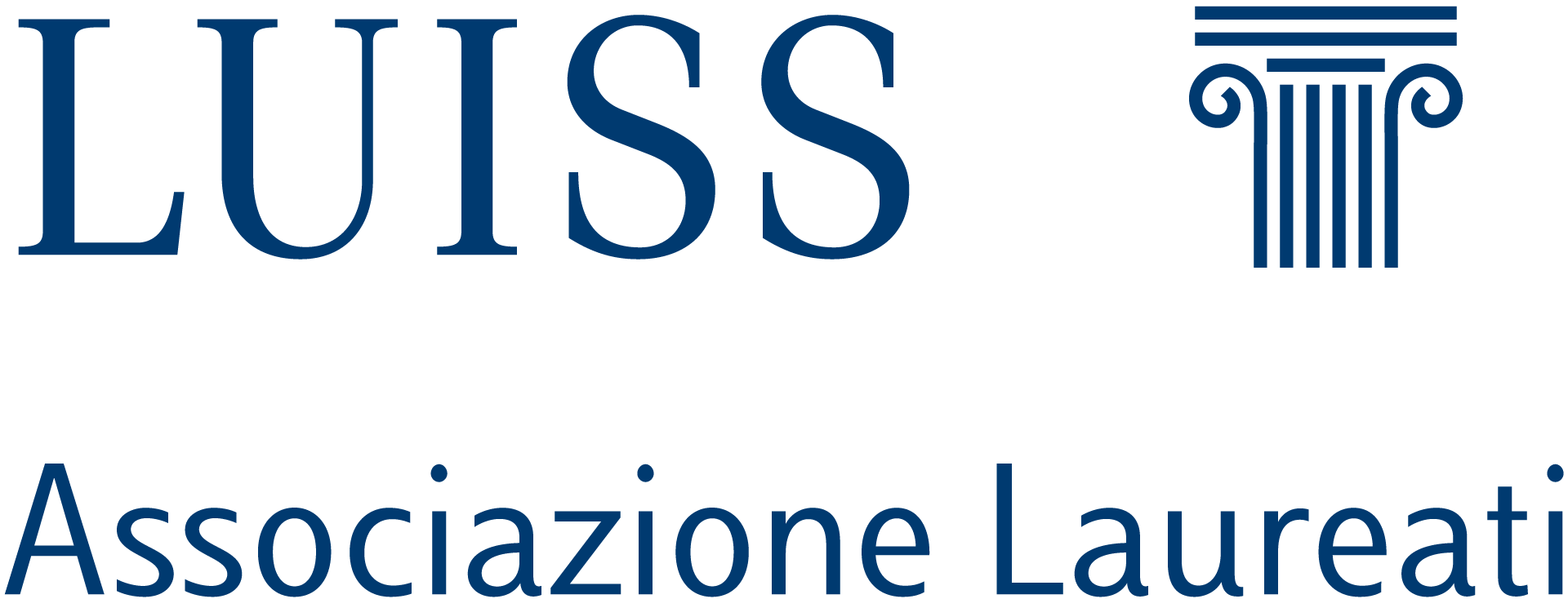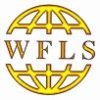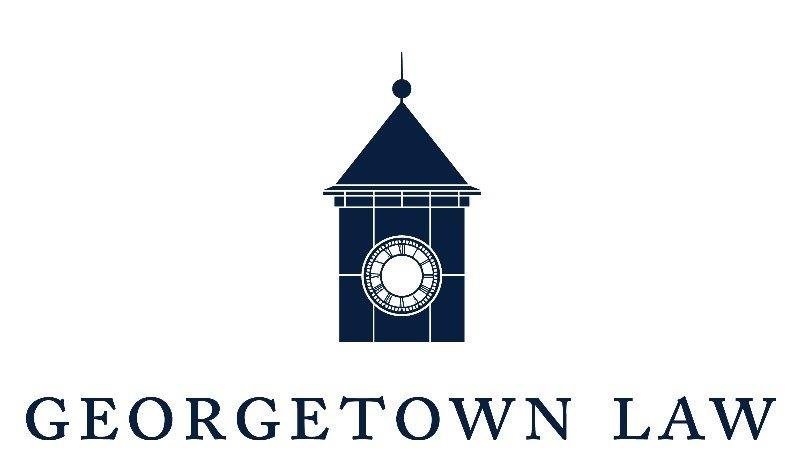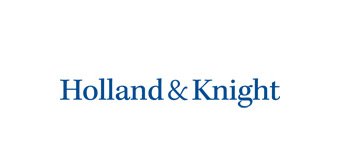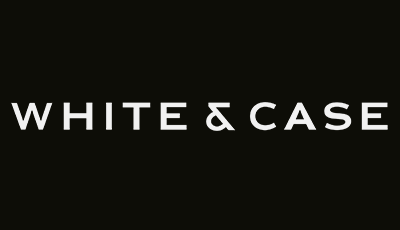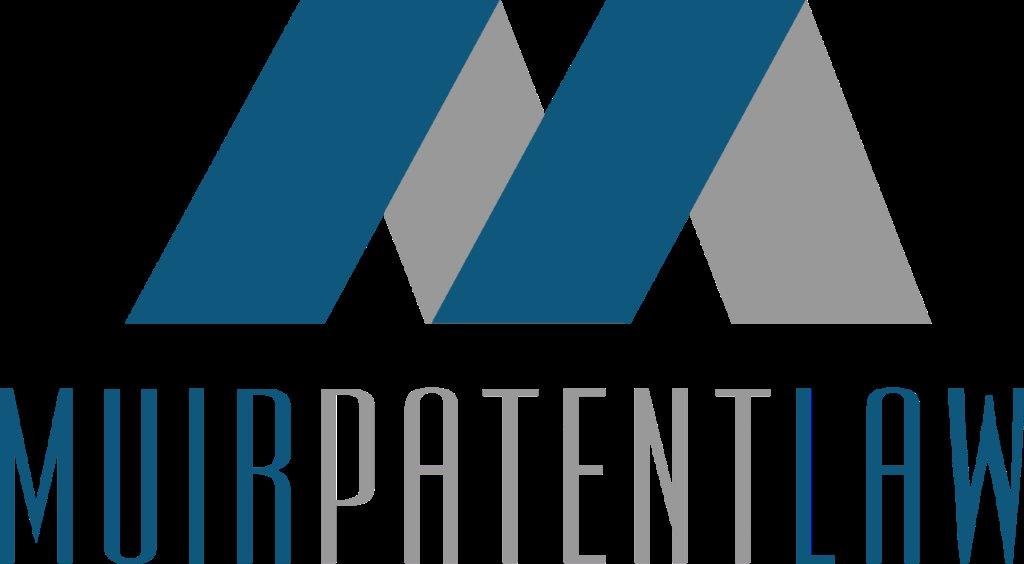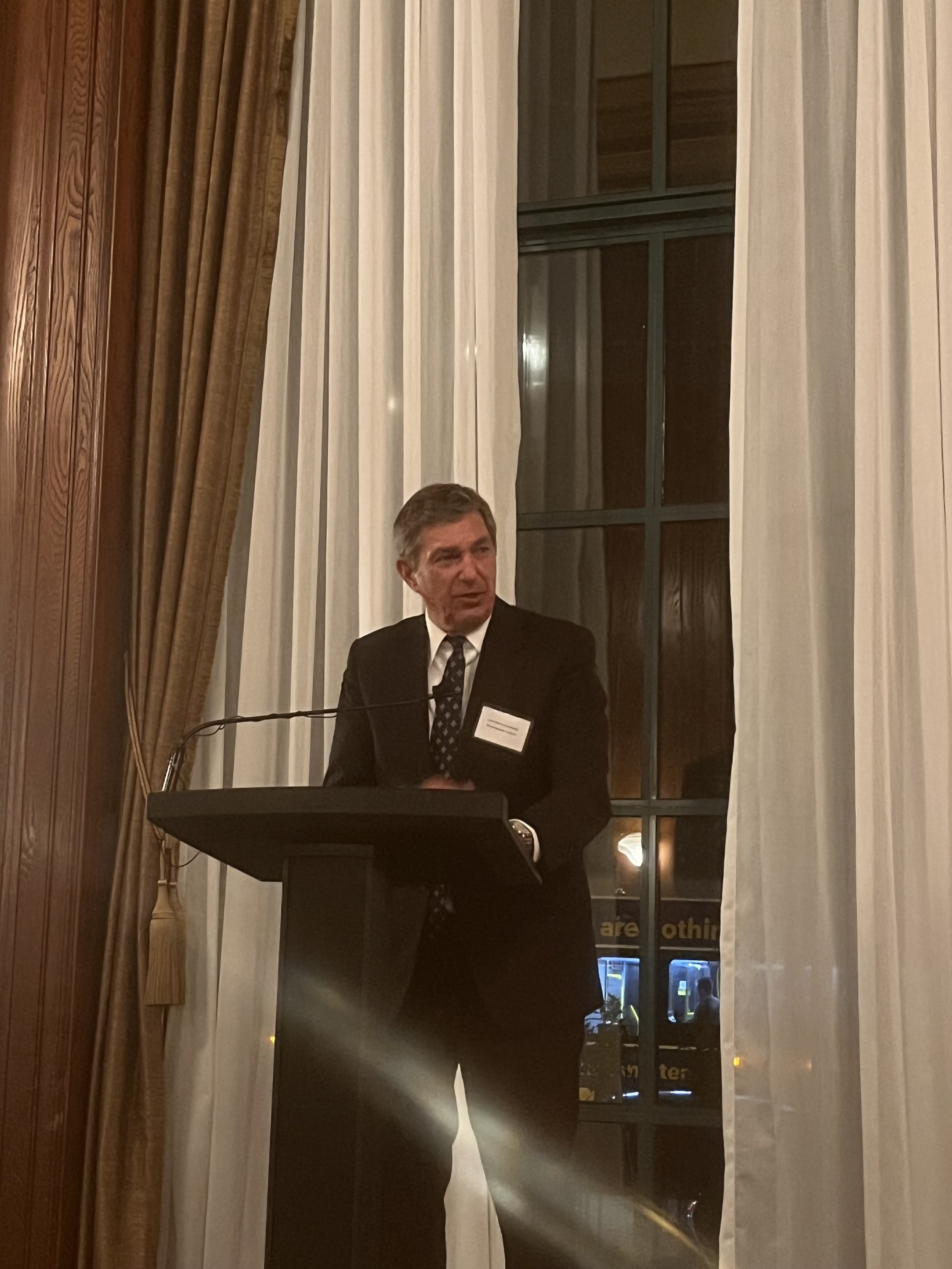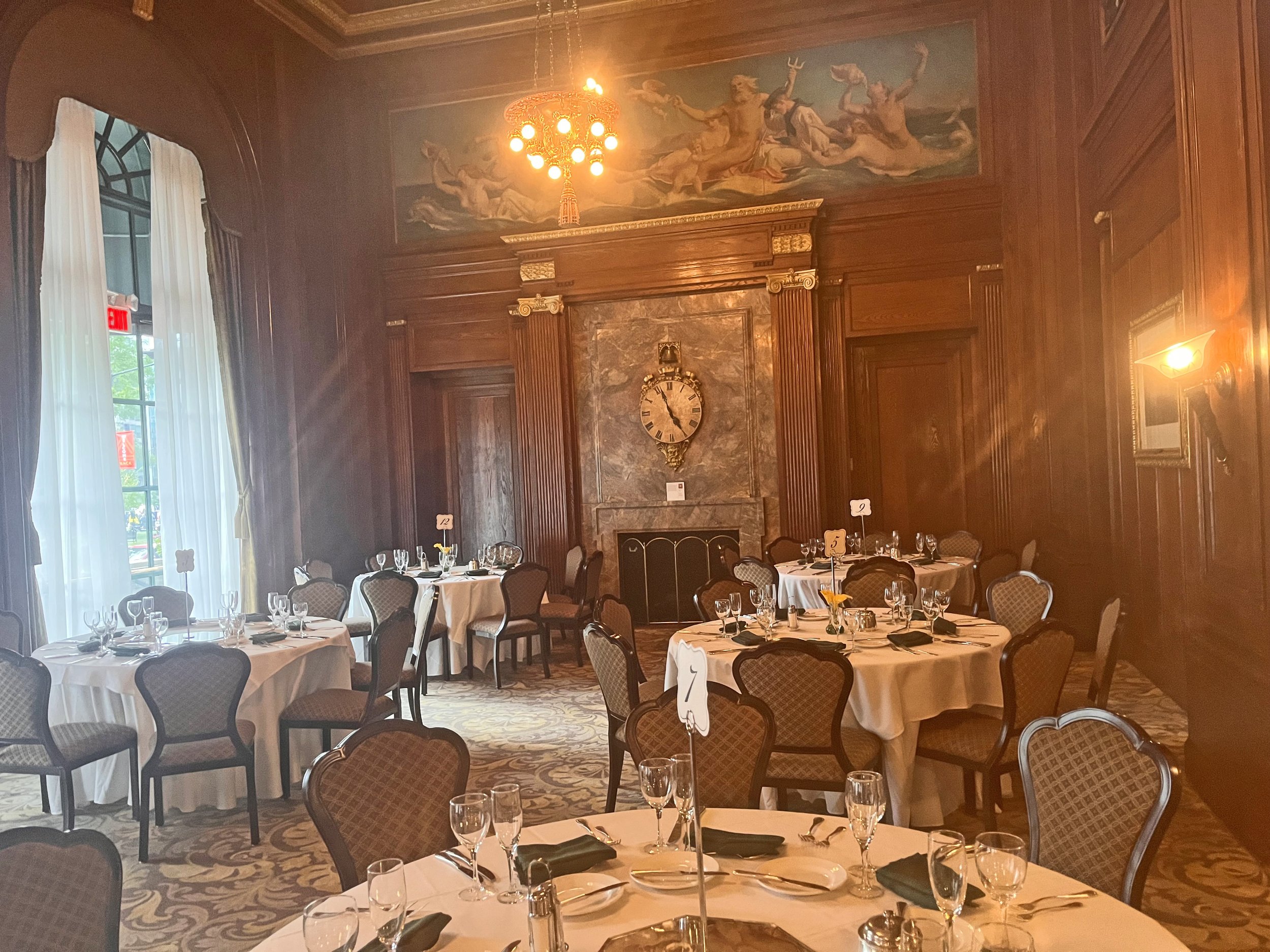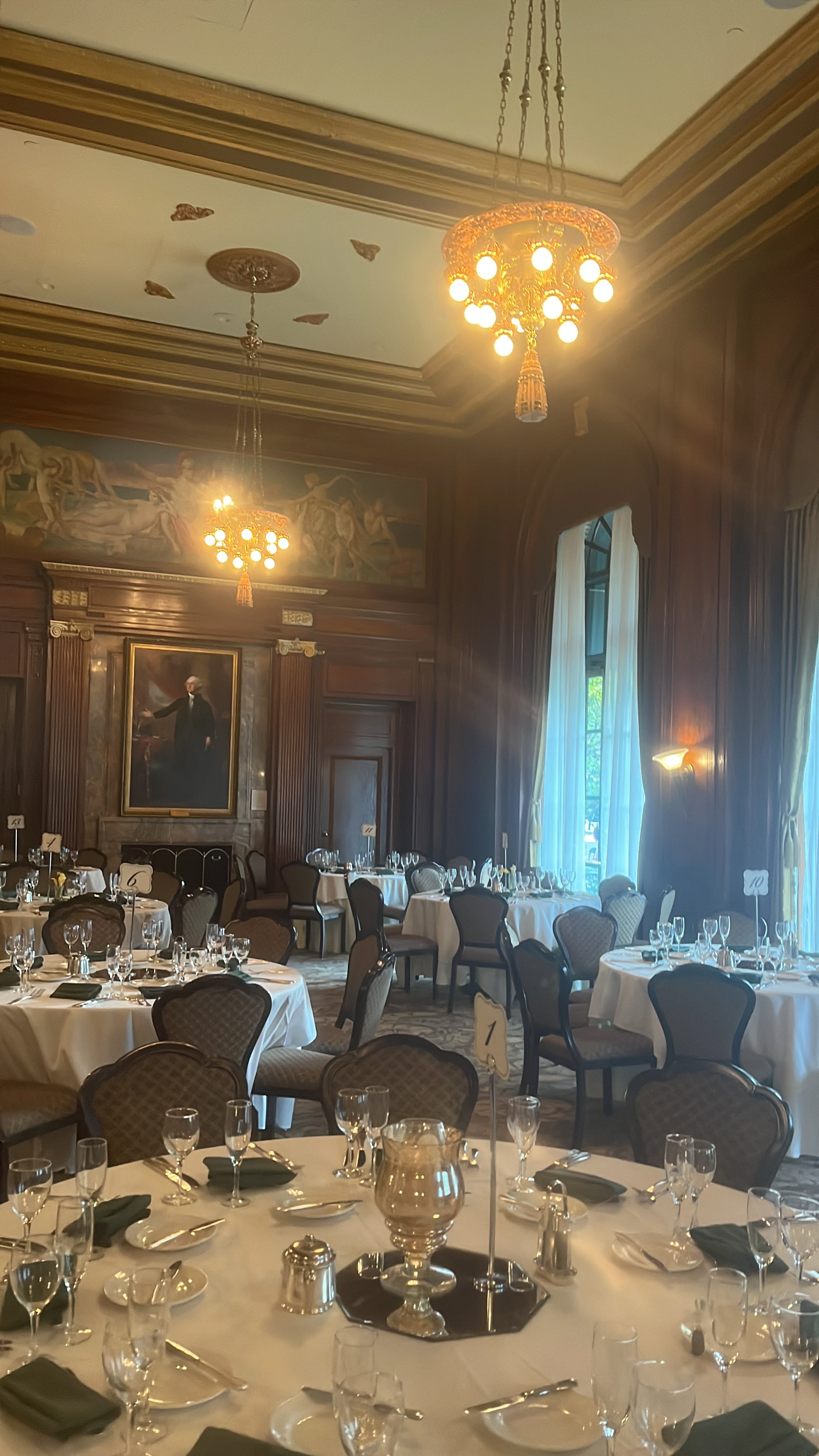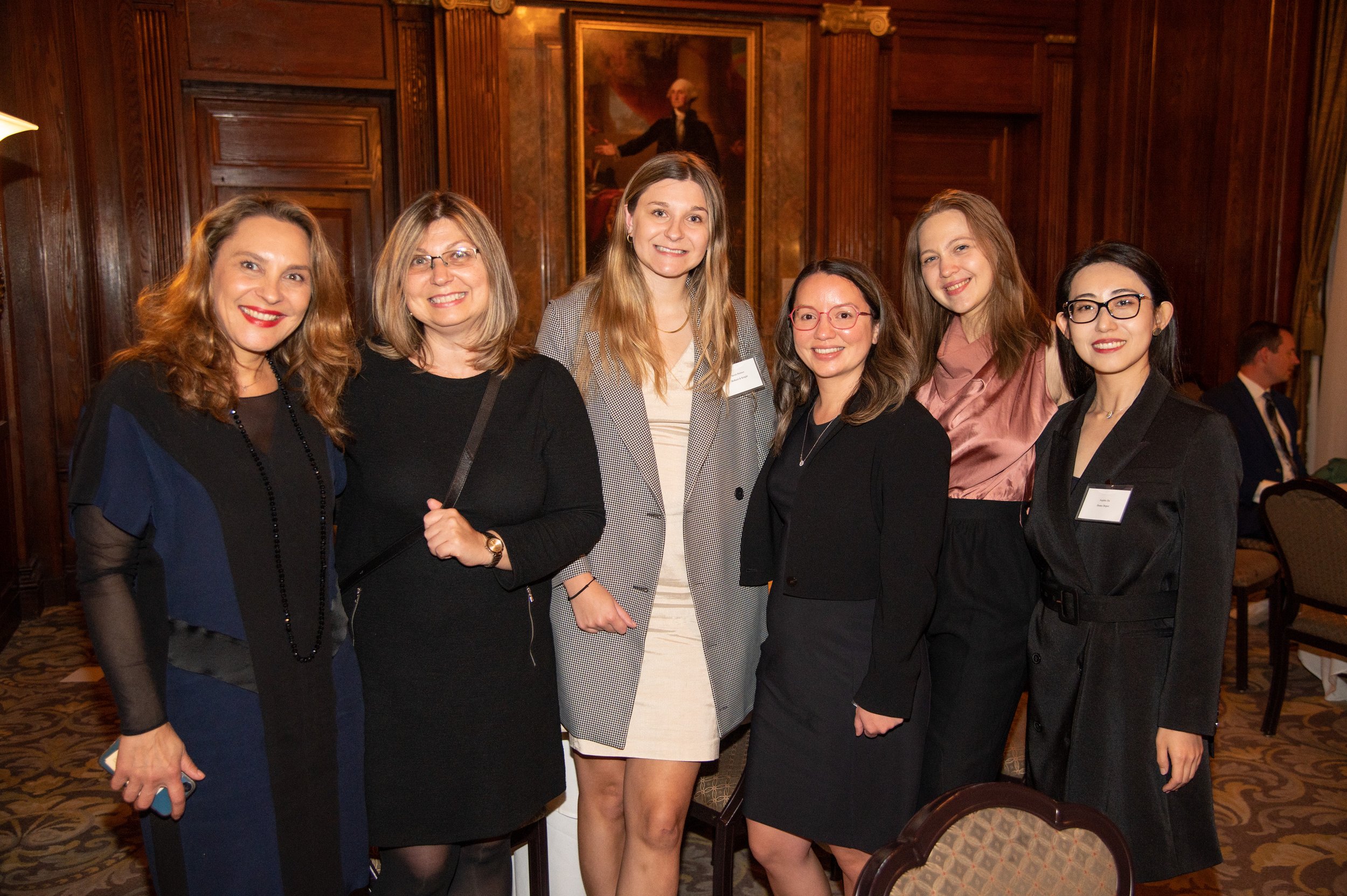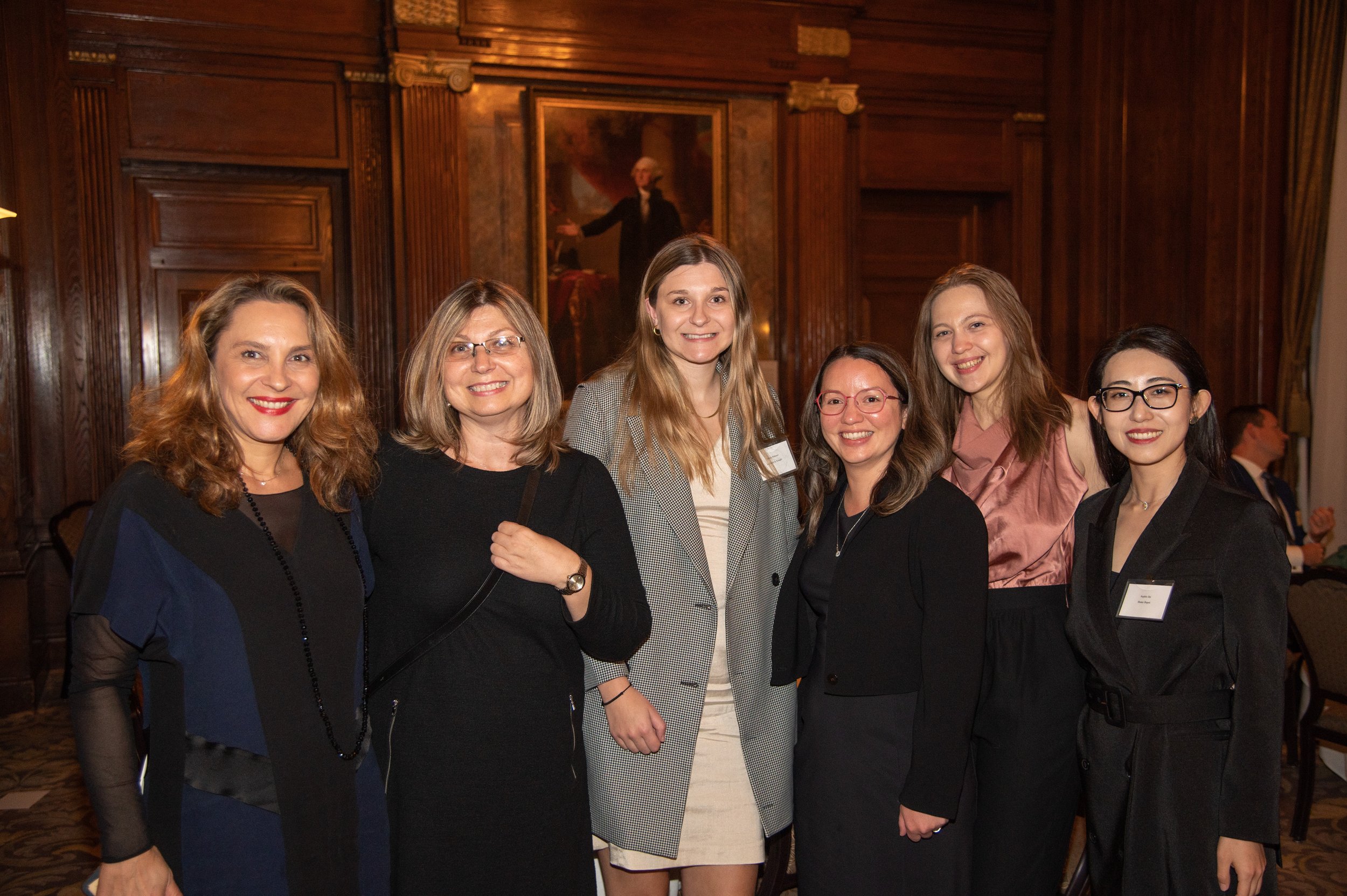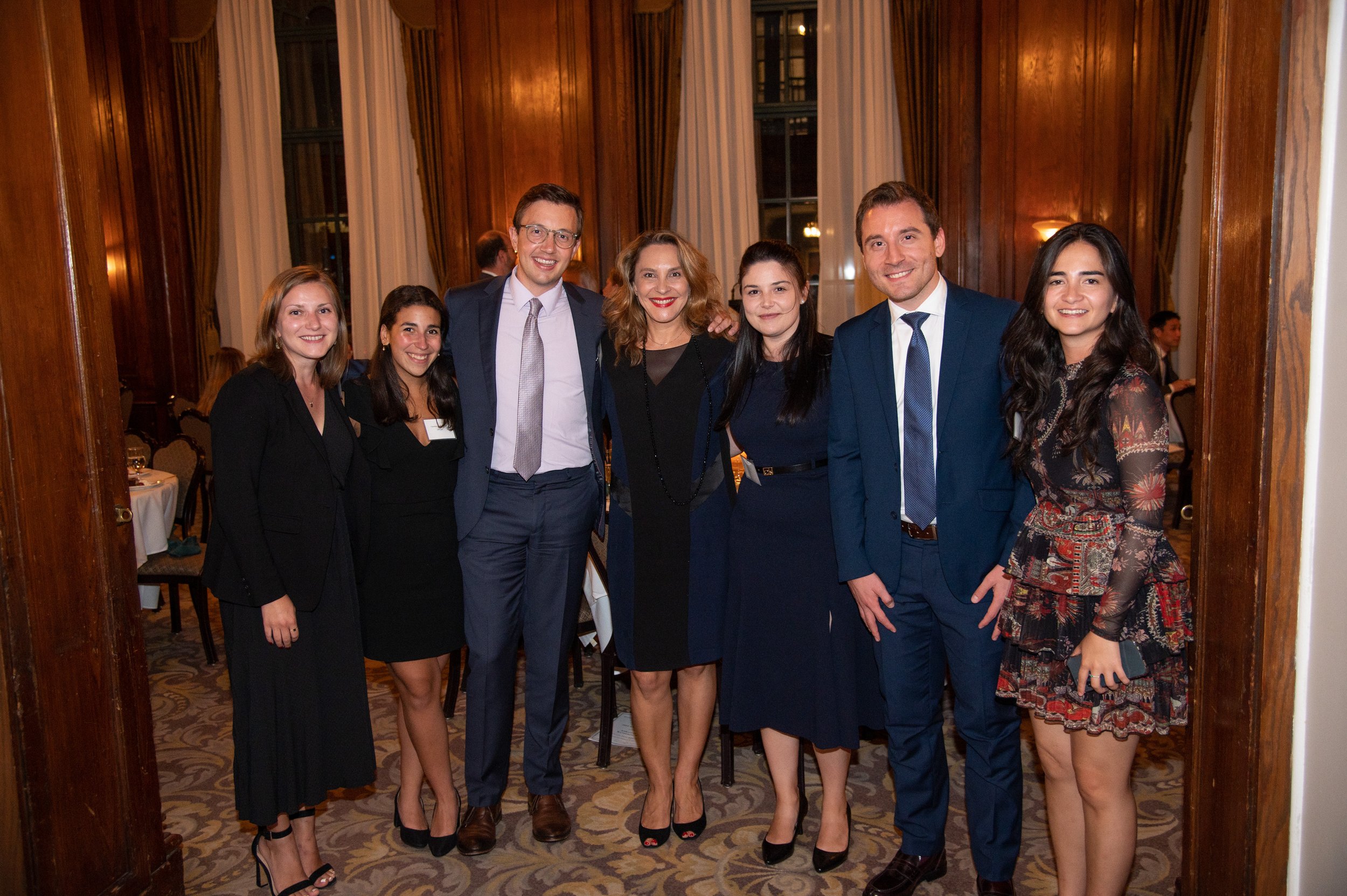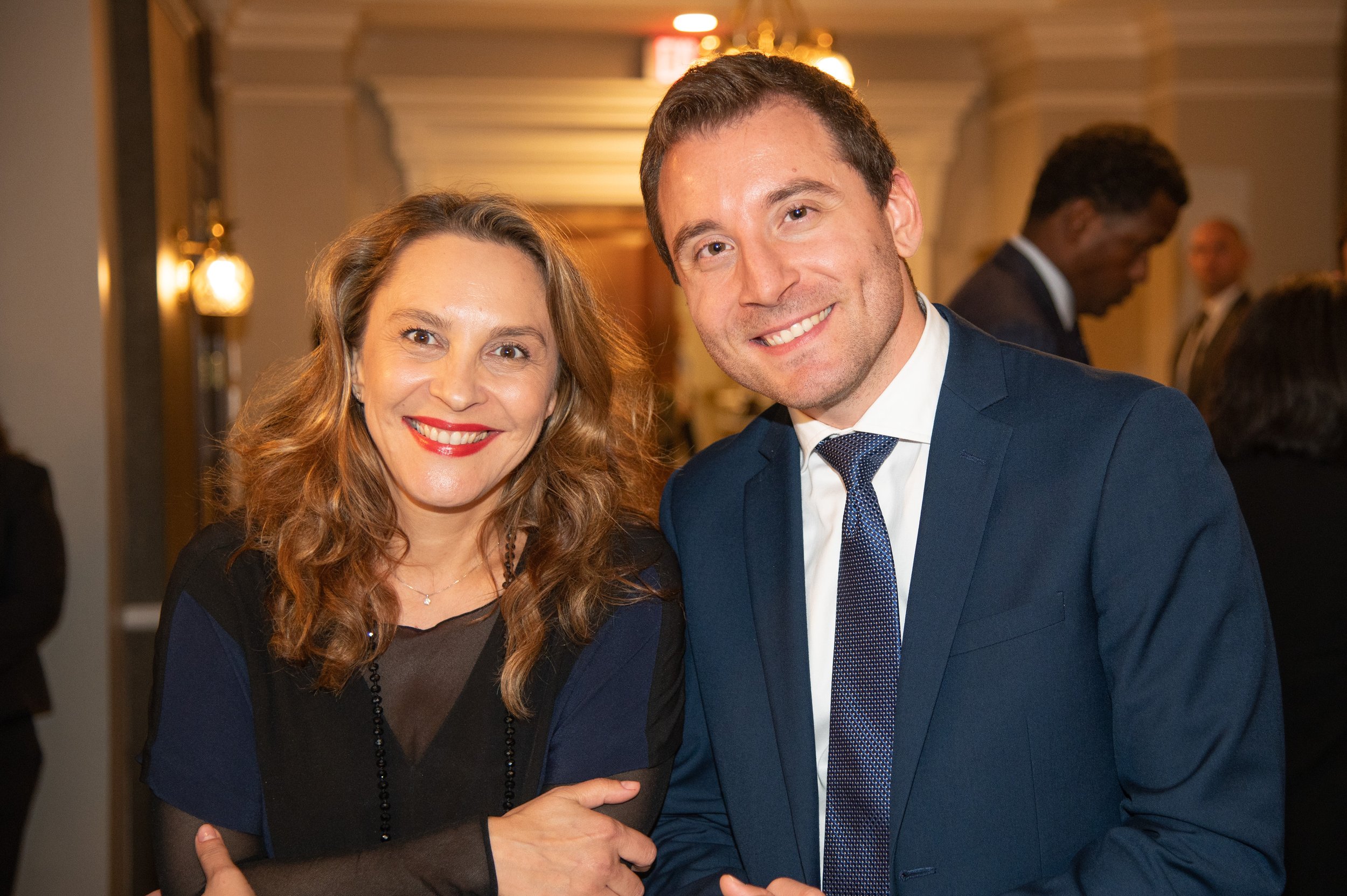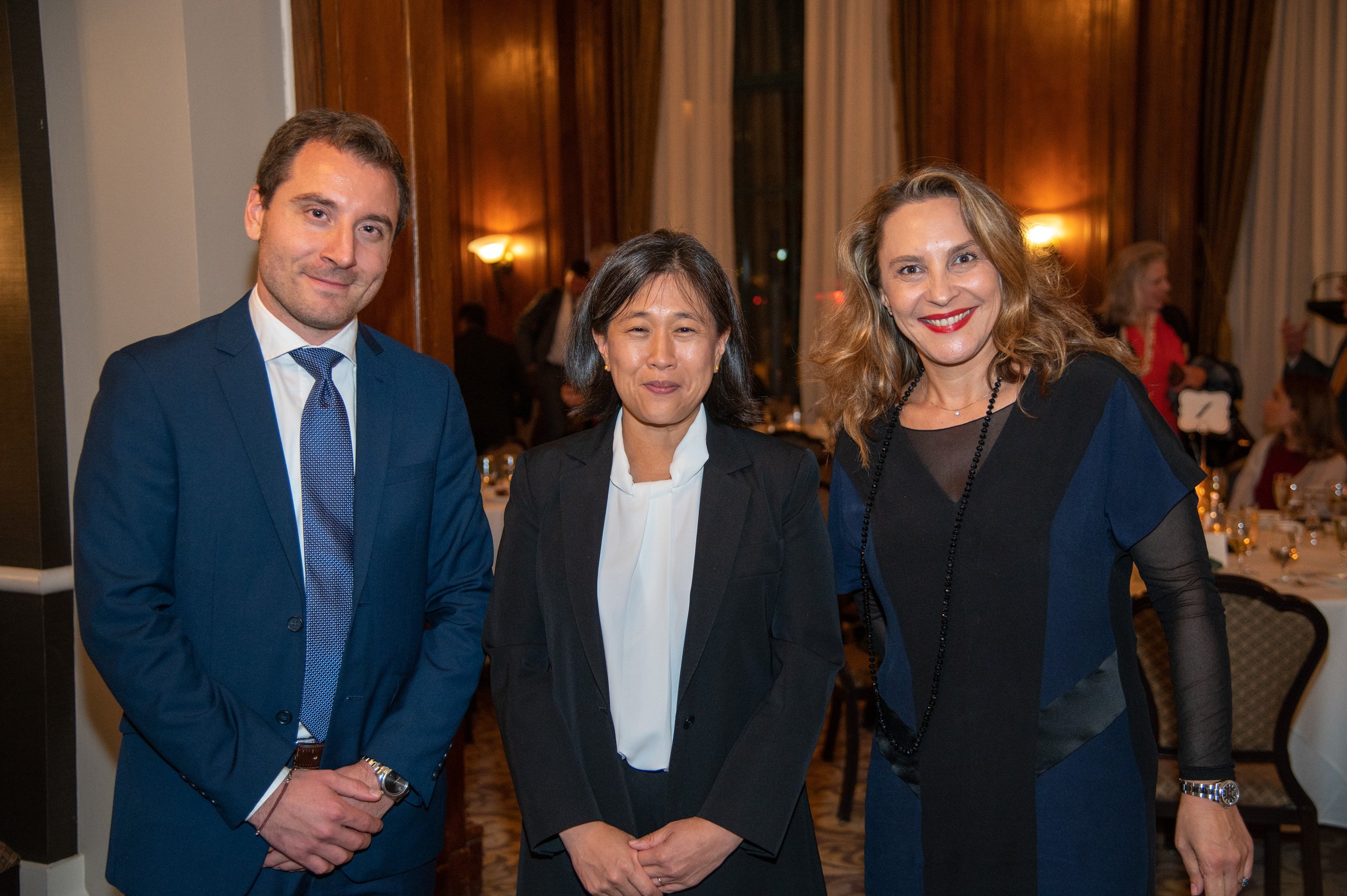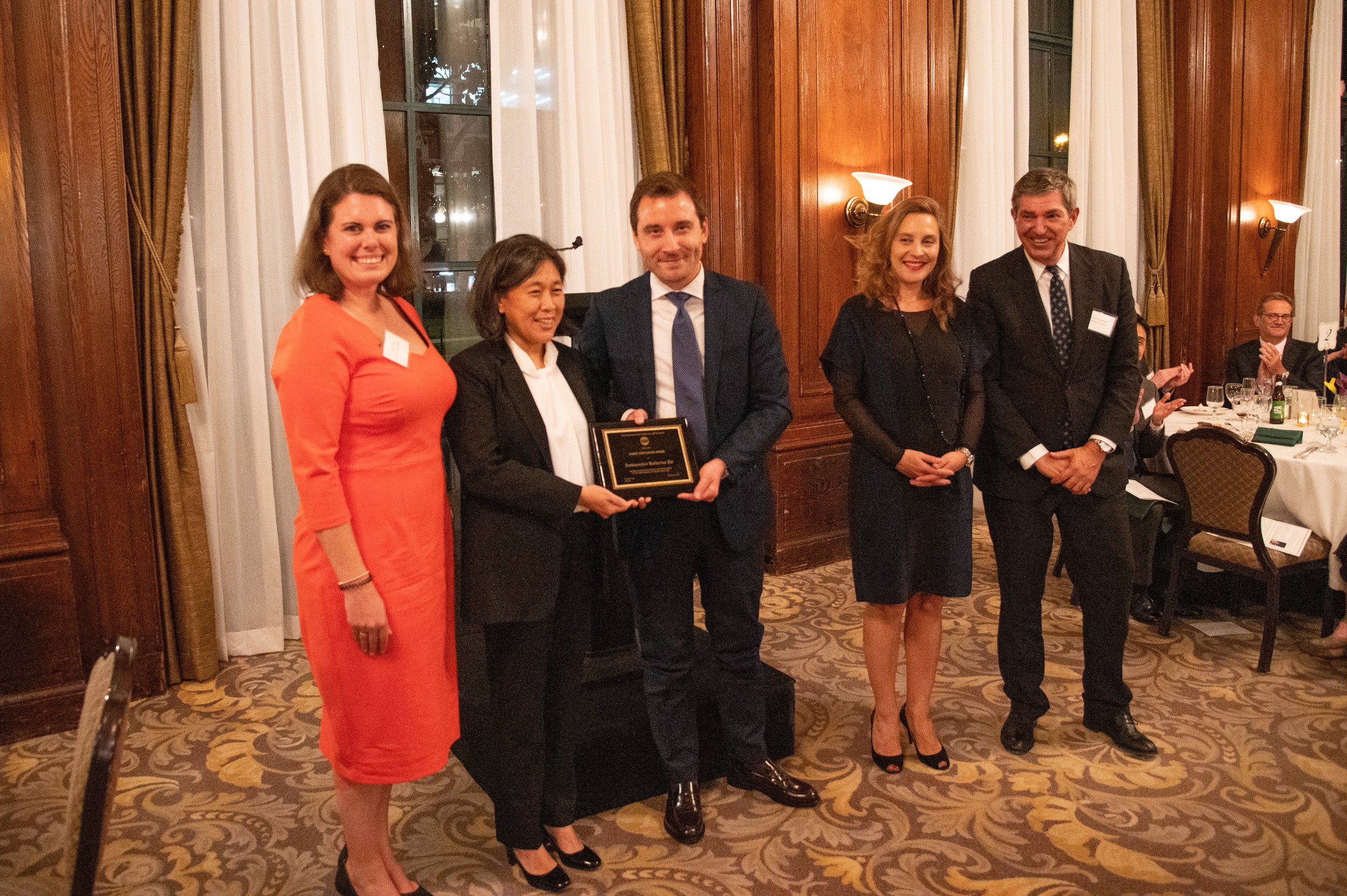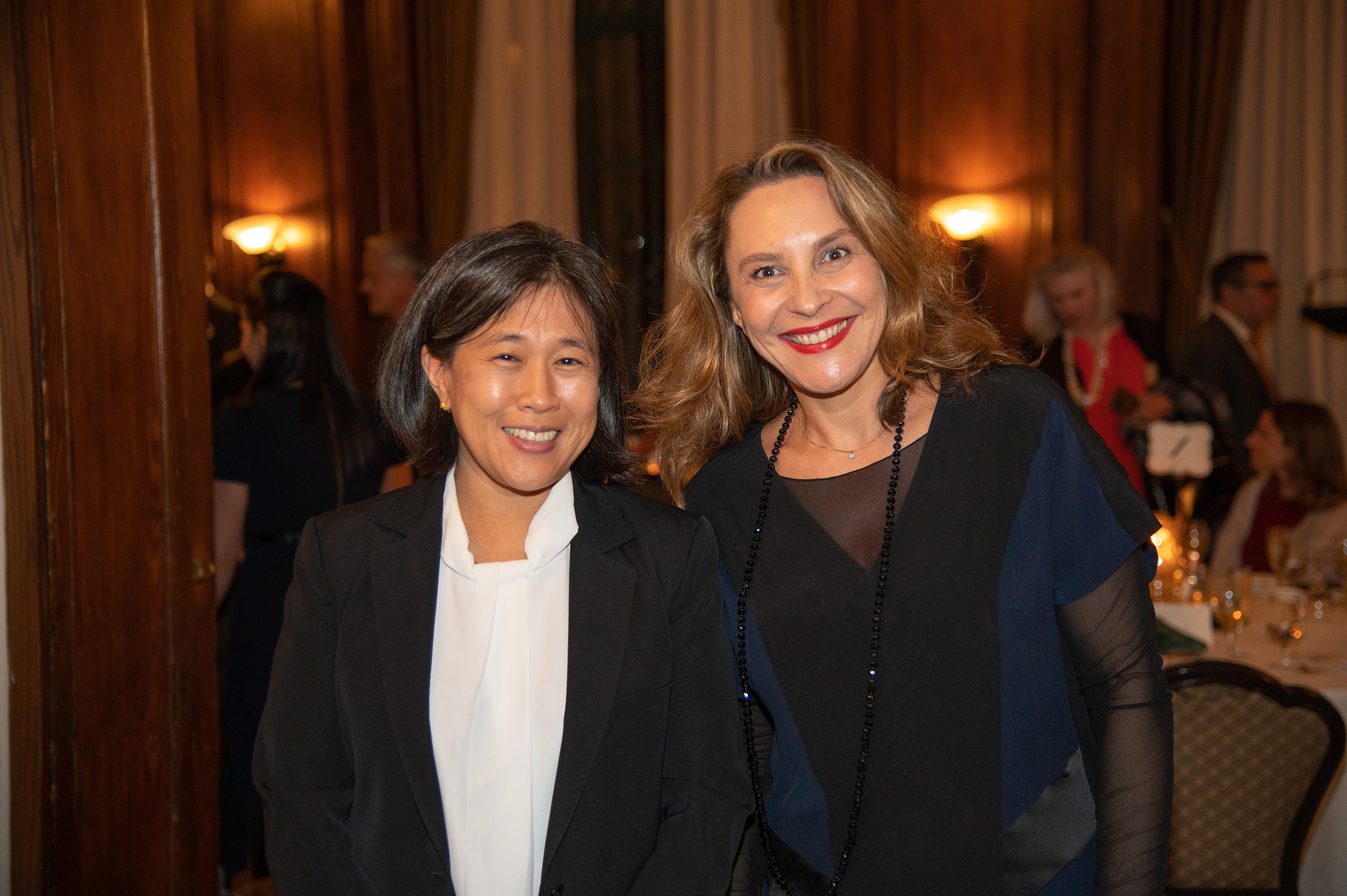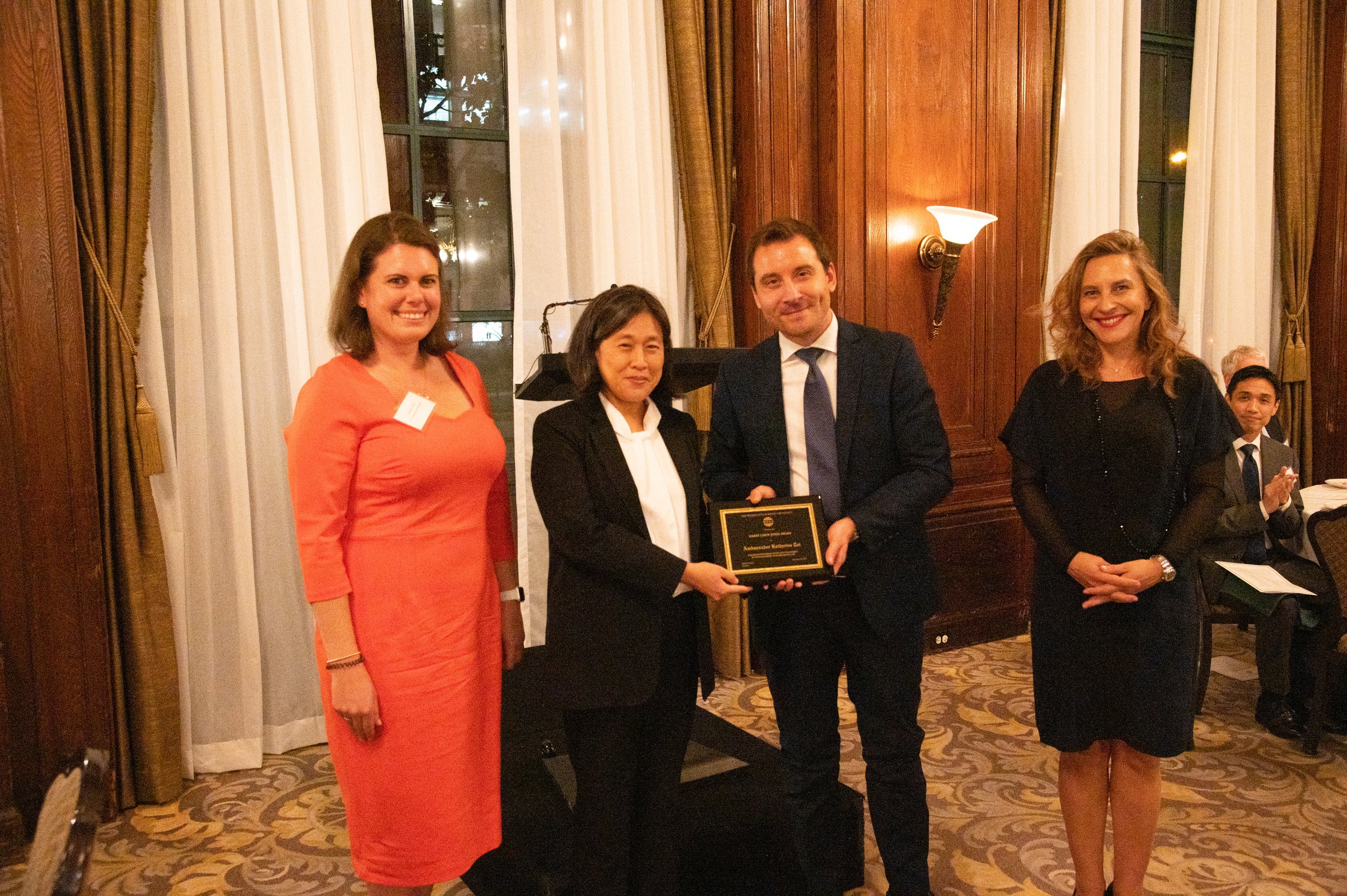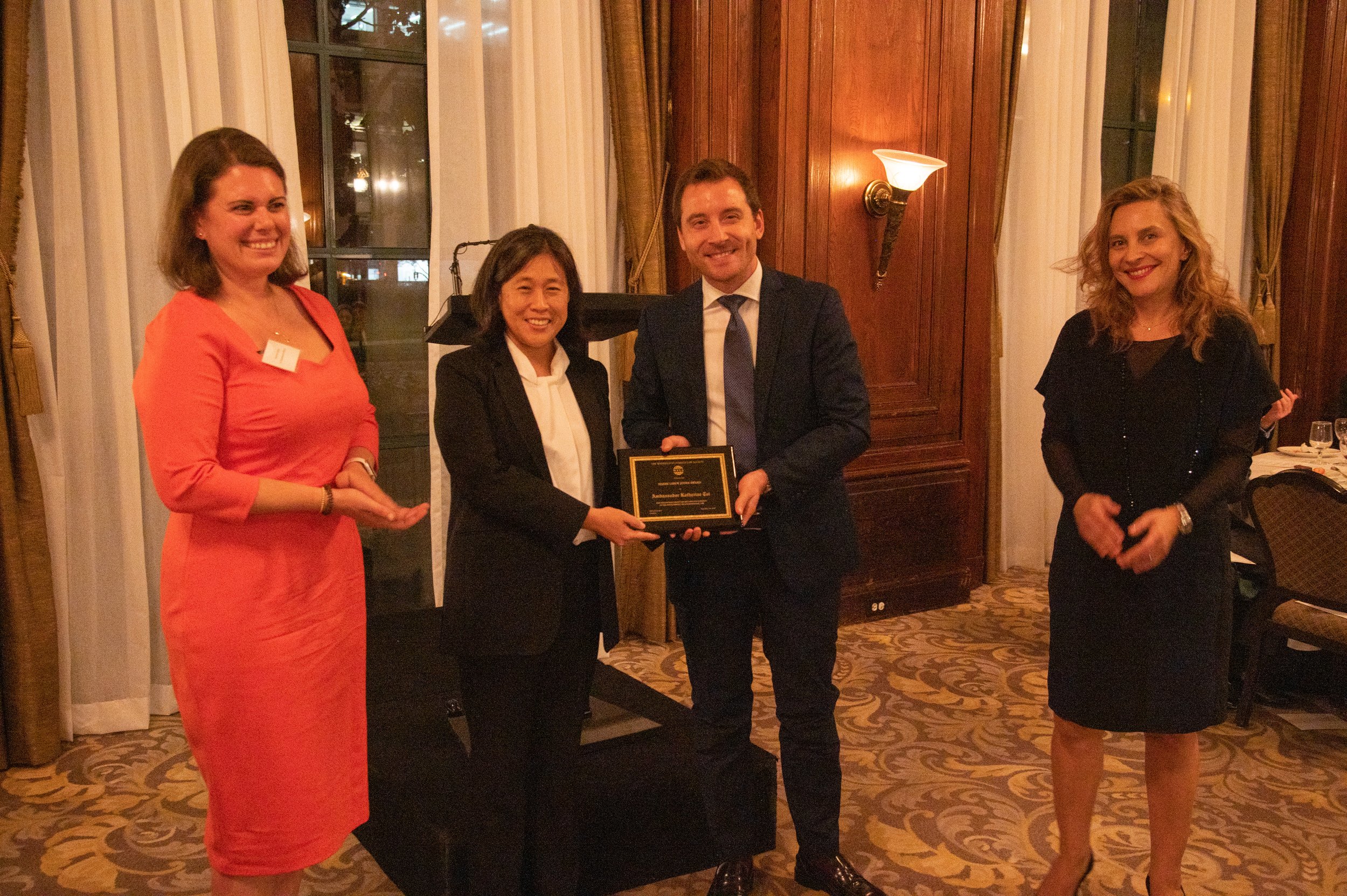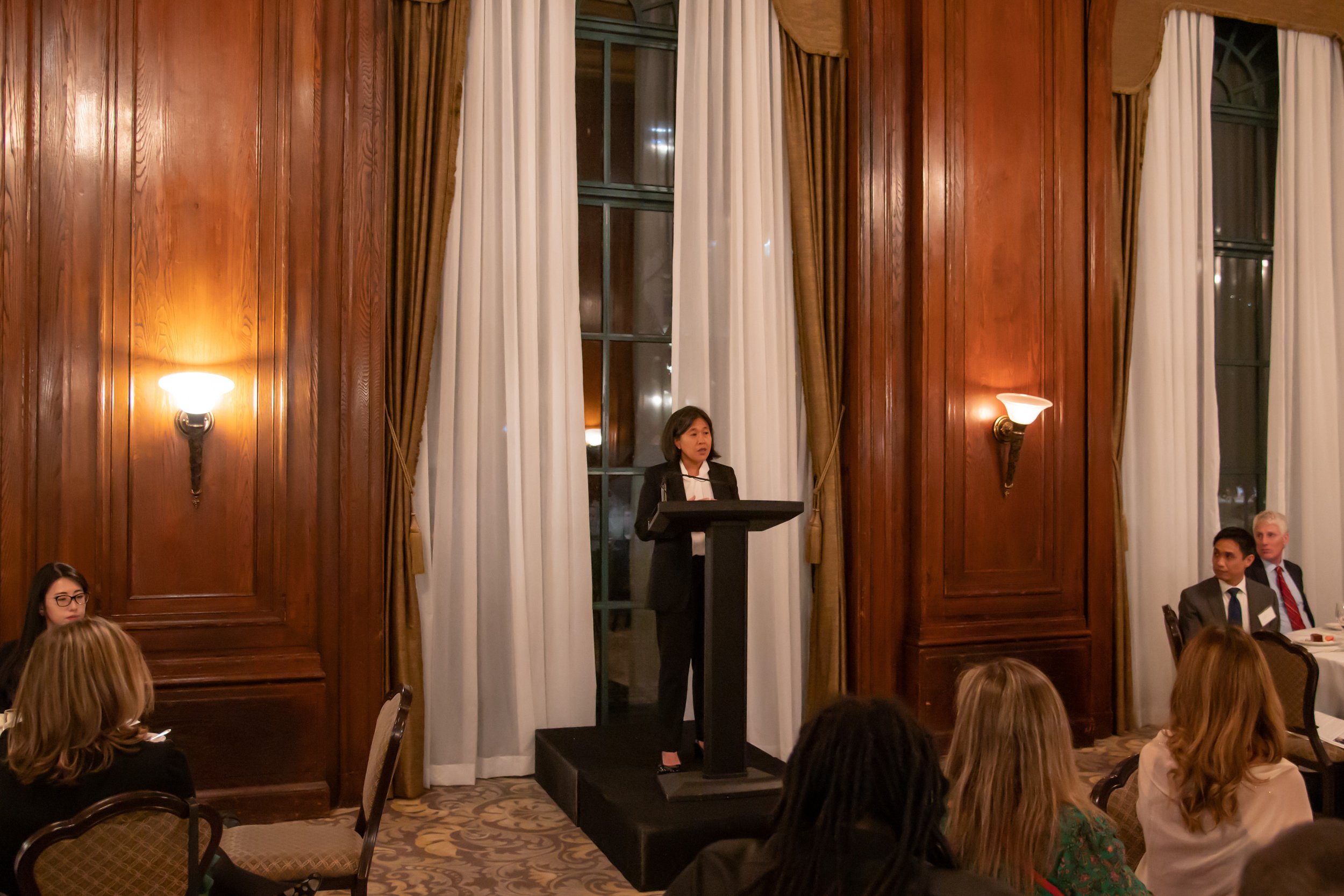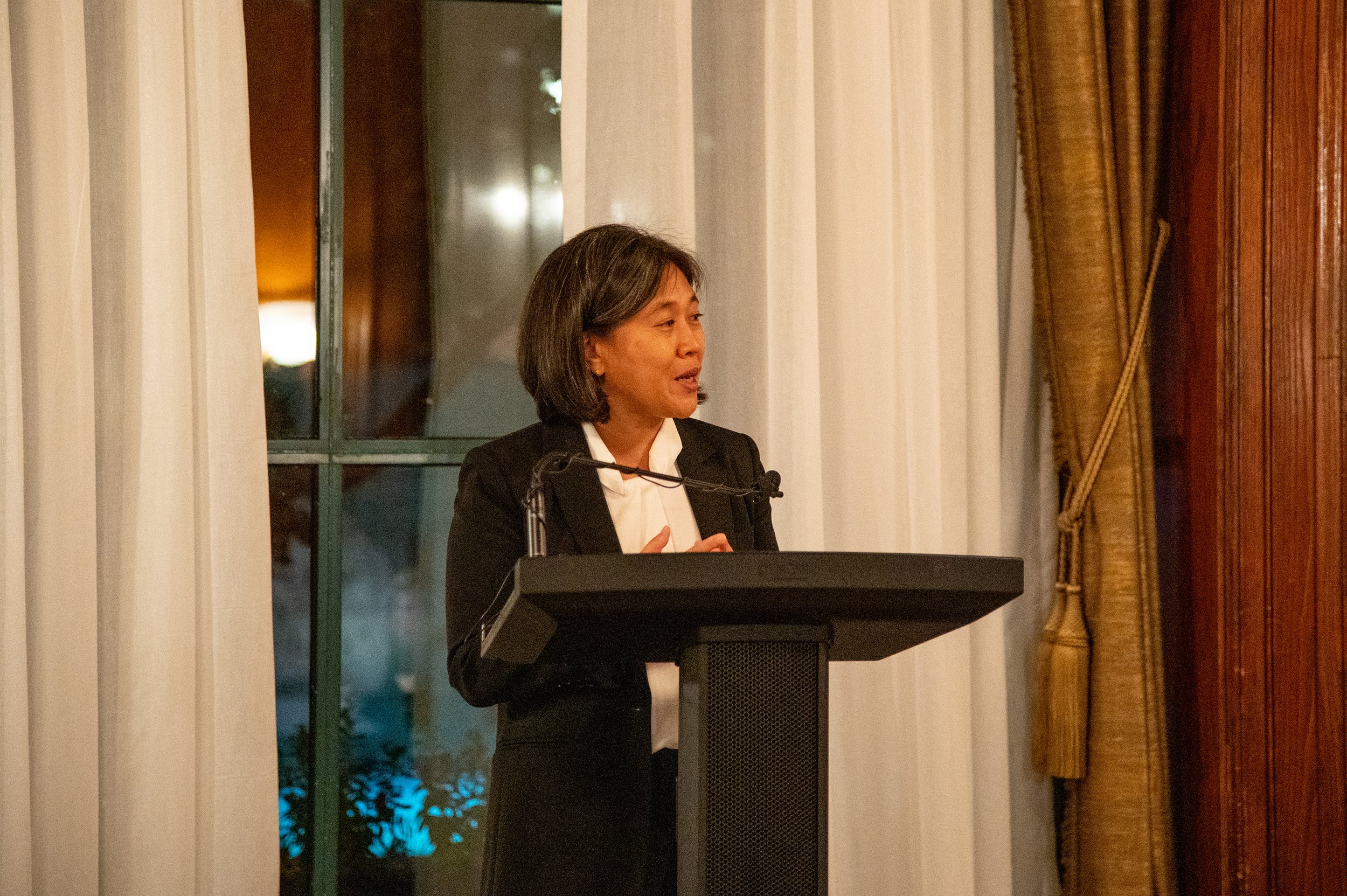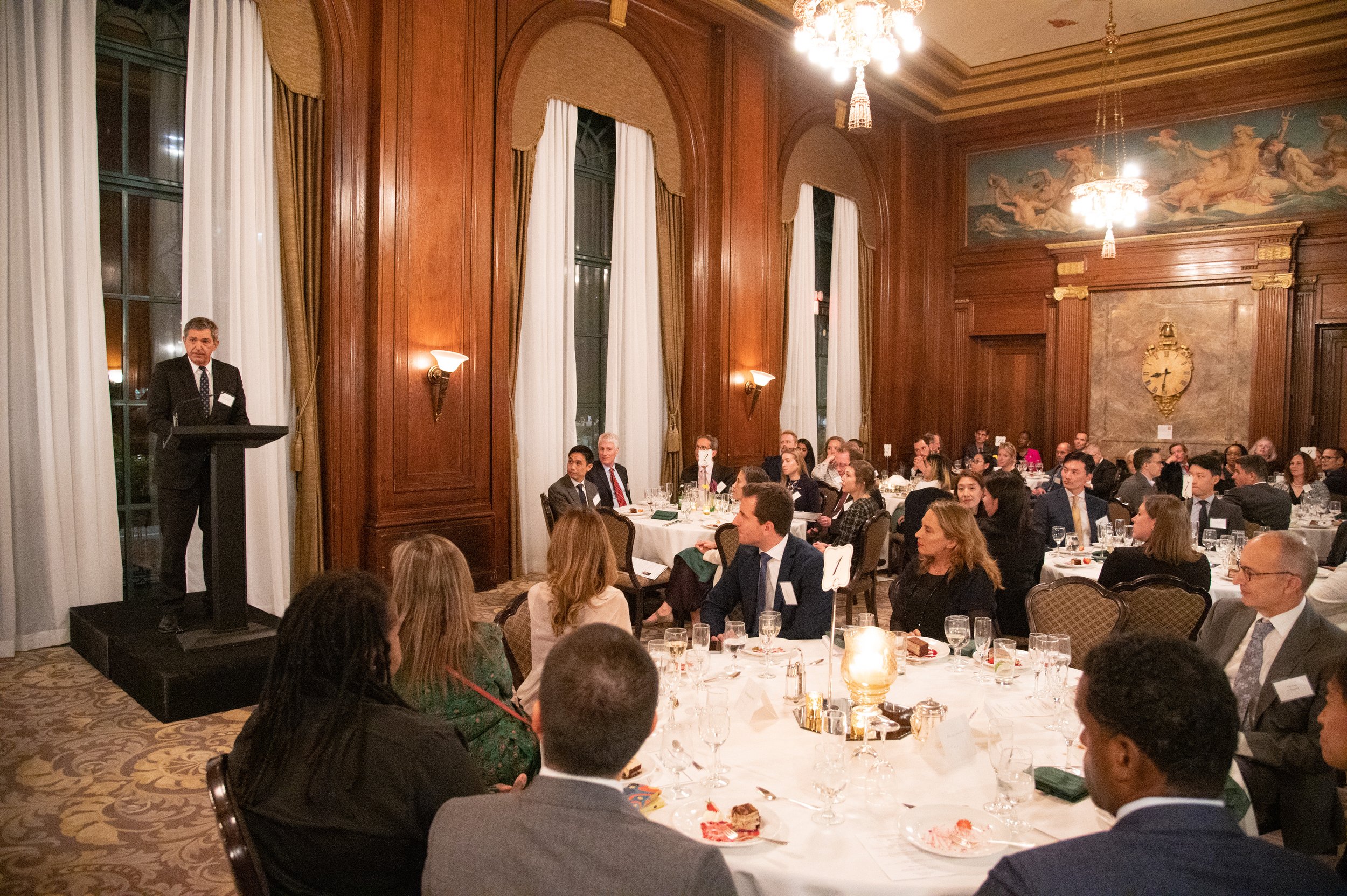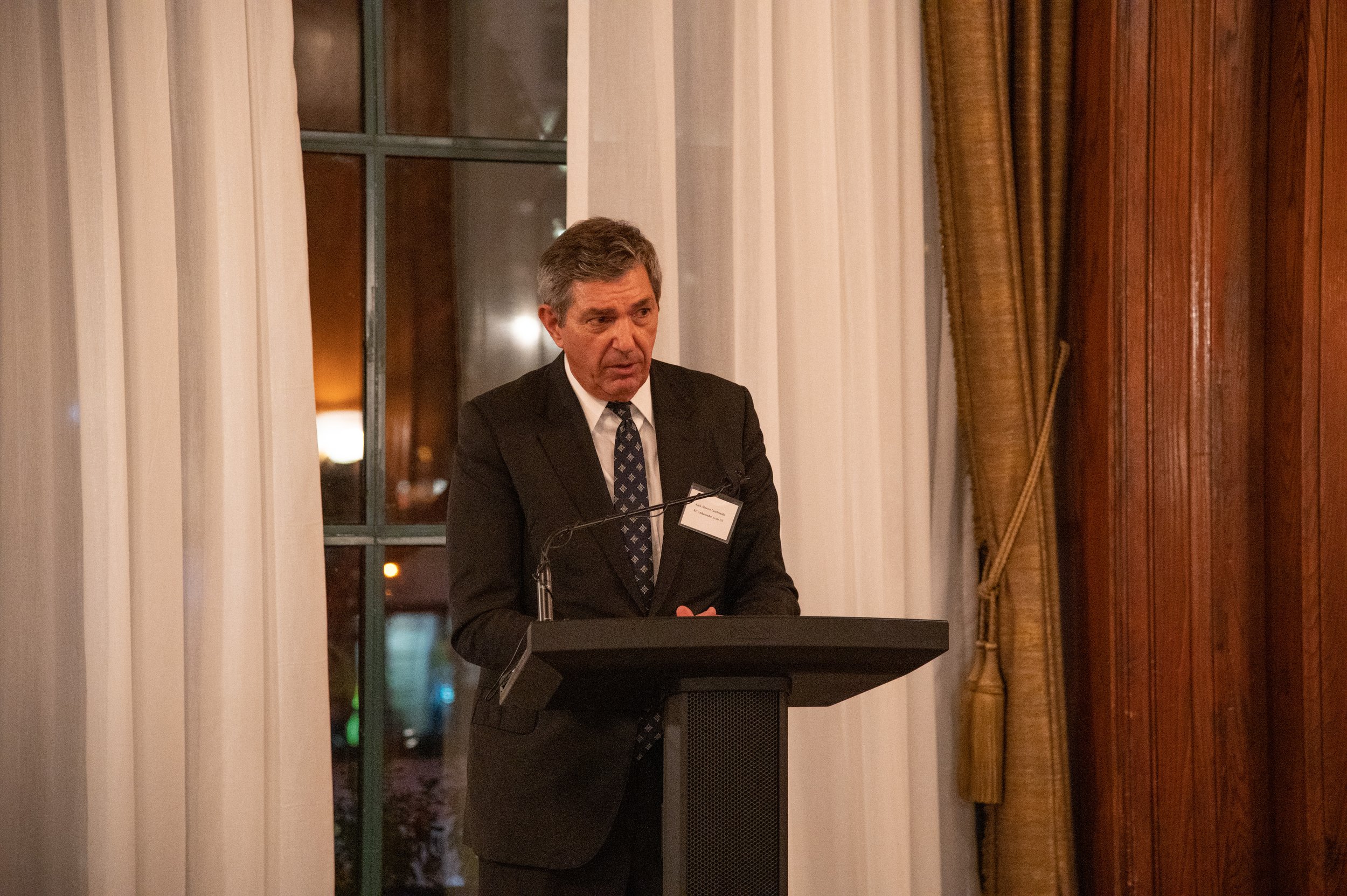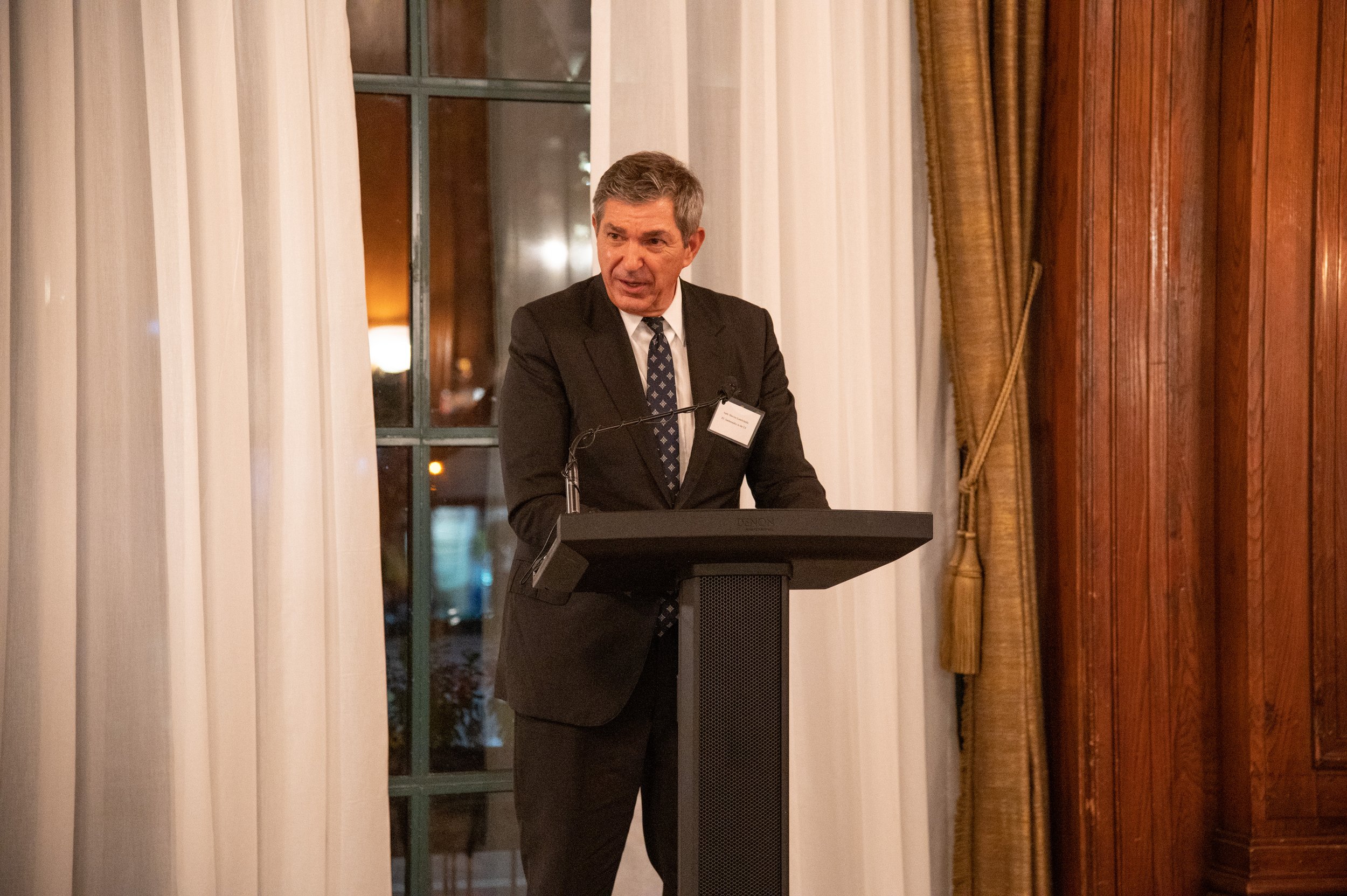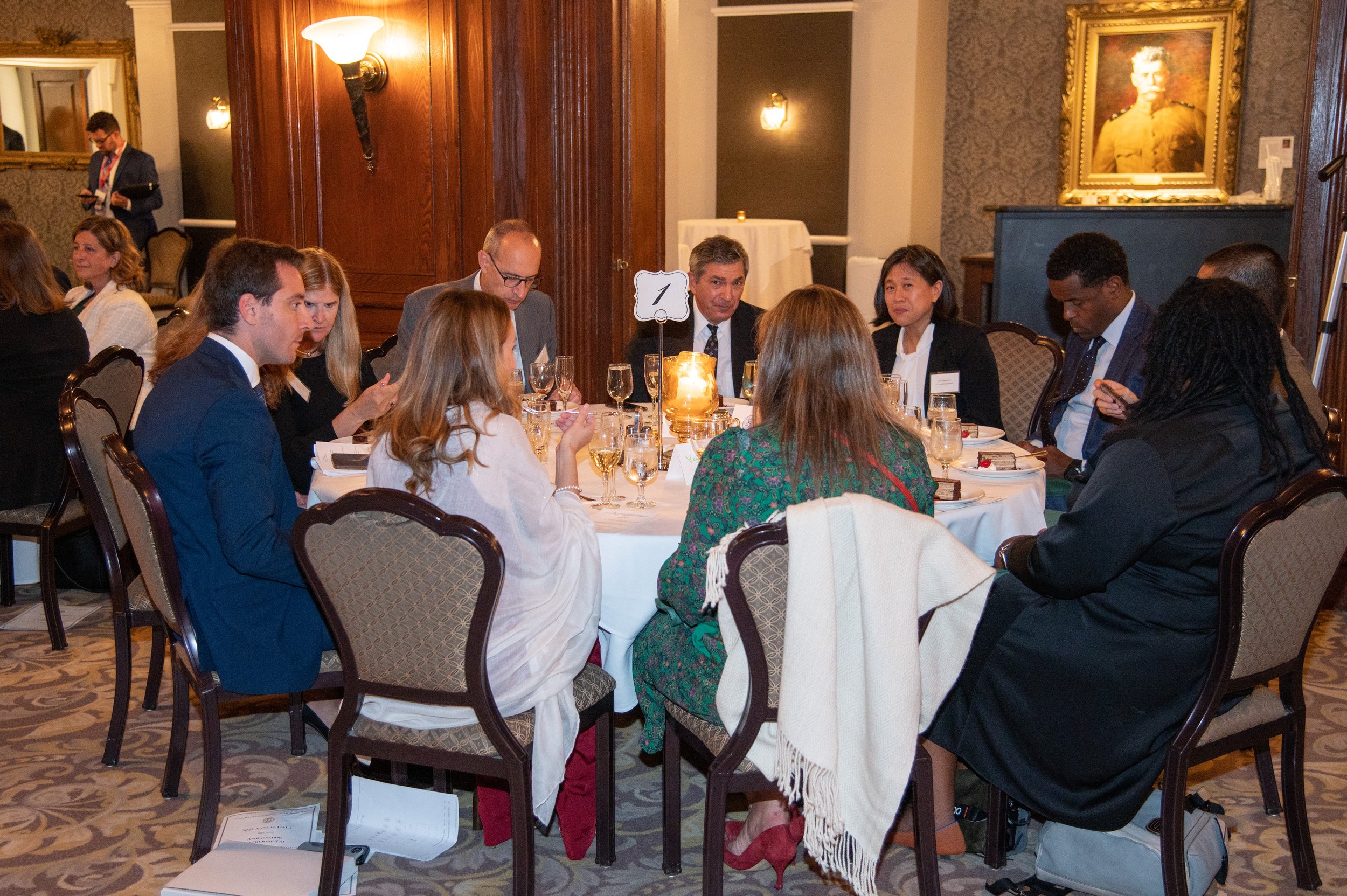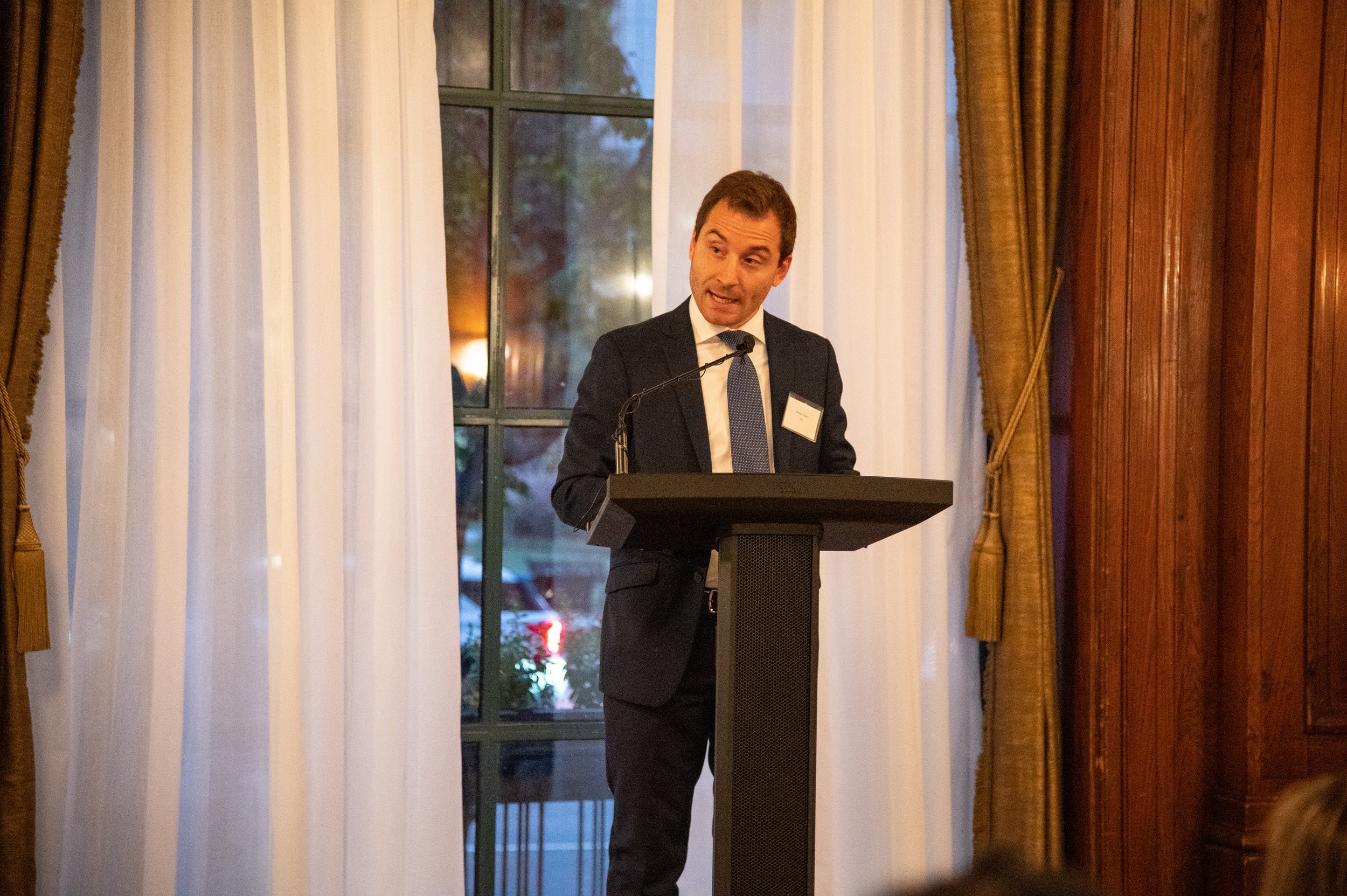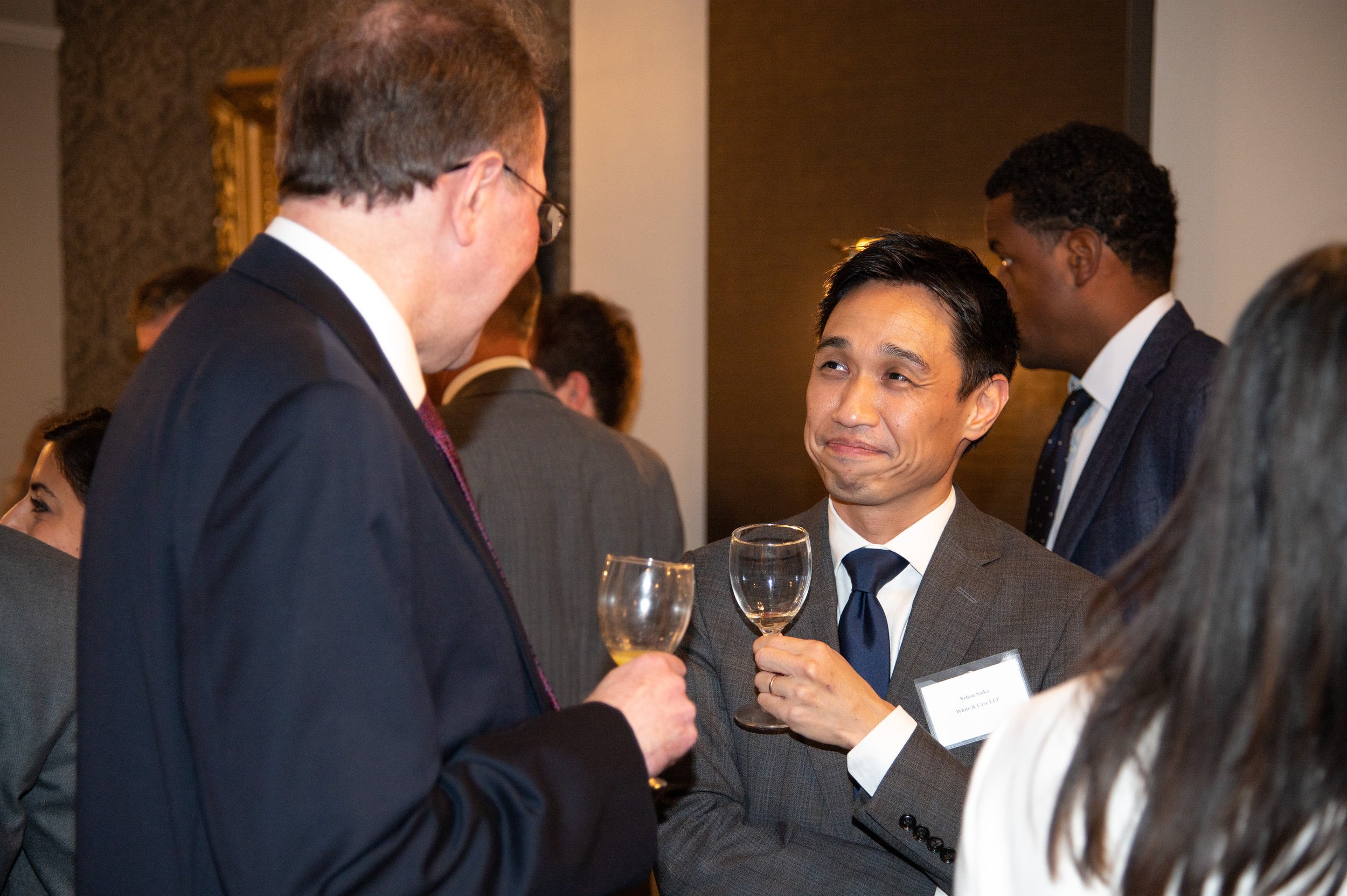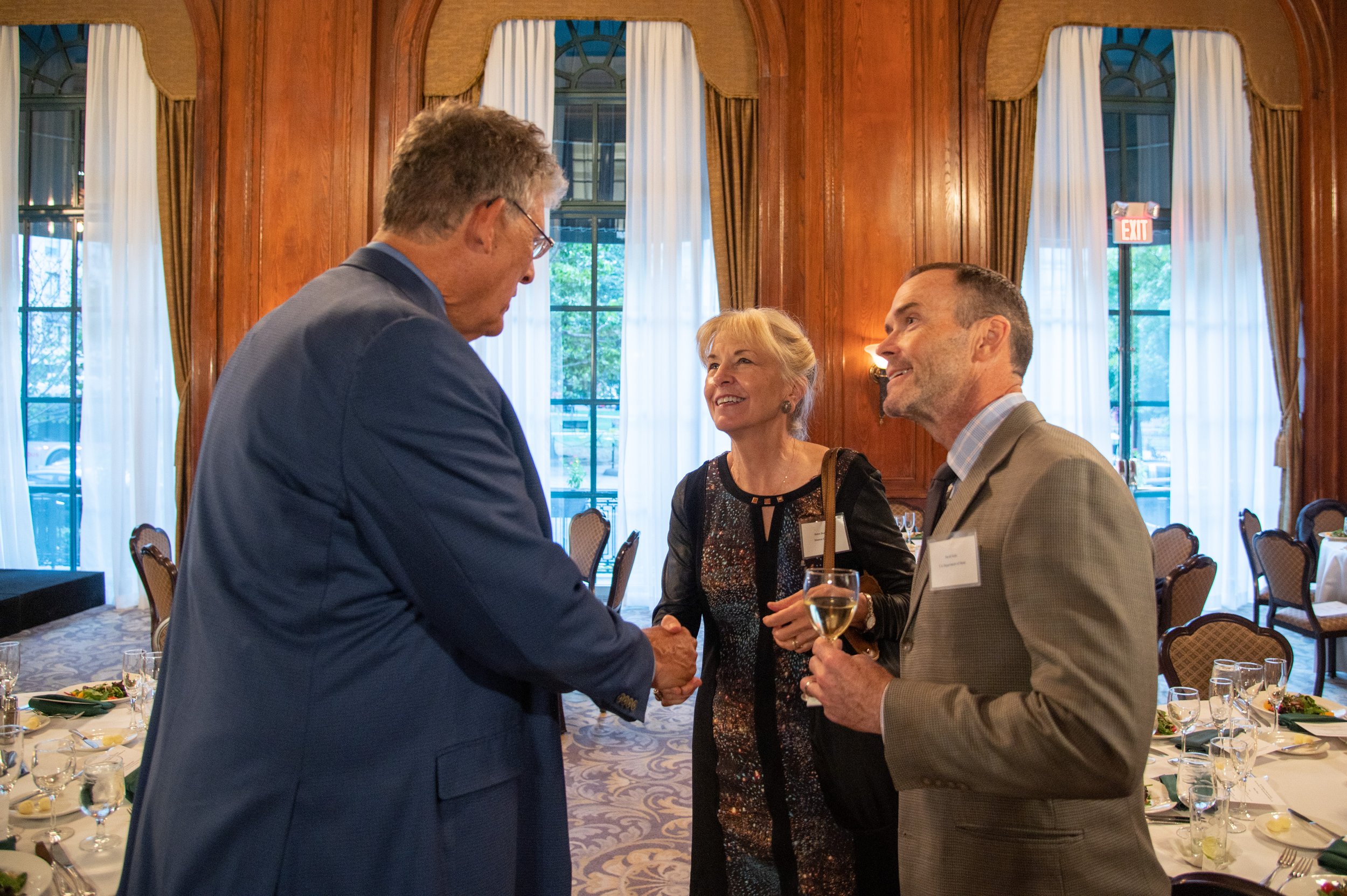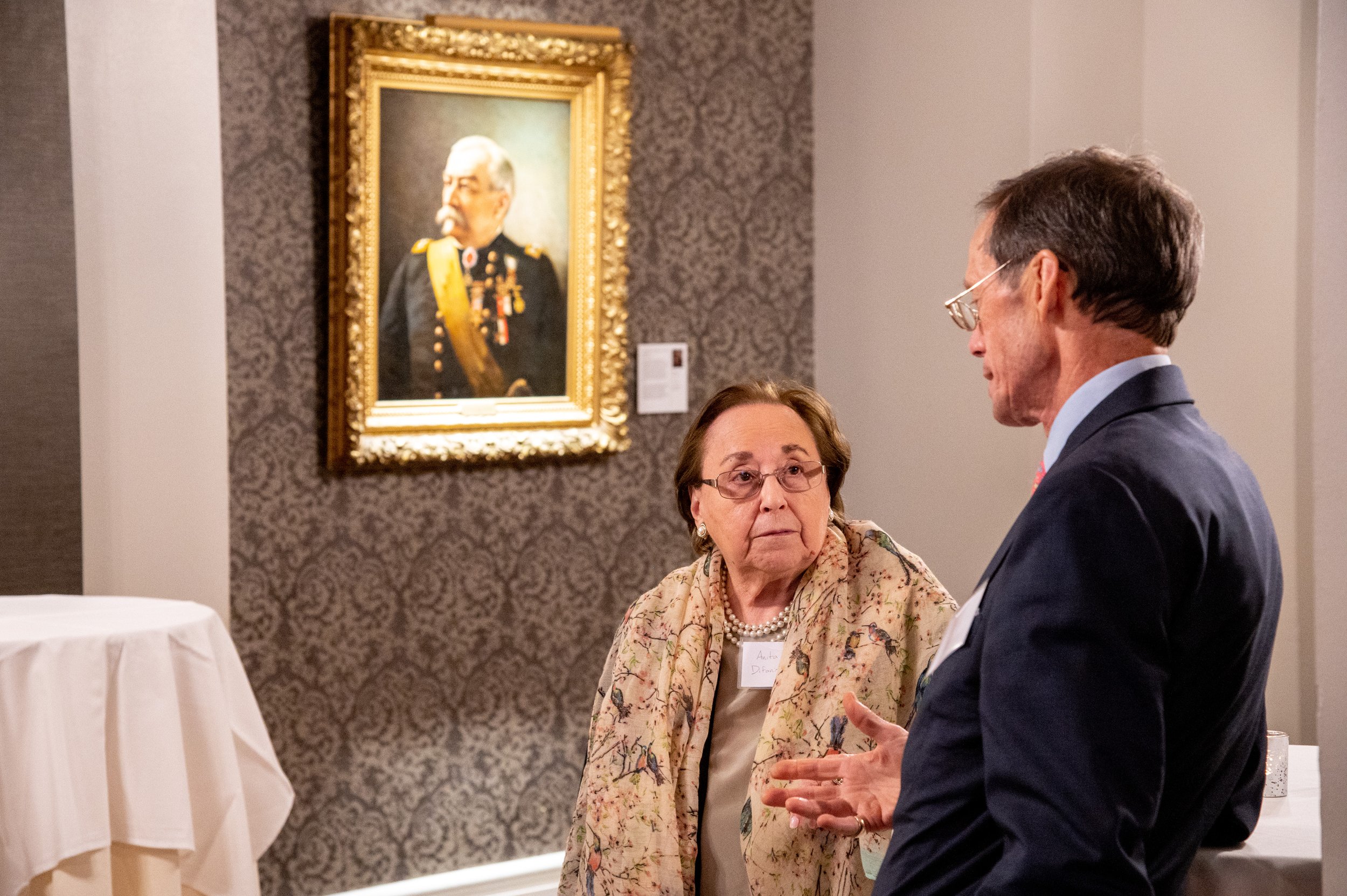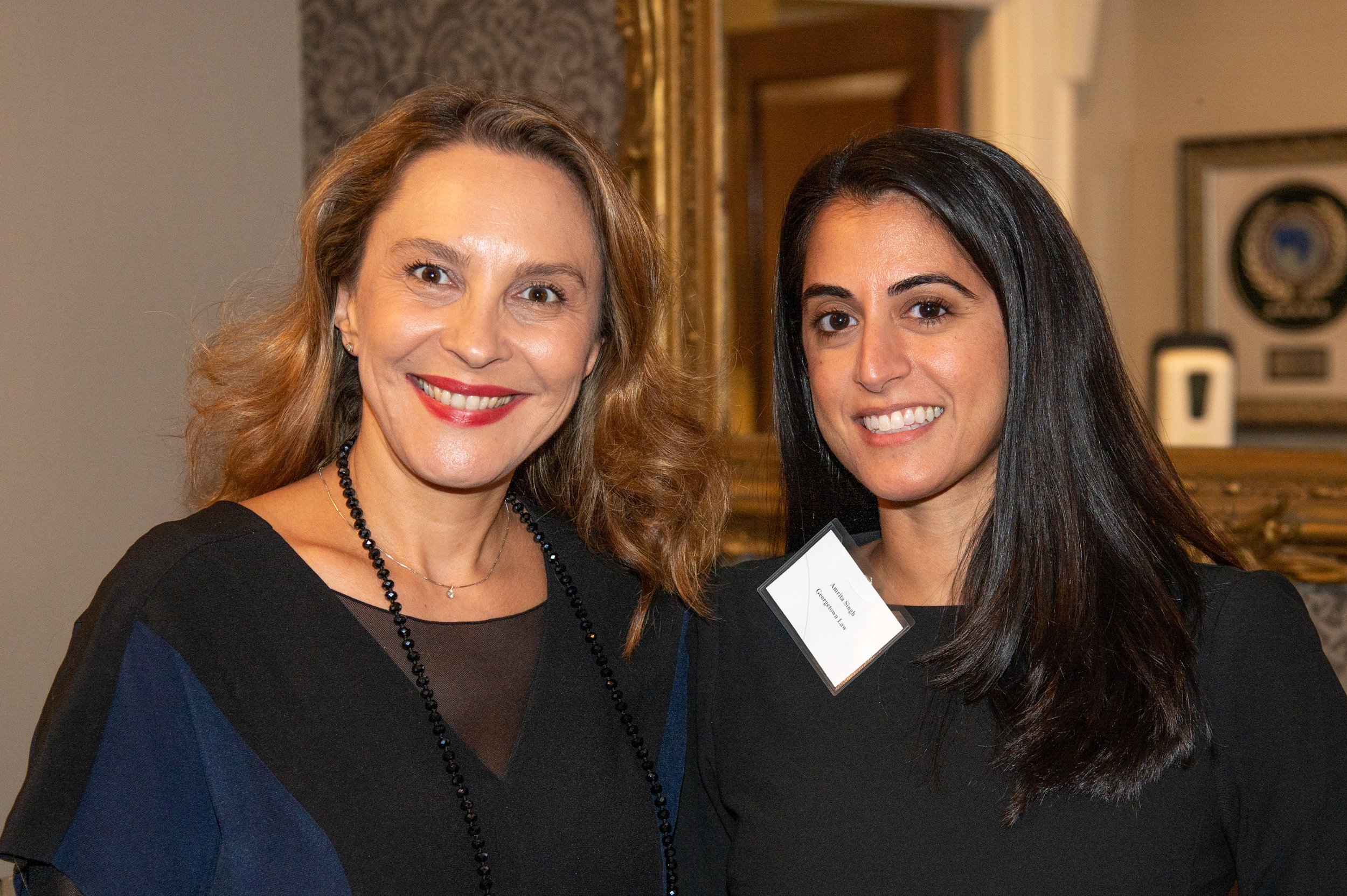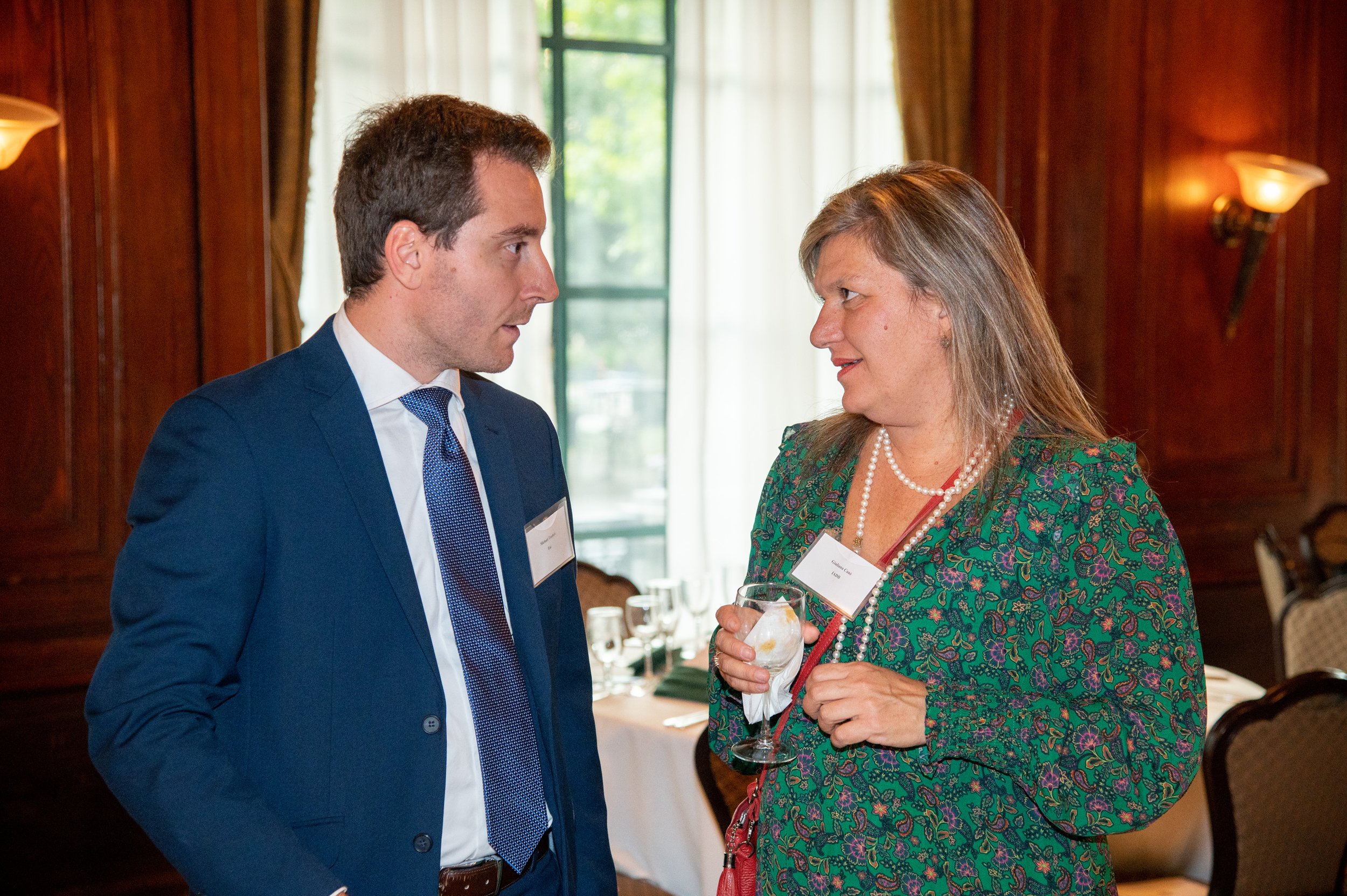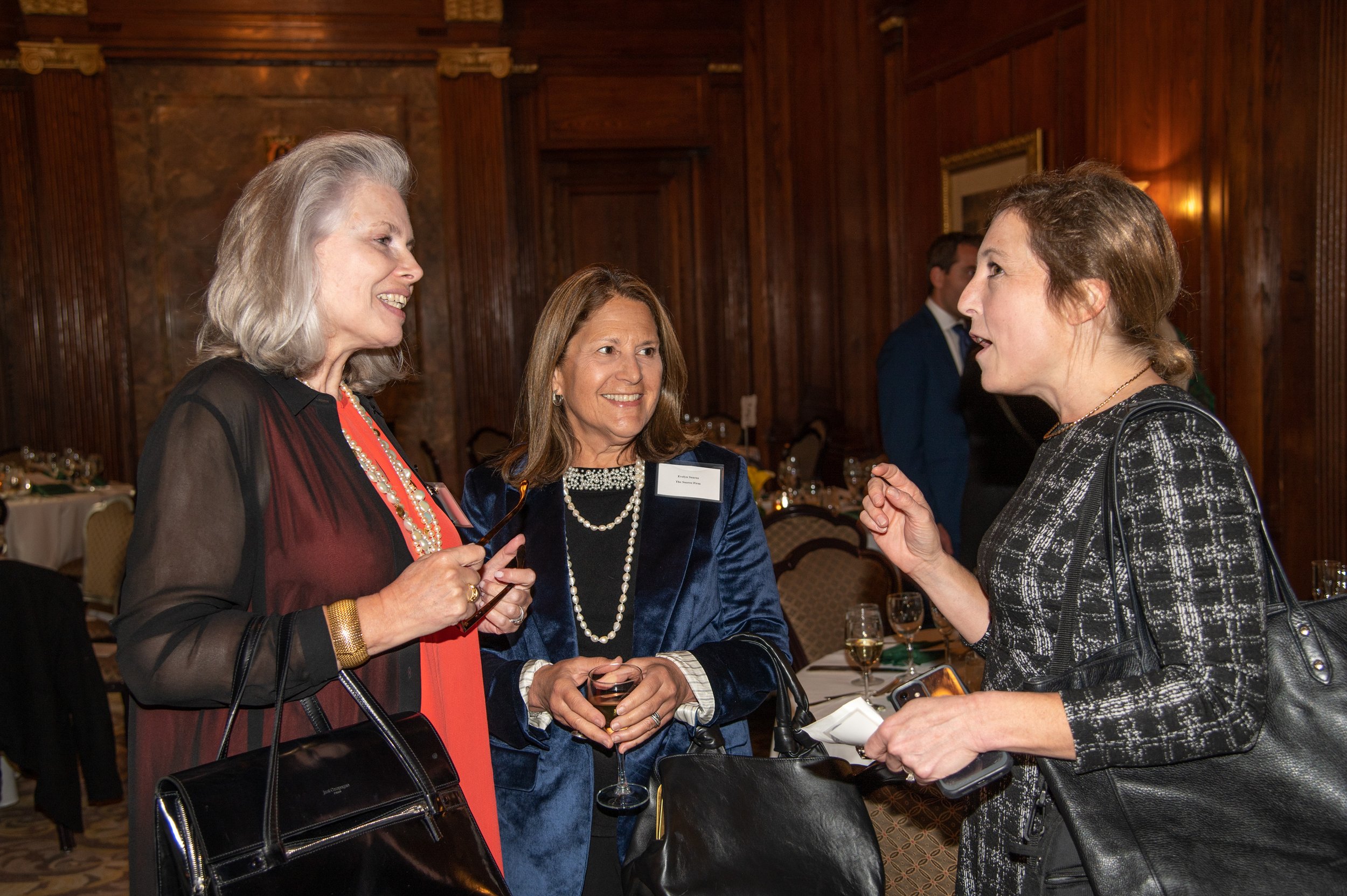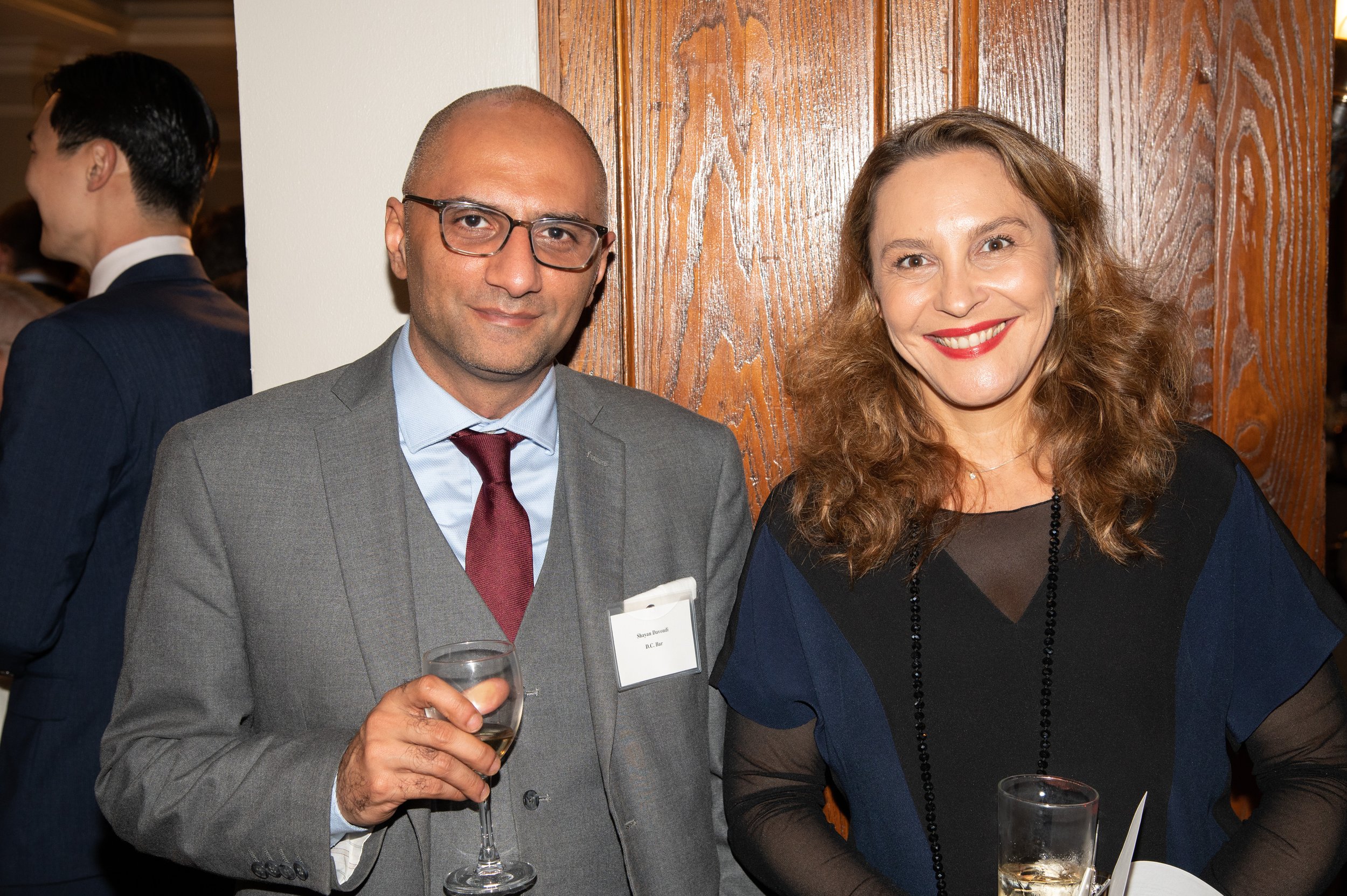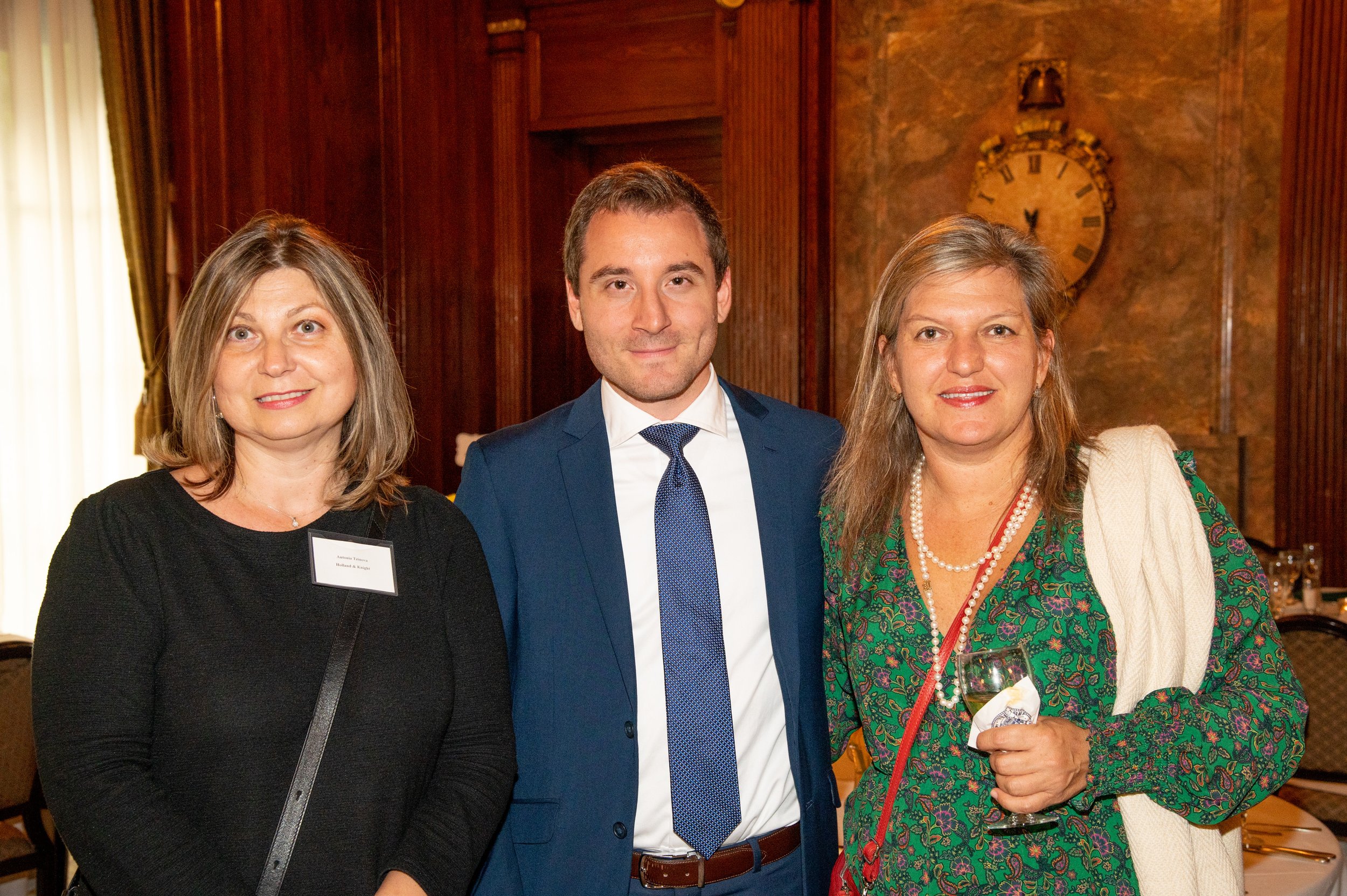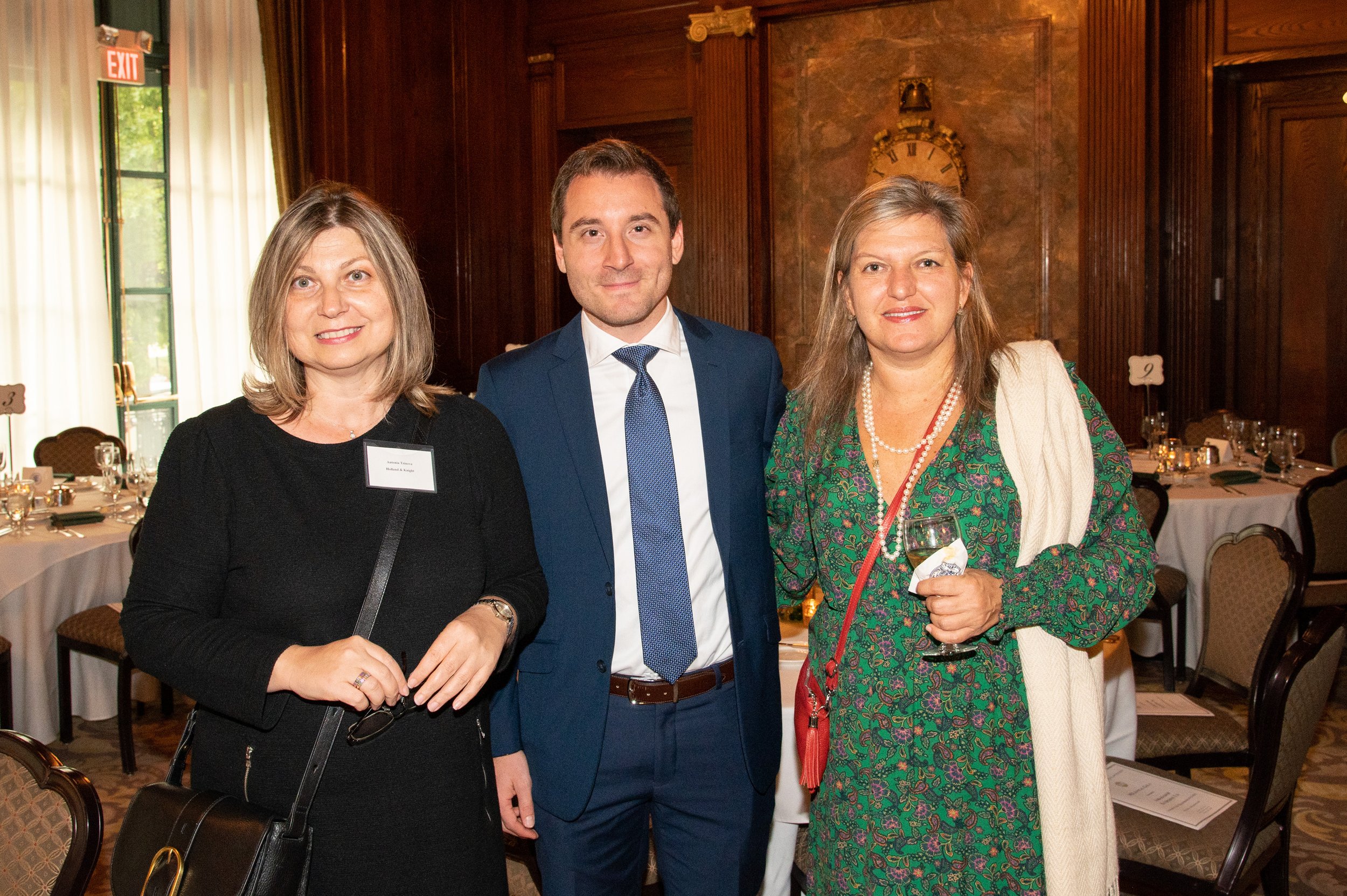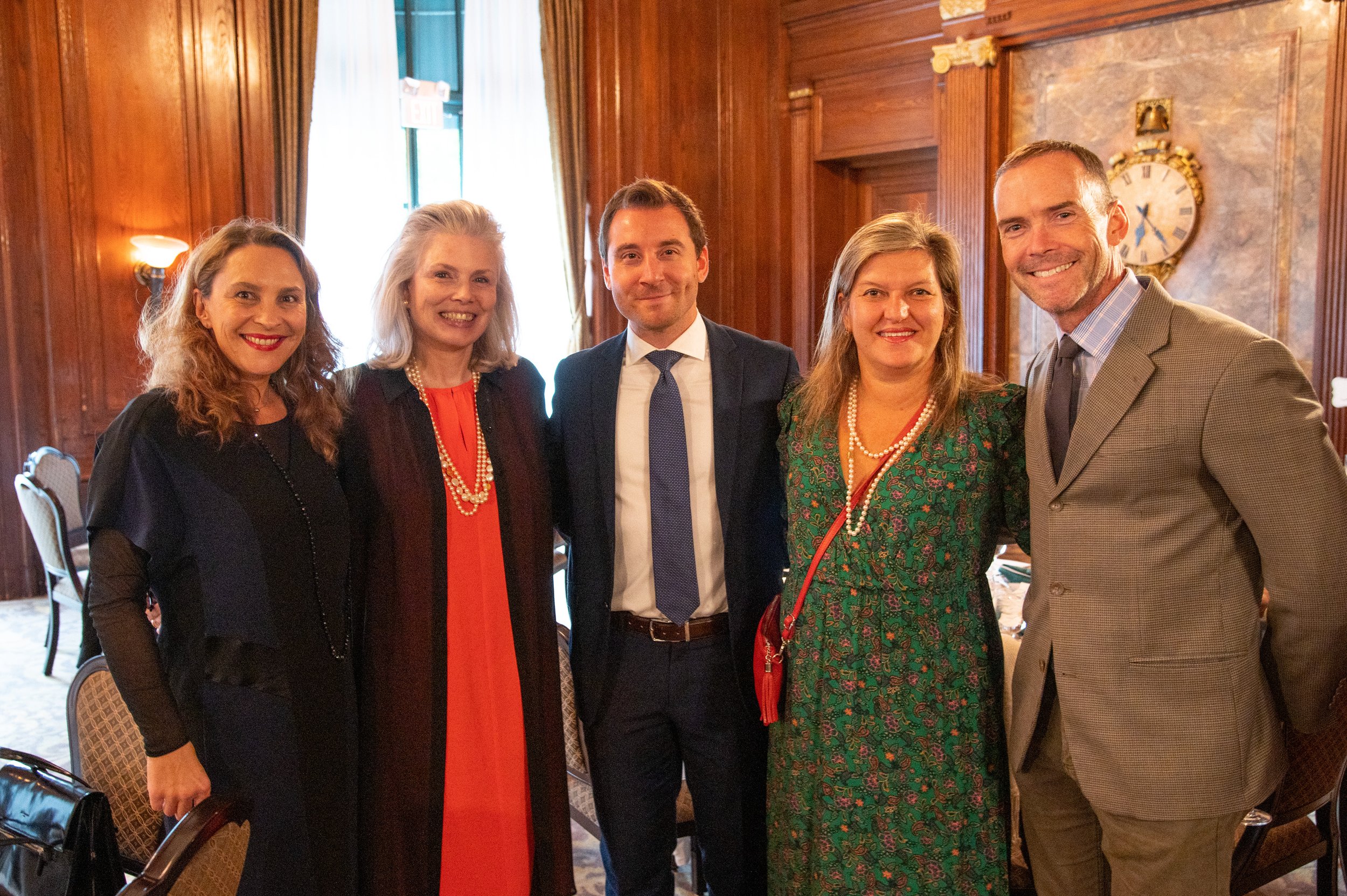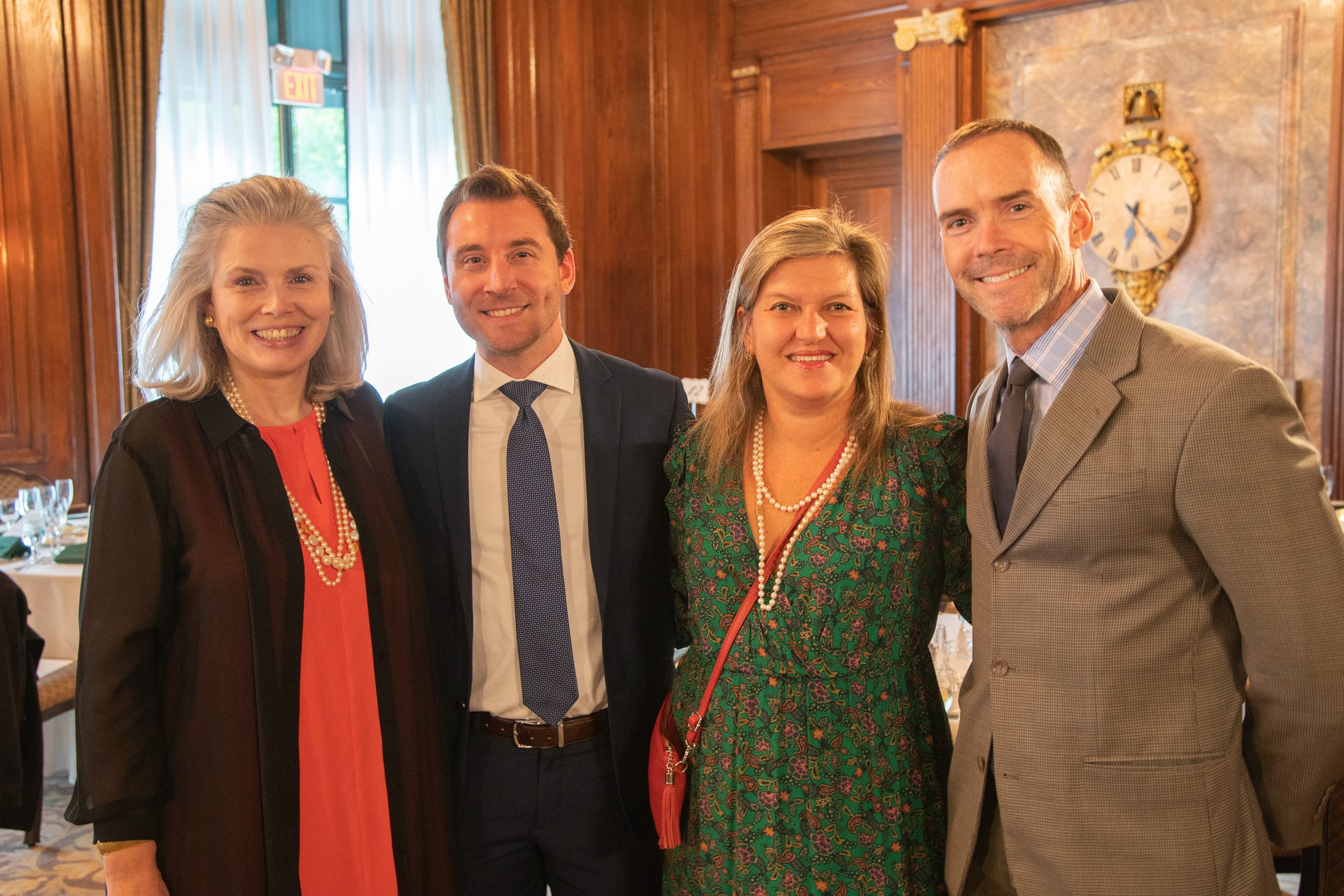Book Launch: “Default: The Landmark Court Battle over Argentina's $100 Billion Debt Restructuring”
Book Launch: “Default: The Landmark Court Battle over Argentina’s $100 Billion Debt Restructuring” by Gregory Makoff.
Tuesday, February 27, 2024
6:00-8:00 PM
Offices of Eni S.p.A., 601 13th Street NW, Washington, D.C. 20005, Suite 700
Refreshments will be provided. Books will not be for sale at the event, but are for sale on Amazon.
Register using the form below.
Please join the Washington Foreign Law Society (WFLS) for a reception to launch Gregory Makoff’s new book, “Default: The Landmark Court Battle over Argentina’s $100 Billion Debt Restructuring.” The book describes the fifteen year conflict over Argentina’s 2001 default that led to a decade of litigation in U.S.courts and remade the legal framework for sovereign debt financing. The turning point in this drama was the unprecedented injunction by a U.S. court barring U.S. banks from paying consenting creditors who agreed to a deep haircut until Argentina paid the holdout creditors in full.
Mark Feldman will join Mr. Makoff to discuss how the structure of the Foreign Sovereign Immunities Act compounded the problems.
Speaker/author: Gregory Makoff
Gregory Makoff is a Senior Fellow at the Mossavar-Rahmani Center for Business and Government at the Harvard Kennedy School. A physicist by training, he worked at Citigroup Global Markets, 1993-2014, as an advisor to companies, financial institutions, and countries regarding their debt. During 2015-2016 he worked at the U.S. Treasury on the Puerto Rico Oversight, Management, and Economic Stability Act. Since 2015 he has been writing about sovereign debt as a nonresident senior fellow at the Centre for International Governance Innovation, a think tank based in Waterloo, Ontario.
Interviewer: Mark B Feldman
Mark B. Feldman has been engaged in U.S. foreign relations law and transnational litigation since1965, at the U.S. Department of State, teaching at Georgetown Law and extensive private practice. As Deputy and Acting Legal Adviser (1974-81), he played a major role in drafting the Foreign Sovereign Immunities Act and the Iran Claims Agreement, and negotiated the UNESCO Convention on Cultural Property as well as U.S. maritime boundaries with Canada, Cuba and Mexico. In practice, Mark argued for the United States in the Gulf of Maine Maritime Boundary Case at the ICJ and established the treaty exception to the federal act of state doctrine in Kalamazoo Spice v Ethiopia. He recently published “Footnotes to History: Law and Diplomacy, 1965-2005” (Xlibris 2023).
2023 Holiday Happy Hour
The Washington Foreign Law Society
cordially invites you to our
2023 Holiday Happy Hour
Monday, December 11, 2023
Starting at 5:30 PM
In an annual tradition, toast the holiday season with friends and colleagues at the Washington Foreign Law Society! Join us at Elephant & Castle Pub (1201 Pennsylvania Avenue NW) on Monday, December 11th, starting at 5:30 PM.
WFLS Members will receive one free drink. A light reception will be available.
Register using the form below.
Sincerely,
The Washington Foreign Law Society
2023 Annual Meeting
You are cordially invited to the
Washington Foreign Law Society’s 2023 Annual Meeting
Wednesday, October 18th, 2023
6:00 PM – 8:00 PM
Offices of WilmerHale
2100 Pennsylvania Avenue NW, Washington, DC, 20037
Please join the Washington Foreign Law Society for our 2023 Annual Meeting, in which we will be renewing the WFLS's Board of Governors and Officers for next year.
Run of show:
6:00 PM – In-person guests will be welcomed at the offices of WilmerHale (2100 Pennsylvania Avenue NW).
6:30 PM – Beginning of official business of the Annual Meeting; election of the new Board of Governors and Officers of the Society. Virtual attendees must connect at this time.
6:45 PM – Closing of the official business of the Annual Meeting. Drinks and light reception to follow.
The event is free of charge, but please note that participation at the event will be limited to WFLS Members in good standing. You may renew your membership at this link; if you are unsure about your membership status, please reach out to washingtonforeignlawsociety@gmail.com.
Register for in-person participation below:
Should you wish to participate virtually, register via Zoom here:
https://us02web.zoom.us/webinar/register/WN_QJ_mQ-YBSuqQyfxvCfZ9tQ
(Note that virtual participation will be limited to the official business of the Meeting)
We look forward to seeing you!
Book launch: Footnotes to History, Law and Diplomacy, 1965-2005
Book launch: Footnotes to History, Law and Diplomacy, 1965-2005
October 3, 2023, 6:00 – 8:00 p.m.
Offices of Eni S.p.A. | 601 13th Street NW, Washington, D.C. 20005, Suite 700
Register using the form below
The Washington Foreign Law Society (WFLS) and the Association for Diplomatic Studies and Training (ADST) invite members and friends to a reception to launch Mark Feldman’s new book, Footnotes to History, Law and Diplomacy, 1965–2005 (Xlibris, June 2023), which is based on his ADST oral history documenting some of the most dramatic crises in U.S. foreign relations in those decades.
Drinks and light refreshments will be provided.
Susan Johnson, President of ADST, will introduce ADST’s flagship Foreign Affairs Oral History program and provide a brief overview of ADST’s work in collecting, preserving, and disseminating the experiences and insights of U.S. foreign affairs practitioners over nine decades. Mark Feldman will discuss the role of State Department attorneys supporting the U.S. Foreign Service, which will be celebrating its 100th anniversary in 2024 and 2025.
Mark Feldman’s Footnotes to History: Law and Diplomacy, 1965–2005 offers a candid discussion on the formation of U.S. foreign policy. The book also provides fresh insights from "Inside the Room," shedding light on significant events like Vietnam, Panama, the Iran Hostage Crisis, and two wars in Iraq. Additionally, it explores Mark’s work on the Foreign Sovereign Immunities Act, U.S. maritime boundaries, illicit trade in antiquities, and the Foreign Corrupt Practices Act. The book highlights his experience with Henry Kissinger, Richard Nixon, and Jimmy Carter, as well as his strange encounter with Klaus Barbie, the butcher of Lyon.
Mark is offering books to registrants at author’s cost—Hardback: $24.00; Softcover: $14.00. Books purchased in advance can be picked up at the event. No sales will be made on premises. To purchase one or more books, please use the order form below. Supply is limited.
Detailed agenda:
6:00 – Doors open
6:15 – Introduction by Susan Johnson (ADST)
6:30 – Discussion between Mark Feldman and Robin Matthewman
Mark B. Feldman has been engaged in U.S. foreign relations law and transnational litigation since 1965, including sixteen years at the U.S. Department of State, twenty years teaching at the Georgetown University Law Center, and extensive private practice. As Deputy and Acting Legal Adviser (1974–81), Professor Feldman played a major role in drafting the Foreign Sovereign Immunities Act and the Iran Claims Agreement. He negotiated the UNESCO Convention on Cultural Property as well as U.S. maritime boundaries with Canada, Cuba, and Mexico. His publications and Congressional testimony are described at www.markfeldmaninternationallaw.com.
Susan R. Johnson is a career member of the Senior Foreign Service. She retired in 2015 and has served as the President of ADST since 2016. During her thirty-five years in the Foreign Service, she served in a broad range of bilateral and multilateral assignments in and out of the State Department including in Bosnia as Deputy High Representative and Supervisor of Brcko District, in Baghdad as the Senior Advisor to the Iraqi Foreign Ministry, as Deputy Chief of Mission and Charge d’affaires in Romania and Mauritius, IESC Director for Central Asia based in Kazakhstan, as well as in Russia, Cuba, Pakistan, the United States Mission to the United Nations, and in the State Department, on the Hill, and with the National Endowment for Democracy.
Robin Matthewman began working as an oral historian for ADST in 2020, initially on detail from the State Department, and has interviewed foreign affairs specialists from all levels and specialties. She recently conducted interviews with most of the U.S. Ambassadors who served in Kabul between 2002 and 2021 as part of ADST's Afghanistan project. She retired from the U.S. Senior Foreign Service in 2022, after a thirty-five-year career. Her overseas tours included economic, commercial, and consular tours in Mexico, Costa Rica, Russia, Honduras, and Iraq. She served as Deputy Chief of Mission and Chargé d’Affaires in Montevideo and San Jose, Principal Officer in Guadalajara, and briefly as Chargé in Curacao.
Register for the event using the form below:
Purchase a copy of the book using the form below:
The UN Cybercrime Treaty: Is it a Crime?
The UN Cybercrime Treaty: Is it a Crime?
Tuesday, September 26, 11 am – Noon EDT (New York)
4 pm - 5:00 pm BST (London)
Register for the event using the following form:
https://us02web.zoom.us/webinar/register/WN_on7dlZc2RqC6ubRIIGNkRA
The sixth and what is meant to be final negotiating session for a UN cybercrime treaty ended in August amidst disagreement. The draft new treaty is facing criticism from human rights groups and many others as States head to the concluding session in January 2024 without consensus on fundamental issues such as the treaty’s scope and what constitutes cybercrime. In recent developments, several states reintroduced offences related to extremism and terrorism into the definition of cybercrime. We will assess the implications of these additions which could increase the power of autocratic states to infringe on freedom of expression, promote surveillance and require any signatory States to cooperate on enforcement.
Focus will also be placed on the challenges concerning the lack of safeguards for procedural powers and international cooperation. How this future treaty relates to other international law, such as the Budapest Convention on Cybercrime, is another concern which will be explored.
We invite you to join us in this online webinar with international experts discussing the new treaty's significance for human rights and cyber accountability at global, regional and national levels in an evolving digital governance landscape.
Panelists:
Dr. Nnenna Ifeanyi-Ajufo, Professor of Technology Law, University of Bradford School of Law; Technology and Human Rights Fellow, Harvard’s Carr Center for Human Rights; Vice-Chairperson of the African Union Cyber Security Experts Group (AUCSEG)
Joyce Hakmeh, Deputy Director, International Security Programme, Chatham House; Co-Editor, Journal of Cyber Policy
Moderator:
Allison Pytlak, Stimson Cyber Program Lead
Joyce Hakmeh is a policy expert in international security focusing on cyber policy. She is the Deputy Director of the International Security Programme at Chatham House and the Co-Editor of the Journal of Cyber Policy. In her role, Joyce oversees the research agenda of the programme and leads the work of Chatham House on cyber policy issues.
Nnenna Ifeanyi-Ajufo is a professor of law at the School of Law, University of Bradford. She is also a Technology and Human Rights Fellow at the Carr Centre for Human Rights Policy, Harvard University and serves as the Vice-Chairperson of the African Union Cyber Security Experts Group (AUCSEG) where she advises the African Union Commission (AUC) and African Member States on legal frameworks related to cybersecurity, as well as promoting cybersecurity in the region.
Allison Pytlak is the Program Lead of the Cyber Program at the Stimson Center. The Program is focused on researching and fostering dialogue about cyber accountability. Allison's past work in this area has examined inter-state cyber operations and international governance structures. In her prior role with the Women’s International League for Peace and Freedom (WILPF), Pytlak monitored and reported on the UN’s working group on state behavior in cyber space and played an important role as a liaison and advocate for civil society participation. She has researched, published, and provided trainings about the gendered and human rights-based dimensions of cyber security and diplomacy.
This program is supported by:
Resources about the AHC process and cybercrime
· UN Office on Drugs and Crime webpage for the AHC process - https://www.unodc.org/unodc/en/cybercrime/ad_hoc_committee/home
· Draft text of the Convention (as of 1 September 2023) -https://www.unodc.org/documents/Cybercrime/AdHocCommittee/6th_Session/DTC/DTC_rolling_text_01.09.2023_PM.pdf
· UNODC Learning Course on cybercrime - https://www.unodc.org/e4j/en/tertiary/cybercrime.html
Resources about regional and other relevant frameworks
· Africa’s cybersecurity treaty enters into force - https://directionsblog.eu/africas-cybersecurity-treaty-enters-into-force/
· Net Politics in Africa - https://directionsblog.eu/net-politics-in-africa/
· Cyber governance in Africa: at the crossroads of politics, sovereignty and cooperation - https://www.tandfonline.com/doi/full/10.1080/25741292.2023.2199960
· About the Budapest Convention - https://www.coe.int/en/web/cybercrime/the-budapest-convention
Perspectives and analysis
· What is the UN cybercrime treaty and why does it matter? - https://www.chathamhouse.org/2023/08/what-un-cybercrime-treaty-and-why-does-it-matter
· Global protection against cybercrime now within reach: Interview with H.E. Faouzia Mebarki, Chair of the AHC – https://www.chathamhouse.org/2023/06/global-protection-against-cybercrime-now-within-reach
· Key takeaways from the sixth UN session on cybercrime treaty negotiations - https://dig.watch/updates/key-takeaways-from-the-sixth-un-session-on-cybercrime-treaty-negotiations
· Closing Pandora's box: UN Cybercrime Treaty negotiations -https://globalinitiative.net/analysis/un-cybercrime-treaty-negotiations-august-2023/
Resources about human rights, gender, and cybercrime
· Proposed UN Cybercrime Treaty Threatens to be an Expansive Global Surveillance Pact - https://www.eff.org/deeplinks/2023/08/proposed-un-cybercrime-treaty-threatens-be-expansive-global-surveillance-pact
· What Does it Mean to Gender Mainstream the Proposed Cybercrime Convention? https://chathamhouse.soutron.net/Portal/Public/en-GB/RecordView/Index/191233
· Chatham House submission to the 6th session of the Ad Hoc Committee (AHC) on cybercrime: gender considerations on the convention draft text - https://www.unodc.org/documents/Cybercrime/AdHocCommittee/6th_Session/Submissions/Multi-stakeholders/Chatham_House.pdf
· Gender mainstreaming and the proposed cybercrime convention: Commentary on the consolidated draft - https://www.unodc.org/documents/Cybercrime/AdHocCommittee/4th_Session/Documents/Multi-stakeholders/Chatham_House_Submission_to_the_AHC4.pdf
See also an earlier webinar in our series: “Cyber Norms, Law and Accountability: Roads to Progress?” with Katitza Rodriguez of the Electronic Frontier Foundation, offering views on the AHC process from a human rights perspective (May 2022)
2023 Spring Happy Hour
Please join the WFLS for a Spring Happy Hour!
Come and join us to meet and mingle with D.C. attorneys, professionals, and law students who share your passion for international law.
WFLS Member receive one free drink. Appetizers will be provided.
If you’re not already a member, click here to join now
Details:
BLACKFINN DC AMERIPUB
1620 I St NW, Washington, DC 20006
Tuesday, June 6th, 2023
6:00-8:30 PM
Law and Diplomacy: Legal Advisors and the Lawyer-Diplomat
The Washington Foreign Law Society presents
Law and Diplomacy: Legal Advisors and the Lawyer-Diplomat
Tuesday, March 21, 5:30 pm- 6:30 pm
Diplomacy and law are interactive and interdependent. Both aim at the effective management of international relations, the peaceful resolution of international disputes, the avoidance of armed conflict. Diplomacy and law support mechanisms that promote economic growth and stability and the protection of human rights. The Research Handbook on Law and Diplomacy (Elgar 2022, Stewart & McGuinness eds,.) explored this topic through an examination of contemporary practice across a variety of settings, including within state legal advisory offices, international organizations, international courts and treaty bodies, and civil society.
Drawing from contributions to and central findings of the book, the panelists will examine the interdependency of law and diplomacy and the role of legal advisors, diplomats, and lawyer- diplomats in international law and governance. The panelists will address the role of law and legal advisors within a variety of diplomatic settings, and address questions including:
· What is the appropriate role of legal advisors within political and policy making settings? Does that role changes during times of crisis?
· Does international law create separate ethical duties for lawyers that are different from duties to their principals (states, IOs, other clients)?
· What roles does domestic law (constitutional, statutory) play in facilitating or constraining legal advisors?
Registration for the event entitles registrants to a 35% discount on the purchase of the book at the Elgar Elgar website.
Panelists:
Miguel de Serpa Soares, United Nations Under Secretary General for Legal Affairs
Mr. Serpa Soares has extensive experience of legal and international affairs, having represented his country in various bilateral and multilateral international forums, including the Sixth Committee of the United Nations General Assembly, the Committee of Public International Law Advisers of the Council of Europe and the International Criminal Court’s Assembly of State Parties.
Before taking up his current position, Mr. Serpa Soares was Director General of the Department of Legal Affairs of the Ministry of Foreign Affairs of Portugal from 2008. Earlier in his career, he acted as Legal Adviser to the Permanent Representation of Portugal to the European Union, Brussels (1999-2008) and as Chef-de-Cabinet of the Deputy Minister for Infrastructure and Territorial Administration. He is a member of the Permanent Court of Arbitration.
Mr. Serpa Soares has a degree in Law from the University of Lisbon and a degree in European Law from the College of Europe, Bruges, Belgium. He is a member of a number of entities in the field of International Law and has given lectures on topics of International Law in different Universities worldwide.
Mary De Rosa, Georgetown University Law Center
Mary B. DeRosa, Georgetown Law Center, served as Deputy Assistant and Deputy Counsel to the President, and as National Security Council Legal Adviser in the Obama Administration. After leaving the White House in the Summer of 2011, she served as Alternate Representative of the United States to the 66th Session of the UN General Assembly, an Ambassador-level position with the US Mission to the United Nations. Prior to joining the Obama Administration in 2009, Ms. DeRosa was Chief Counsel for National Security for the Senate Judiciary Committee, working for the Chairman, Senator Patrick Leahy. She has also been a Senior Fellow at the Center for Strategic and International Studies, served on the staff of the Clinton Administration National Security Council as Legal Adviser and Deputy Legal Adviser, and was Special Counsel to the General Counsel at the Department of Defense. Before joining the government, Ms. DeRosa was in private practice at Arnold & Porter. She served as a law clerk to the Honorable Richard Cardamone, United States Court of Appeals for the Second Circuit.
Ms. DeRosa currently serves as the Chair of the Advisory Committee to the ABA Standing Committee on Law and National Security. She has been a Member of the President’s Intelligence Advisory Board (PIAB), Chair of the Central Intelligence Agency’s (CIA) Legal Advisory Board, and a Member of the National Security Agency’s (NSA) Legal Advisory Board. She has received multiple awards and honors, including the Office of the Secretary of Defense Medal for Exceptional Public Service, the Joint Medal for Distinguished Civilian Service, from the Chairman of the Joint Chiefs of Staff, the National Intelligence Superior Service Medal from the Office of the Director of National Intelligence, the Agency Seal Medal from the CIA, the State Department Superior Honor Award, the Department of Defense Exceptional Civilian Service Award, and the Office of the Secretary of Defense Award for Excellence.
Edward Chukwuemeke Okeke, Lead Counsel, World Bank
Edward Chukwuemeke Okeke, an international law scholar and practitioner, has over three decades of experience in the United Nations, UNESCO and the World Bank where he is presently Lead Counsel, Global Knowledge and Research. He is a globally acclaimed expert on the privileges and immunities of international organizations. He is also an award-winning writer and has been published in Arbitration International amongst other law reviews and journals. He is the author of Jurisdictional Immunities of States and International Organizations (Oxford University Press 2018). Furthermore, he contributed two chapters in The Convention on the Privileges and Immunities of the United Nations and its Specialized Agencies: A Commentary, Edited by August Reinisch (Oxford University Press 2016). He serves on the editorial board of the International Organizations Law Review.
Moderator: Peggy McGuinness, St. John’s University School of Law
Margaret E. (Peggy) McGuinness, St. John’s University School of Law, teaches and in the areas of international law and international human rights law. Her current research examines U.S. diplomacy and its influence on international human rights governance. She is active in many professional organizations including the Council on International Affairs of the New York City Bar, the Executive Committee of the International Section of the New York State Bar Association, the American Society of the International Law, and the International Law Association and its American Branch. She is a graduate of Stanford Law School, following which she clerked for Judge Colleen McMahon in the Southern District of New York and worked as a litigator at Paul, Weiss, Rifkind, Wharton & Garrison LLP. Her career in the law follows an early career as a Foreign Service Officer with the State Department, which included service in Germany, Pakistan and Canada, and as a Special Assistant to Secretary of State Warren Christopher.
Introduction: David P. Stewart, Georgetown University Law Center
David P. Stewart, Georgetown University Law Center, teaches in the area of International and Transnational Law and co-directs the Global Law Scholars program and the Center for Transnational Business and the Law. He joined the faculty in 2008 following a career in the Office of the Legal Adviser, U.S. Department of State. He is past President and Chair of the Board of Directors of the American Branch of the International Law Association, and served as a Co-Reporter for the ALI’s Restatement (Fourth), Foreign Relations Law of the United States (2018). He is a member of the Board of Editors of the American Journal of International Law and the Secretary of State’s Advisory Committee on Private International Law.
Due Diligence in Cyberspace?
The Stimson Center and the Washington Foreign Law Society
present
Due Diligence in Cyberspace?
Tuesday, March 14, 1:30 pm EST
**Register and submit questions below**
Due diligence has become a hot topic among States. But what is that and what does it obligate a State to do, especially when it comes to malicious actors using many States’ territories to perpetrate a cyberattack? States agreed that they “should not knowingly allow their territory to be used for internationally wrongful acts using ICTs [information and communications technologies] in the UN Group of Governmental Experts’ 2015 final report, but progress has been slow in defining how diligent a State must be to act on this voluntary obligation.
Join the Stimson Center and WFLS in this webinar where former senior US Government executive the Hon. Christopher Ford talks with top experts to explore the controversy and how to move States forward on these issues.
Moderator:
Dr. Christopher Ford is a Visiting Fellow at Stanford University’s Hoover Institution. He previously served as a MITRE Fellow and founding Director of the Center for Strategic Competition (CSC) at the MITRE Corporation. In prior government service, Dr. Ford served as Assistant Secretary of State for International Security and Nonproliferation, also exercising the authorities of the Under Secretary for Arms Control and International Security, and before that as Special Assistant to the President and Senior Director for WMD and Counterproliferation at the U.S. National Security Council.
A veteran of many years as a congressional staffer, Dr. Ford has served at various points on the staffs of the U.S. Senate’s Foreign Relations Committee, Banking Committee, Appropriations Committee, Select Committee on Intelligence, Permanent Select Committee on Investigations, and Governmental Affairs Committee. He is the author of three books – China Looks at the West: Identity, Global Ambitions, and the Future of Sino-American Relations (2015), The Mind of Empire: China’s History and Modern Foreign Relations (2010), and The Admirals’ Advantage: U.S. Navy Operational Intelligence in World War II and the Cold War (2005) – and many articles and monographs. His personal website is https://newparadigmsforum.com.
Panelists:
Mariana Salazar Albornoz is a Professor of International Law, International Humanitarian Law and International Criminal Law at Universidad Iberoamericana in Mexico City. She recently concluded her 4-year mandate as a Member of the Inter-American Juridical Committee of the Organization of American States, where she served as Rapporteur on International Law Applicable to Cyberspace, promoting further transparency and understanding of the topic among the American States. Her last report of the Inter-American Juridical Committee. International Law Applicable to Cyberspace, published in October 2022, can be found here. She also served as Rapporteur on Privacy and Data Protection in the same Committee.
Ms. Salazar is currently a Member of the ICRC’s Global Advisory Board on the Protection of Civilians from Digital Threats during Conflicts, as well as of the Editorial Board of the International Review of the Red Cross. She has been recently appointed by the UN Secretary-General as Member of the Board of the UN Register of Damage Caused by the Construction of the Wall in the Occupied Palestinian Territory. She is an Academic Programs Associate for the Auschwitz Institute for the Prevention of Genocide and Mass Atrocities. Previously, she served for 13 years at the Ministry of Foreign Affairs of Mexico as, among others, Coordinator of International Law. Ms. Salazar holds a Law degree from Universidad Iberoamericana and a master’s degree in International Law from the Graduate Institute of International and Development Studies in Geneva. She is also a member of the International Law Association and of the Mexican Council on Foreign Relations.
Dr. Andraz Kastelic is Lead Cyber Stability Researcher of the Security and Technology Programme at the United Nations Institute for Disarmament Research (UNIDIR) in Geneva, Switzerland. Prior to joining UNIDIR, Andraz held various research positions in different international organizations and research institutions around the world. Andraz holds a PhD in International Law, MA in Diplomacy and speaks 3 languages, including English. He is the author of the UNIDIR publications Due diligence in cyberspace: Normative expectations of reciprocal protection of international legal rights and Non-Escalatory Attribution of International Cyber Incidents: Facts, International Law and Politics, as well as other works.
Host: Giuliana Canè
Giuliana Canè served as President of WFLS until 2021 and continues as a Member of the WFLS Board of Governors. An Italian national, has been appointed by the IDB Board of Executive Directors to serve as the Executive Secretary of the IDB Group Administrative Tribunal, starting on January 19, 2016. Ms. Canè joined the IDB from the World Bank where most recently she was Legal Counsel in the International Centre for Settlement of Investment Disputes (ICSID). Previously, she worked for in various departments of the World Bank Group, including the Investment Climate Advisory Service and the Legal Department (2010-2014 and 2004-2007). Prior to rejoining the World Bank, she worked at the Italian Prime Minister’s Office where she was in charge of the Investment Chapter of the G8 Italian Presidency (2008-2009). She began her legal career with the law firm Baker & McKenzie in Rome (2001 – 2002). Ms. Canè holds degrees from Georgetown University Law Center (LL.M. in International Legal Studies), the College of Europe in Bruges (Master in Law in European legal studies), and LUISS-Guido Carli University, Rome, Italy (Laurea in Giurisprudenza). She is admitted to practice law in the State of New York, the District of Columbia (inactive), the US Supreme Court, and in Italy (inactive). She serves Board Member of Georgetown Law Center European Law Alumni Advisory and served as President of the Washington Foreign Law Society in 2020 and 2021. Since August 2023 she serves as First Ambassador and Chapter leader of the Luiss Alumni Washington DC Chapter. She speaks English, French, Spanish, Italian, and some Portuguese.
Further resources:
A Due Diligence Standard of Attribution in Cyberspace – Tallinn Manual: https://cyberlaw.ccdcoe.org/wiki/Due_diligence
The Oxford Process - https://www.elac.ox.ac.uk/the-oxford-process/
Oxford Institute for Ethics, Law and Armed Conflict - finalreport-bsg-elac-cyberduediligenceininternationallawpdf.pdf
Report of the Inter-American Juridical Committee. Second Report: International Law Applicable to Cyberspace, 21 October 2022: CJI-doc_671-22_rev2_corr1_ENG.pdf (oas.org)
UNIDIR Reports: Due diligence in cyberspace: Normative expectations of reciprocal protection of international legal rights http://unidir.org/duediligence; Non-Escalatory Attribution of International Cyber Incidents: Facts, International Law and Politics http://unidir.org/attribution; International Cooperation to Mitigate Cyber Operations Against Critical Infrastructure https://www.unidir.org/criticalinfrastructure)
UN Reports and Official Statements
UN Group of Governmental Experts 2015 Report A/70/174: https://undocs.org/Home/Mobile?FinalSymbol=A%2F70%2F174&Language=E&DeviceType=Desktop&LangRequested=False
UN Group of Governmental Experts on Advancing Responsible State Behaviour in Cyberspace in the Context of International Security A/76/135, July 2021: https://documents-dds-ny.un.org/doc/UNDOC/GEN/N21/075/86/PDF/N2107586.pdf?OpenElement
States’ Voluntary Contributions on Due Diligence to Group of Governmental Experts Report, A/76/136, July 2021: https://front.un-arm.org/wp-content/uploads/2021/08/A-76-136-EN.pdf
Open-ended Working Group 2021 Final Report and Statements:
https://www.un.org/disarmament/open-ended-working-group/
Open-ended Working Group 2021-25: https://meetings.unoda.org/open-ended-working-group-on-information-and-communication-technologies-2021#:~:text=On%2031%20December%202020%2C%20the,substantive%20sessions%20in%20New%20York. [See documents and statement links at top of page]
Attribution:
A Guide to Cyber Attribution, US Office of the Director of National Intelligence: http://dl.icdst.org/pdfs/files3/db004a6f55f96c056a23fc4efc6a23ac.pdf
Various threat reports:
https://query.prod.cms.rt.microsoft.com/cms/api/am/binary/RWMFIi#page=47
https://www.trellix.com/en-us/advanced-research-center/threat-reports/feb-2023.html
https://blog.cyberproof.com/blog/which-countries-are-most-dangerous
https://www.verizon.com/business/resources/T250/reports/dbir/2022-data-breach-investigations-report-dbir.pdf[See MITRE attack flow project with Verizon]
See our related webinar on “Technical Aspects of Attribution”: https://www.stimson.org/event/the-technical-characteristics-of-attribution-how-do-you-know-who-did-it/.
This event is also supported by the DC Bar and the Luiss Alumni Association DC Chapter.
Challenge and Opportunities in Climate Finance Amid Turmoil in Global Energy Markets
The Alumni Luiss Association Chapter in Washington DC and the Washington Foreign Law Society cordially invite you to a panel discussion followed by drinks on
Thursday, February 23, 2023
Starting at 5:30 PM
Speakers:
- Sonja Gibbs, Managing Director and Head of Sustainable Finance, IIF
- Fabio Natalucci, Deputy Director at International Monetary Fund
- Marco Margheri, Eni Head of US Relations
Moderator: Giuliana Canè, First Ambassador and Chapter leader, Luiss Alumni Washington DC Chapter.
Q&A sessions kickstarted by the European Policy Organization, a student association at the McCourt School of Public Policy of Georgetown University.
Location: Eni S.p.A. | 601 13th Street NW, Washington, D.C. 20005, Suite 700
Does the Foreign Sovereign Immunities Act (FSIA) Bar Prosecution in U.S. Courts of Commercial Enterprises Owned by Foreign States?
The Washington Foreign Law Society
presents
Does the Foreign Sovereign Immunities Act (FSIA) Bar Prosecution in U.S. Courts of Commercial Enterprises Owned by Foreign States?
Tuesday, January 10, 2023
From 5:30 PM to 6:30 PM Eastern Time
On January 17, 2023, the Supreme Court will hear argument in Turkiye Halk Bankasi A.S. v United States on the issue: Do federal courts have subject-matter jurisdiction over criminal prosecutions against foreign sovereigns and their instrumentalities, in light of the FSIA? The prosecution for money laundering in violation of U.S. sanctions on Iran is a major issue for Turkey, and the case has serious implications for U.S. law enforcement and national security.
Halkbank argues that a sovereign state and its instrumentalities enjoy absolute immunity from criminal prosecution in the courts of a foreign state, and that the FSIA itself bars this prosecution. The same FSIA argument was made by an Egyptian bank resisting a grand jury subpoena in the Mueller investigation. So far, the courts have denied immunity to state-owned enterprises applying FSIA criteria without deciding whether the statute applies.
Our panel, including a drafter of the FSIA and three distinguished scholars on foreign state immunity, will discuss: (1) Does the FSIA apply at all to criminal prosecutions? (2) If it is relevant, do the statutory exceptions to immunity apply? (3) If the FSIA does not apply, what rules apply?
Moderator:
-- Mark. B. Feldman, former Acting Legal Adviser, U.S. Department of State
Featured Speakers:
-- Professor Chimène Keitner, Alfred and Hanna Fromm Chair in International and Comparative Law, University of California Hastings College of the Law
-- Professor David P. Stewart, C0-Director of Center for Transnational Business and the Law and the Global Law Scholars Program, Georgetown University Law Center
-- Professor Ingrid (Wuerth) Brunk, Associate Dean for Research, Helen Strong Curry Chair in International Law and Director, Cecil D. Branstetter Litigation & Dispute Resolution Program, Vanderbilt Law School
Michael Teodori, President of the Washington Foreign Law Society, will host the session.
Mark B. Feldman has practiced and taught foreign relations law for many years. As Deputy Legal Adviser at the State Department, he helped draft the Foreign Sovereign Immunities Act, the Iran Claims Agreement and the UNESCO Convention on Cultural Property. He also chaired the ABA committee responsible for the 1988 amendments to the FSIA, including the arbitration exception. His work in foreign relations is related in an oral history for the Association for Diplomatic Studies and Training. https://adst.org/OH%20TOCs/Feldman.Mark.pdf
Professor Chimène Keitner is Alfred and Hanna Fromm Chair in International and Comparative law at the University of California Hastings College of the Law in San Francisco. She previously served as the 27th Counselor on International Law in the U.S. Department of State. Professor Keitner has served on the Executive Council of the American Society of International Law and as Co-Chair of the ASIL International Law in Domestic Courts Interest Group. She is a member of the American Law Institute and an Adviser on the ALI’s Fourth Restatement of the Foreign Relations Law of the United States. Her recent published works include International Law Frameworks (5th ed. 2021) and Prosecuting Foreign States, 61 Va. J. Int'l L. 221 (2021).
David P. Stewart is Professor from Practice at Georgetown University Law Center, where he co-directs the Center for Transnational Business and the Law and the Global Law Scholars Program. He is a member of the Board of Editors of the American Journal of International Law and previously served as a Co-Reporter for the Restatement (Fourth), Foreign Relations Law of the United States. His recent publications include The Foreign Sovereign Immunities Act: A Guide for Judges (Fed. Jud. Cntr. 2d ed. 2019); Ristau’s International Judicial Assistance (2d ed. with Bowker, 2021); and Law and Diplomacy (with Margaret McGuiness, Elgar 2022).
Professor Ingrid (Wuerth) Brunk is Associate Dean for Research, Helen Strong Curry Chair in International Law, Director, Cecil D. Branstetter Litigation & Dispute Resolution Program, Vanderbilt Law School. Professor Wuerth has served on the board of editors of the American Journal of International Law and on the State Department’s Advisory Committee on Public International Law. She is a member of the American Law Institute and was named as a Reporter for the Restatement (Fourth) of the Foreign Relations Law of the United States. She has received numerous honors and fellowships, including the Morehead Scholarship at the University of North Carolina at Chapel Hill, a Fulbright Senior Scholar award, the German Chancellor's Fellowship and many teaching awards.
Michael Teodori is the President of the Washington Foreign Law Society since October 2021. He is a US Policy and Advocacy Specialist at Eni SpA, Italy’s largest energy company, where he focuses on energy policy and congressional affairs. Prior to joining Eni, Mr. Teodori was a Congressional Liaison Officer at the US politics and Congressional affairs office of the Italian Embassy in Washington DC, where he worked to advance relations between the Italy and the US. Mr. Teodori was also a Schuman trainee at the European Parliament, with experience at the European Parliament Liaison Office in Washington, DC as well as at the European Parliament Legal Service in Brussels. Mr. Teodori holds a law degree from the University of Pavia (Italy) and a joint M.A. in transatlantic affairs from the College of Europe (Bruges) and the Fletcher School of Law and Diplomacy at Tufts University (Medford, MA).
Further resources:
Brief of Mark B. Feldman, Esq., and Professor Chimène I. Keitner as Amici Curiae in support of Respondent: https://www.supremecourt.gov/DocketPDF/21/21-1450/250647/20221221152328041_21-1450%20bsac%20Feldman%20%20Keitner.pdf
The Technical Characteristics of Attribution: How Do You Know Who Did It?
The Washington Foreign Law Society
presents
The Technical Characteristics of Attribution: How Do You Know Who Did It?
Thursday, November 17, 2022
From 11:30 AM to 12:30 PM Eastern Time
– This webinar is jointly organized with the Stimson Center –
As more and more malicious cyber incidents occur, governments, C-suite executives and insurers increasingly want to know who should be held responsible for the event and the extent of any harms. The first step in that process, before you get to legal and political attribution, is a technical one – knowing that an incident has occurred and then identifying the actors responsible. Join the Stimson Center and WFLS in this webinar featuring Microsoft, MITRE and the CyberPeace Institute as they discuss this challenge with former senior US Government executive the Hon. Christopher Ford.
Moderator:
-- The Hon. Christopher A. Ford, Director, Center for Strategic Competition, MITRE Corporation
Featured Speakers:
-- John Hering, Senior Government Affairs Manager for the Digital Diplomacy team, Microsoft
-- Emma Raffray, Chief Research and Analysis Officer, CyberPeace Institute
-- Richard Harris, Principal Cybersecurity Policy and Privacy Engineer, MITRE Corporation
Michael Teodori, President of the Washington Foreign Law Society, will host the session.
Dr. Christopher Ford was named in May 2022 to be a MITRE Fellow and the first Director of MITRE’s Center for Strategic Competition. In this capacity, he runs MITRE’s effort to apply interdisciplinary, cross-functional, “systems”-informed analyses to challenges of strategic competition. Dr. Ford is one of only 12 MITRE Fellows in the corporation’s history, and the first with a primarily policy background. Dr. Ford served previously in government as U.S. Assistant Secretary of State for International Security and Nonproliferation, also fulfilling the responsibilities of the Under Secretary for Arms Control and International Security. Prior the State Department, he served as Special Assistant to the President and Senior Director for WMD and Counterproliferation at the National Security Council. A former intelligence officer in the U.S. Navy Reserve and senior staffer on five different U.S. Senate committees, Dr. Ford has also served as U.S. Special Representative for Nuclear Nonproliferation and as a Principal Deputy Assistant Secretary of State. A graduate of Harvard College (summa cum laude), Oxford University (as a Rhodes Scholar), and the Yale Law School, Dr. Ford is a Visiting Fellow at Stanford University’s Hoover Institution, as well as a Distinguished Fellow at the National Security Institute at George Mason University’s Scalia Law School. A prolific scholar, he is the author of the books China Looks at the West: Identity, Global Ambitions, and the Future of Sino-American Relations (2015), The Mind of Empire: China’s History and Modern Foreign Relations(2010), and The Admirals’ Advantage: U.S. Navy Operational Intelligence in World War II and the Cold War (2005), as well as a great many articles and monographs. (His personal website is https://newparadigmsforum.com.) Dr. Ford is a member of the Council on Foreign Relations, the International Institute for Strategic Studies, the Royal Institute of International Affairs, and the American Society of International Law.
Emma Raffray leads the CyberPeace Institute’s analytical activities including the delivery of data-driven platforms, strategic analysis reports and cyber investigations. She has spent over 10 years working as an intelligence analyst across multiple sectors including national and international law enforcement (Metropolitan Police Service, London, UK and INTERPOL), financial sector, defense and the humanitarian sector. A recognized expert providing operational and strategic analysis for intelligence units, investigations and projects. Ms. Raffray holds a BSc in Criminology and Social Policy, Loughborough University. The CyberPeace Institute is an independent and neutral non-governmental organization (NGO) whose mission is to ensure the rights of people to security, dignity and equity in cyberspace. The Institute works in close collaboration with relevant partners to reduce the harms from cyberattacks on people’s lives worldwide. By analyzing cyberattacks, the Institute exposes their societal impact, how international laws and norms are being violated, and advances responsible behavior to enforce cyberpeace. Since the beginning of the year, the CyberPeace Institute has been documenting ‘Cyberattacks in Times of Conflict Platform #Ukraine’ and the hidden impact of these attacks on society. In 2021, the Institute published Cyber Incident Tracer (CIT) #Health, a platform that bridges the information gap about cyberattacks on the healthcare sector and their impact on people. Data on the platform is updated on a quarterly basis.
John Hering is a Senior Government Affairs Manager for the Digital Diplomacy team at Microsoft. He analyzes the global cybersecurity landscape, drives engagement with regional government teams and contributes to Microsoft’s efforts to promote peace and security in cyberspace through various multi-stakeholder initiatives. He leverages prior experiences working in and across the U.S. Government to support Microsoft teams as well as policymakers to improve cybersecurity strategies and policies. Prior to joining Microsoft, Mr. Hering served as a White House Defense Fellow in the Obama administration at the Department of Defense, in the Office of the Secretary of Defense for Policy. He has also previously led humanitarian aid research in northeast Nigeria with the Danish Refugee Council and worked as a math and science teacher through Teach For America. Mr. Hering holds a bachelor’s degree in Political Science from Boston College and a Master of Arts in Law and Diplomacy from The Fletcher School of Law and Diplomacy.
Richard “Rick” Harris is Principal Cybersecurity Policy and Privacy Engineer at the MITRE Corporation. Mr. Harris has spent over three decades in the security field working at the tactical, operational, strategic, and national policy levels. For the last 18 years, Mr. Harris has been focused on building U.S. and international cybersecurity capacity and developing foundational national cyber policies. After 26 years in the US Marine Corps, retiring as a Colonel, Mr. Harris joined the Department of Homeland Security (DHS) where he led efforts to develop and implement cyber risk prevention and mitigation, cybersecurity protection, incident response, information sharing, awareness and public/private partnership policies and programs. His early DHS work included increasing and improving the capabilities of the U.S. Computer Emergency Readiness Team (US-CERT) where he created a planning staff to coordinate and support the development of inter-governmental coordination of cybersecurity policies, plans and operations. Additionally, Mr. Harris was the lead in developing and implementing a successful public/private partnership program, and instrumental in developing and implementing the seminal Comprehensive National Cyber Initiative (CNCI) as well as numerous Presidential Directives on cybersecurity information sharing, operations and inter-agency coordination including developing situational awareness and incident response procedures between US-CERT and six major U.S. cyber centers in the Department of Defense, Federal Bureau of Investigation, and the Intelligence Community, as well as the private sector. Mr. Harris also served as the chief of planning and coordination for the National Cybersecurity and Communications Integration Center (NCCIC) where he worked with private sector, U.S. government agencies, and White House staff to improve whole-of-government approaches to cybersecurity. While serving as the Deputy Director, US-CERT, the NCCIC and as a senior advisor to the Assistant Secretary of Cybersecurity and Communications, Mr. Harris provided consultations to over 30 nations in multi-lateral and bi-lateral forums on building computer emergency response support capabilities and national cyber strategies including nations in the Asia Pacific, European, Middle Eastern, African and South American regions. Since joining MITRE in 2017, Mr. Harris has worked on cyber information sharing and capacity building efforts for the U.S. Department of State in Africa, Asia and Europe, and programs dealing with cybersecurity information sharing and the Internet of Things. Mr. Harris also serves as Co-Chair of Advisory Board and a member of the Research Committee for the Global Forum on Cyber Expertise and is active in working groups addressing cyber incident response, critical infrastructure protection, and awareness and education. Mr. Harris is a graduate of Cornell College, Mount Vernon, IA where he earned a B.A. degree in History and Political Science. He possesses an M.A. degree in International Affairs from American University, and an M.A. in National Security and Strategic Studies from the Naval War College. Mr. Harris has served as an Adjunct Professor at Georgetown University teaching a masters level class on homeland security.
Michael Teodori is the President of the Washington Foreign Law Society since October 2021. He is a US Policy and Advocacy Specialist at Eni SpA, Italy’s largest energy company, where he focuses on energy policy and congressional affairs. Prior to joining Eni, Mr. Teodori was a Congressional Liaison Officer at the US politics and Congressional affairs office of the Italian Embassy in Washington DC, where he worked to advance relations between the Italy and the US. Mr. Teodori was also a Schuman trainee at the European Parliament, with experience at the European Parliament Liaison Office in Washington, DC as well as at the European Parliament Legal Service in Brussels. Mr. Teodori holds a law degree from the University of Pavia (Italy) and a joint M.A. in transatlantic affairs from the College of Europe (Bruges) and the Fletcher School of Law and Diplomacy at Tufts University (Medford, MA).
Further resources:
Microsoft: New Digital Defense Report 2022: https://blogs.microsoft.com/on-the-issues/2022/11/04/microsoft-digital-defense-report-2022-ukraine/
Attribution of an attack:?https://blogs.microsoft.com/on-the-issues/2021/10/24/new-activity-from-russian-actor-nobelium/
Technical attributes of an attack:?https://www.microsoft.com/en-us/security/blog/?p=99621
MITRE ATT&CK Framework: https://attack.mitre.org/
CyberPeace Institute’s work:?https://cyberpeaceinstitute.org/
Cyber Attacks in?Times of Conflict?Platform #Ukrainehttps://cyberconflicts.cyberpeaceinstitute.org/
Cyber Incident Tracer #Health?https://cit.cyberpeaceinstitute.org/
CyberPeace Builders Program?https://cyberpeaceinstitute.org/cyberpeacebuilders/
United Nations Institute for Disarmament Research
UNIDIR Framework: https://unidir.org/publication/taxonomy-malicious-ict-incidents
Non-Escalatory Attribution of International Cyber Incidents: Facts, International Law and Politics http://unidir.org/attribution
Some of Dr. Ford’s writing on cyber attribution and accountability:
A think-piece on cyber attribution diplomacy published in the?Cyber Defense Review:?https://cyberdefensereview.army.mil/Portals/6/Documents/2022_spring/03_Ford_CDR_V7N2.pdf?ver=jPNxXAqiUZX7kFHLgxwpUw%3d%3d
A MITRE piece on ransomware and cyber insurance:?https://irp.cdn-website.com/ce29b4c3/files/uploaded/Ransomware%20Insurance%20Paper.pdf
Cyberspace security:?https://irp-cdn.multiscreensite.com/ce29b4c3/files/uploaded/ACIS%20Paper%2020%20--%20Cyberspace.pdf
CyberPeace Institute’s work: https://cyberpeaceinstitute.org/
Cyber Attacks in Times of Conflict Platform #Ukraine https://cyberconflicts.cyberpeaceinstitute.org/
Cyber Incident Tracer #Health https://cit.cyberpeaceinstitute.org/
CyberPeace Builders Program https://cyberpeaceinstitute.org/cyberpeacebuilders/
Washington Foreign Law Society’s 2022 Annual Meeting
You are cordially invited to the
Washington Foreign Law Society’s 2022 Annual Meeting
Tuesday, October 18th, 2022
5:30 PM – 8:00 PM EST
Offices of Holland & Knight LLP | 800 17th St NW, Washington, DC
Please join the Washington Foreign Law Society for our 2022 Annual Meeting, in which we will be electing our Board of Governors and Officers for next year!
To allow for the greatest participation and inclusion of all Members and friends of the Society, this event will be held both virtually and in person.
Please find below an outline of the agenda for the meeting:
5:30 PM – In-person guests will be welcomed at the offices of Holland and Knight (800 17th Street NW).
6:15 PM – Beginning of official business of the Annual Meeting; virtual attendees must connect at this time.
6:30 PM – Election of the new Board of Governors and Officers of the Society (please note that only Members in good standing, with paid-up annual dues, will be able to participate in the vote. You may renew your membership at this link).
6:45 PM – Closing of the official business of the Annual Meeting.
Drinks and light reception to follow. The event is free of charge.
We look forward to seeing you!
WFLS 2022 Gala Honoring US Trade Representative Katherine Tai
The Washington Foreign Law Society
is pleased to announce its upcoming
Annual 2022 Gala Dinner
honoring
The United States Trade Representative, Katherine Tai
Wednesday, September 28, 2022
Beginning at 6:00 PM
Army and Navy Club (901 17th St NW, Washington, DC 20006)
This year, on the occasion of its 70th anniversary, the WFLS will honor U.S. Trade Representative Katherine Tai. Ambassador Tai will receive the Harry LeRoy Jones Award for her outstanding contribution to the restoration of multilateralism in United States’ trade policy, by leveraging long-standing partnerships with allied nations while also advancing shared international objectives, such as addressing inequalities, promoting labor and environmental standards, and fostering a more resilient and fair global economy.
The WFLS bestows the Harry LeRoy Jones Award annually upon an honoree who promotes the rule of law–and international law in particular–and has a profound and lasting impact on institutions dedicated to justice, international law, or scholarship. Past recipients of the award include U.S. Supreme Court Justices Stephen Breyer, Sandra Day O’Connor, and Ruth Bader Ginsburg; U.S. Senators George J. Mitchell and Richard Lugar; UN Special Representative on Business and Human Rights John Ruggie; IMF Managing Director Christine Lagarde; World Justice Project Founder William H. Neukom; former U.S. Secretary of State James Baker; former Judge Thomas Buergenthal of the International Court of Justice, and U.S. Ambassador Richard Holbrooke.
Ambassador Tai will be introduced by Ambassador Stavros Lambrinidis, Ambassador of the European Union to the United States
Ambassador Katherine Tai was sworn in as the 19th United States Trade Representative on March 18, 2021. As a member of the President’s Cabinet, Ambassador Tai is the principal trade advisor, negotiator, and spokesperson on U.S. trade policy.
Prior to her unanimous Senate confirmation, Ambassador Tai spent most of her career in public service focusing on international economic diplomacy, monitoring, and enforcement. She previously served as Chief Trade Counsel and Trade Subcommittee Staff Director for the House Ways and Means Committee in the United States Congress. In this capacity, Ambassador Tai played a pivotal role in shaping U.S. trade law, negotiations strategies, and bilateral and multilateral agreements, including the recently re-negotiated United-States-Mexico-Canada Agreement.
Ambassador Tai is an experienced World Trade Organization (WTO) litigator. She previously developed and tried cases for the Office of the United States Trade Representative, eventually becoming the Chief Counsel for China Trade Enforcement. Before transitioning to federal service, she practiced law in the private sector, clerked for district judges, and taught English in Guangzhou, China.
Ambassador Tai earned a Bachelor of Arts degree in history from Yale University and a Juris Doctor from Harvard Law School.
Ambassador Stavros Lambrinidis is the Ambassador of the European Union to the United States, as of March 1, 2019. Previously, he served as the European Union Special Representative for Human Rights, Foreign Affairs Minister of Greece, and twice elected Member of the European Parliament.
He has received recognitions for his work on human rights and privacy, including the Electronic Privacy Information Center’s “Champion of Freedom Award” in 2020 and the Boston Global Forum’s “World Leader in Artificial Intelligence Award” in 2021. He is a member of the President’s Council on International Activities at Yale University and a former president of the DC Bar Association’s Human Rights Committee.
Ambassador Lambrinidis received a Bachelor of Arts degree in economics and political science from Amherst College and a Juris Doctor from Yale Law School.
Individual tickets for the 2022 WFLS Gala are available at the following prices:
General Admission: $175
WFLS Member Admission: $150
Student Admission: $120 (must show current student ID upon entrance to the Gala dinner)
Student WFLS Member Admission: $100 (must show current student ID upon entrance to the Gala dinner)
The WFLS greatly appreciates the financial support of its members, individual supporters, and Sponsors. Sponsorships for the WFLS Gala are available at one of the following donor levels: Platinum ($10,000), Gold ($5,000), or Silver ($2,500). Sponsors and their levels will be recognized at the Gala and in announcements, publicized in the program and the WFLS website, and given a table at the Gala.
Corporations, law firms, universities, and others interested in becoming a Gala sponsor should direct any questions to the two co-chairs of the Gala, Alexandra Bochnakova at (202) 630-7596, avocat.bochnakova@gmail.com; and Kimberly Larkin at (404) 909-5265, kimberly.h.larkin@gmail.com.
Revenue from the annual Gala helps the WFLS increase its capacity to pursue its mission of promoting discussion of and scholarship on international law and comparative legal issues through its monthly programming, at which speakers from the U.S. Government, international institutions, foreign countries, and private practice address topics of current interest in the international arena.
Please save the date and plan to join us for this very special event in Washington, D.C. on Wednesday, September 28, 2022.
Registrations for this event are now closed. Please submit any inquiries to: washingtonforeignlawsociety@gmail.com
The Washington Foreign Law Society wishes to thank the following organizations and individuals who have thus far committed to be sponsors at the Gala
Silver level
Debra and Michael Decker
Other Annual Sponsors
Cyber Norms, Law and Accountability: Roads to Progress?
The Washington Foreign Law Society
presents
Cyber Norms, Law and Accountability: Roads to Progress?
Tuesday, May 31, 2022
From 10:00 to 11:00 AM Eastern Time
– This webinar is jointly organized with the Stimson Center –
Diverse international events are challenging the sanctity of international law and norms, and cyberspace is no exception. Cybercrime has increased dramatically since the start of the pandemic and the digital dimensions of the conflict in Ukraine present new questions about the applicability of international law and norms, with some citing explicit violations of norms/law. In this context of upheaval and change, what impact can discussions around cyber norms, law and accountability have in today's world? Clearly, some must have hope as work is going forward on many fronts. There are efforts: in the UN to support the implementation of existing cyber norms and law, and to develop a new cybercrime treaty; internationally, to support a cooperative anti-ransomware initiative; and across borders, to cooperate in taking down cybercriminals. Join the Stimson Center and the Washington Foreign Law Society as we discuss some of these international efforts with Michele Markoff, Acting Deputy Assistant Secretary for International Cyber Security in the new State Department Bureau of Cyberspace and Digital Policy, and Katitza Rodriguez, Policy Director for Global Privacy at the Electronic Frontier Foundation.
Featured Speakers:
-- Michele G. Markoff, Acting Deputy Assistant Secretary for International Cyberspace Security, US Department of State.
-- Katitza Rodriguez, Policy Director for Global Privacy, Electronic Frontier Foundation.
The program will be moderated by Allison Pytlak, Stimson Center Nonresident Fellow. Michael Teodori, President of the Washington Foreign Law Society, will host the session.
Michele G. Markoff is Acting Deputy Assistant Secretary for International Cyberspace Security in the State Department's Bureau of Cyberspace and Digital Policy. Since 1998, Ms. Markoff has been the senior State Department subject matter expert overseeing the development and implementation of foreign policy initiatives on cyberspace issues. She coordinates U.S. policy on the spectrum of cyber-related issues across the Department and develops diplomatic strategies to encourage states to join the United States in taking steps to protect their critical networks and to cooperate internationally to enhance and preserve global cyber stability.
Ms. Markoff implements those strategies through negotiations in a wide variety of venues. Ms. Markoff has been the U.S. lead at the UN for six successive Groups of Governmental Experts (GGE) in 2005, 2010, 2013, 2015, 2016, and 2019, and the 2019-2021 Open-Ended Working Group (OEWG). The GGE and OEWG reached consensus on two reports in 2021 designed to further understanding and implementation by all states of the framework for responsible state behavior in cyberspace. In September 2019, Ms. Markoff led diplomatic efforts to engage 27 states to sign a Joint Statement on Advancing Responsible State Behavior in Cyberspace which included a commitment to “work together on a voluntary basis to hold states accountable when they act contrary to this framework.” Ms. Markoff is also the architect of two agreements on cyber confidence-building measures in the Organization of Security Cooperation in Europe, and a similar initiative in the ASEAN Regional Forum. In June 2013, Ms. Markoff’s initiatives led to the successful completion of the first-ever bilateral agreement on confidence-building in cyberspace between the United States and the Russian Federation.
An expert in Russian and Chinese military affairs, Ms. Markoff spent the first half of her career in strategic nuclear arms control positions, including State Department Advisor and then Executive Secretary to the START I Talks, and Senior Policy Advisor and Director of the U.S. Arms Control and Disarmament Agency’s Policy Planning Group. Ms. Markoff has a B.A. in International Relations from Reed College, an M.A. in International Relations and an M.Phil. in Political Science from Yale University, and a M.Sc. in National Security Strategy from the National War College of the United States. She attended high school in the former Soviet Union and the Chinese University of Hong Kong.
Katitza Rodriguez (@txitua) is Policy Director for Global Privacy at the Electronic Frontier Foundation since 2010. She was an advisor to the UN Internet Governance Forum (2009-2010). In 2018, CNET named Ms. Rodriguez one of the 20 most influential Latinos in technology in the United States. Before joining EFF, Ms. Rodriguez was director of the international privacy program at the Electronic Privacy Information Center in Washington D.C., where amongst other things, she worked on The Privacy and Human Rights Report, an international survey of privacy laws and developments in more than 6o countries. Ms. Rodriguez was the Civil Society Information Society Advisory Council at the Organisation for Economic Co-operation and Development, for which she served as the civil society liaison from 2008 to March 2010. Ms. Rodriguez was a co-founder of the Civil Society Information Society Advisory Council (CSISAC) at the Organisation for Economic Co-operation and Development, for which she served as the civil society liaison from 2008 to March 2010.
Allison Pytlak is Nonresident Fellow at the Stimson Center and Manager of the Disarmament Programme of the Women’s International League for Peace and Freedom (WILPF). She contributes to the organization’s monitoring and analysis of UN disarmament processes including those on cyber security, as well as to its research and advocacy to advance feminist perspectives on international security issues. Ms. Pytlak was closely involved in efforts to ensure civil society engagement in the UN’s first cyber OEWG and participated in all of its substantive meetings. She has worked within international civil society movements for more than a decade. Ms. Pytlak holds a BA in International Relations from the University of Toronto and an MA, also in International Relations, from the City University of New York. Her graduate research focused on interstate cyber conflict. Her subsequent research and advocacy have focused on the role of stakeholders, the militarization of cyberspace, cyber repression and gender dimensions of cyber security. She is an expert with the Forum on the Arms Trade and a 2018 UN Women Metro-NY “Champion of Change.” Also, Ms. Pytlak was closely involved in efforts to ensure civil society engagement in the UN’s first cyber OEWG and participated in all of its substantive meetings and actively contributes to the work of the new 2021-25 OEWG.
Michael Teodori is the President of the Washington Foreign Law Society. He is also a US Policy and Advocacy Specialist at Eni SpA, Italy’s largest energy company, where he focuses on energy policy and congressional affairs. Prior to joining Eni, Mr. Teodori was a Congressional Liaison Officer at the US politics and Congressional affairs office of the Italian Embassy in Washington DC, where he worked to advance relations between the Italy and the US. Mr. Teodori was also a Schuman trainee at the European Parliament, with experience at the European Parliament Liaison Office in Washington, DC as well as at the European Parliament Legal Service in Brussels. Mr. Teodori holds a law degree from the University of Pavia (Italy) and a joint M.A. in transatlantic affairs from the College of Europe (Bruges) and the Fletcher School of Law and Diplomacy at Tufts University (Medford, MA).
Material discussed during the event:
-- Opening Stages in UN Cybercrime Treaty Talks Reflect Human Rights Risks: https://www.justsecurity.org/81105/opening-stages-in-un-cybercrime-treaty-talks-reflect-human-rights-risks/
-- UN Committee To Begin Negotiating New Cybercrime Treaty Amid Disagreement Among States Over Its Scope: https://www.eff.org/deeplinks/2022/02/un-committee-begin-negotiating-new-cybercrime-treaty-amid-disagreement-among
-- Negotiations Over UN Cybercrime Treaty Under Way in New York, With EFF and Partners Urging Focus on Human Rights: https://www.eff.org/deeplinks/2022/03/negotiations-over-international-police-powers-agreement-must-keep-human-rights
-- On New Cross-Border Cybercrime Policing Protocol, a Call for Caution: https://www.justsecurity.org/81502/on-new-cross-border-cybercrime-policing-protocol-a-call-for-caution/
-- U.S. allies blame Russia for a cyberattack early in its Ukraine invasion: https://www.washingtonpost.com/politics/2022/05/11/us-allies-blame-russia-cyberattack-early-its-ukraine-invasion/
Pissarro in the Courts: Foreign Sovereign Immunity Update 2022
The Washington Foreign Law Society
presents
Pissarro in the Courts: Foreign Sovereign Immunity Update 2022
Tuesday, May 10, 2022
From 5:30 to 6:30 p.m. EDT
– This event is co-sponsored by ASIL, the American Society of International Law – .
“From the Lady in Gold (Republic of Austria v. Altmann, 541 U.S. 677 (2004)) to the Guelph Treasure (Federal Republic of Germany v. Philipp, 141 S. Ct. 703 (2021)), claims to cultural property stolen by the Nazis during World War II have driven much of the jurisprudence under the Foreign Sovereign Immunities Act (FSIA). A number of these cases have been pending for more than a decade. This year, we have significant new decisions in cases involving Pissarro (Cassirer v. Thyssen-Bornemisza Collection Foundation, No. 20-1566 (U.S.)) and the fabulous Herzog collection (De Csepel v. Republic of Hungary, 2022 WL 678076 (D.C. Cir. 2022)).
The Panel will discuss current issues in FSIA litigation, including
(1) the extraterritorial reach of U.S. jurisdiction, e.g., choice of law, foreign discovery and turn-over orders, and
(2) the balance between private rights and foreign relations in recent FSIA cases.
Mark Feldman will provide a drafter’s view of what the courts have done with the Act. Peter Gutherie will present the State Department perspective, and Sally Pei will address the experience of foreign states and other litigants with this complex statutory regime.” The discussion will be moderated by Giuliana Canè.
Mark B. Feldman teaches foreign relations law at Georgetown. As Deputy and Acting Legal Adviser (1974-81), Professor Feldman played a major role in drafting the Foreign Sovereign Immunities Act and the Iran Claims Agreement. He negotiated the UNESCO Convention on Cultural Property as well as U.S. maritime boundaries with Canada, Cuba and Mexico. Professor Feldman issued the first State Department suggestion of immunity for a foreign official in 1976 and initiated the 1967 Alaska Treaty line as the maritime boundary with Russia. In private practice, Professor Feldman established the treaty exception to the federal act of state doctrine in the Kalamazoo Spice cases and chaired the ABA committee responsible for the 1988 amendments to the FSIA, including the arbitration exception. He advised Disney on arbitration procedures for its Park near Paris, and argued for the United States in the Gulf of Maine case at the ICJ. His work, publications and Congressional testimony are described at http://www.markfeldmaninternationallaw.com/new-page-2.
Peter Gutherie is an attorney adviser in the Department of State's Office of the Legal Adviser. He currently serves in the Office of for Diplomatic Law & Litigation. He joined the Legal Adviser's Office in 2004 and has developed expertise in a wide range of domestic and international law issues, including appropriations law, international law enforcement matters, counter-terrorism law, State Department authorities and legislation, and now diplomatic law. Originally from rural Georgia, Mr. Gutherie is a graduate of the University of Pennsylvania (B.A.) and New York University (J.D.).
Sally Pei is a senior associate in Arnold & Porter’s Appellate and Supreme Court group. Her practice spans a broad range of subject areas, with a particular focus on transnational disputes and foreign sovereign immunity. Ms. Pei has been the principal brief-writer in numerous cases in federal and state courts, including the Supreme Court and has argued before the Sixth and Ninth Circuits. Before joining Arnold & Porter, Ms. Pei was a law clerk to the Honorable William A. Fletcher (Ninth Circuit) and served as a Legal Adviser to Judge O. Thomas Johnson at the Iran-United States Claims Tribunal. Ms. Pei received her J.D. from Yale Law School, where she served as Articles Editor for the Yale Law Journal and Yale Journal of International Law and received the Jerome Sayles Hess Fund Prize for excellence in the area of international law.
Moderator: Giuliana Cane. Giuliana Canè, an Italian national, has been appointed by the IDB Board of Executive Directors to serve as the new Executive Secretary of the IDB Group Administrative Tribunal and she took position on January 19, 2016. Ms. Canè joined the IDB from the World Bank where most recently she was Legal Counsel in the International Centre for Settlement of Investment Disputes (ICSID). Previously, she worked for in various departments of the World Bank Group, including the Investment Climate Advisory Service and the Legal Department (2010-2014 and 2004-2007). Prior to rejoining the World Bank, she worked at the Italian Prime Minister’s Office where she was in charge of the Investment Chapter of the G8 Italian Presidency (2008-2009). She began her legal career with the law firm Baker & McKenzie in Rome (2001 – 2002). Ms. Canè holds degrees from Georgetown University Law Center (LL.M. in International Legal Studies), the College of Europe in Bruges (Master in Law in European legal studies), and LUISS-Guido Carli University, Rome, Italy (Laurea in Giurisprudenza). She is admitted to practice law in the State of New York, the District of Columbia (inactive) and in Italy (inactive).
BACKGROUND READING MATERIALS:
The 2021 OECD Anti-Bribery Recommendation: The 2.0 Tool for the Fight Against Foreign Bribery?
The Washington Foreign Law Society
Presents
WFLS Series: Issues and Trends in International Anti-Corruption Law
(Part 3)
THE 2021 OECD ANTI-BRIBERY RECOMMENDATION: THE 2.0 TOOL FOR THE FIGHT AGAINST FOREIGN BRIBERY ?
Thursday, April 14, 2022
from 12:30 to 1:30 PM ET
The Organization for Economic Cooperation and Development (OECD) 2021 Anti-Bribery Recommendation introduces new sections on the demand side of foreign bribery, sanctions and confiscation, non-trial resolutions, international co-operation, protection of reporting persons, incentives for compliance, and data protection. It broadens the scope of existing recommendations on investigations and enforcement, awareness raising and training, and public advantages, including public procurement. It also updates the Good Practice Guidance for companies on internal controls, ethics, and compliance programs or measures for preventing and detecting foreign bribery.
Join the Washington Foreign Law Society (WFLS) on Thursday, April 14, 2022 from 12:30 to 1:30 PM ET for a stimulating hour-long panel discussion on The 2021 OECD Anti-Bribery Recommendation: The 2.0 Tool For The Fight Against Foreign Bribery?, featuring Kathryn Nickerson, Assistant Chief Counsel in the Office of the Chief Counsel for International Commerce at the U.S. Department of Commerce, and member of the U.S. delegation to the OECD Working Group on Bribery, and Nicola Bonucci, Partner in the Global Trade and Investigations & White Collar Defense practices at Paul Hastings and former Director for Legal Affairs for the OECD.
WFLS President Michael Teodori will host the discussion, moderated by Pascale Helene Dubois, Independent International Anti-Corruption Expert, Adjunct Professor at the Georgetown University Law Center, and member of the WFLS Board of Governors.
Kathryn Nickerson is an Assistant Chief Counsel in the Office of the Chief Counsel for International Commerce at the U.S. Department of Commerce, where her principal area of practice is international trade law.
Ms. Nickerson is the lead counsel in the Department on international anticorruption issues, including the U.S. Foreign Corrupt Practices Act (FCPA). In this role, she provides general guidance on anticorruption issues to Commerce officials and the private sector, as well as FCPA counseling and training to the U.S. Commercial Service.
Ms. Nickerson participated in the drafting and negotiation of international and U.S. free trade agreements containing anticorruption and transparency provisions, including, most recently, the 2021 Organization for Economic Cooperation and Development (OECD) Revised Recommendation for Further Combating Bribery of Foreign Public Officials in International Business Transactions (Antibribery Recommendation) and the United States-Mexico-Canada Agreement. Ms. Nickerson assisted in the negotiations at the OECD of the Convention on Combating Bribery of Foreign Public Officials in International Business Transactions (Antibribery Convention) and the negotiations of the United Nations Convention against Corruption. She is a member of the U.S. delegation to the OECD Working Group on Bribery charged with monitoring the implementation of the Antibribery Convention, in which capacity she has participated in the review of numerous country reports.
Ms. Nickerson is a graduate of the University of Virginia School of Law. She graduated cum laude from Randolph-Macon Woman’s College, where she earned a B.A. in Politics and French and was inducted into Phi Beta Kappa.
Nicola Bonucci is a Partner in the Global Trade and Investigations & White Collar Defense practices at Paul Hastings, based in the Paris office.
Previously, Mr. Bonucci served as the Director for Legal Affairs for the Organization for Economic Cooperation and Development (OECD). He has been one of the most prominent international voices in anti-corruption and anti-bribery, having led the OECD’s efforts in this area for more than two decades. In advising clients, Mr. Bonucci draws on his international experience with compliance programs, investigations, and anti-corruption issues across various legal systems, as well as his deep knowledge of intergovernmental and multilateral processes.
Mr. Bonucci holds a DEA in Public International Law from the University of Paris X—Nanterre (1986), a DESS in International Administration from the University of Paris II—Assas (1987), and a Master’s Degree in International and Comparative Law from the University of Notre Dame (1988).
Moderator: Pascale Dubois. Ms. Dubois is an International Executive Advisor and Independent Expert who has been involved with anti-corruption efforts for two decades.
She recently retired from the World Bank Group (WBG) where she was the VP of the Integrity Vice Presidency (INT), leading the WBG’s investigative efforts and the pursuit of sanctions in connection with allegations of fraud and corruption on WBG-financed projects, in addition to corporate compliance and prevention. Ms. Dubois previously served as the World Bank’s first ever Chief Suspension and Debarment Officer (SDO), and prior to that she managed the groundbreaking Voluntary Disclosure Program in INT and also worked as an operational lawyer advising the Africa region of the World Bank for seven years. Before joining the WBG, Ms. Dubois was in private practice in the USA and Belgium for 10 years.
Ms. Dubois served as the Co-Chair of both the International Bar Association’s Anti-Corruption Committee as well as the American Bar Association Section of International Law’s Anti-Corruption Committee.
She is a Certified Fraud Examiner (CFE) and has been an Adjunct Professor at Georgetown University Law Center since 2009, where she teaches a course on international anti-corruption. Ms. Dubois received her Lic. Jur., cum laude, from the University of Ghent, Belgium, and her LL.M. from New York University.
Host: Michael Teodori. Mr. Teodori is the President of the Washington Foreign Law Society. He is also a US Policy and Advocacy Specialist at Eni SpA, Italy’s largest energy company. Prior to joining Eni, Mr. Teodori was a Congressional Liaison Officer at the US politics and Congressional affairs office of the Italian Embassy in Washington DC, where he focused on US-Italy relations. Mr. Teodori was also a Schuman trainee at the European Parliament. In that capacity he worked at the European Parliament Liaison Office in Washington, DC, as well as at the European Parliament Legal Service in Brussels. Mr. Teodori holds a law degree from the University of Pavia (Italy) and a joint M.A. in transatlantic affairs from the College of Europe (Bruges) and the Fletcher School of Law and Diplomacy at Tufts University (Medford, MA).
BACKGROUND READING MATERIALS:
Foreign Government Censorship Policies: Challenges for U.S. Businesses
The Washington Foreign Law Society
presents
Foreign Government Censorship Policies: Challenges for U.S. Businesses
Thursday, March 31st, 2022
from 5:30 to 6:30 PM EST
At a time when foreign governments are increasingly focused on what information should/not be available online or offline, the challenges for U.S. businesses abroad have never been greater. In January 2022, the U.S. International Trade Commission (USITC) released the first of two reports focused on foreign censorship policies and practices and their impact on U.S. businesses. This report, requested by the Senate Committee on Finance, highlights the evolution of censorship-related policies and practices in six key foreign markets: China, Russia, Turkey, Vietnam, India, and Indonesia. In this roundtable, USITC project leader Martha Lawless will highlight the main findings of the report. A distinguished group of experts—Allie Funk, Daphne Keller, and Nigel Cory—will share reactions and discuss broader censorship trends and challenges going forward. Kate Linton will moderate the event.
Martha Lawless heads the Services Industries Division at the U.S. International Trade Commission, an agency of the federal government that provides independent advice on trade issues to the U.S. Trade Representative and Congress. Ms. Lawless has led several of the USITC’s studies on digital trade issues, including the recent Foreign Censorship, Part 1: Policies and Practices Affecting U.S. Businesses report. She is also a major contributor to USITC research and reports on trade and trade barriers in services; possible economic effects of trade agreements; interconnections between services and goods trade; and the impact of digitization, domestic regulation, and other competitiveness factors on international trade in services. Prior to joining the USITC in 2011, she co-led the Corporate Risk Advisory Group at UBS Investment Bank in London, advising over 200 multinational companies on management of their global operations, including currency, interest-rate, and commodity risks in sourcing, foreign commercial presence, and export sales. Ms. Lawless earned her M.B.A. from Yale School of Management, and M.Sc. and B.A. degrees in Economics from Trinity College Dublin and Harvard College.
Allie Funk is a Senior Research Analyst for Technology and Democracy at Freedom House, where she serves as an expert on human rights in the digital age. She leads Freedom on the Net, the organization’s annual assessment of internet freedom, and her writing has been published in the Washington Post, the Los Angeles Times, WIRED, the Hill, the Diplomat, and Just Security, among others. Prior to joining Freedom House, Allie worked at the National Association of Criminal Defense Lawyers on issues relating to U.S. surveillance, the Guantanamo Bay detention facility, and the right to counsel, and also worked with Human Rights First’s foreign policy team. She holds a master's degree in human rights from the London School of Economics and Political Science.
Daphne Keller's work focuses on platform regulation and Internet users' rights. She has testified before legislatures, courts, and regulatory bodies around the world, and published both academically and in popular press on topics including platform content moderation practices, constitutional and human rights law, copyright, data protection, and national courts' global takedown orders. Her recent work focuses on legal protections for users’ free expression rights when state and private power intersect, particularly through platforms’ enforcement of Terms of Service or use of algorithmic ranking and recommendations. Until 2020, Daphne was the Director of Intermediary Liability at Stanford's Center for Internet and Society. She also served until 2015 as Associate General Counsel for Google, where she had primary responsibility for the company’s search products. Daphne has taught Internet law at Stanford, Berkeley, and Duke law schools. She is a graduate of Yale Law School, Brown University, and Head Start.
Nigel Cory is an associate director covering trade policy at the Information Technology and Innovation Foundation. He focuses on cross-border data flows, data governance, intellectual property, and how they each relate to digital trade and the broader digital economy. Cory has provided in-person testimony and written submissions and has published reports and op-eds relating to these issues in the United States, the European Union, Australia, China, India, and New Zealand, among other countries and regions, and he has completed research projects for international bodies such as the Asia Pacific Economic Cooperation and the World Trade Organization. Nigel is a member of the United Kingdom’s International Data Transfer Expert Council. Cory previously worked as a researcher in the Southeast Asia Program at the Center for Strategic and International Studies. Prior to that, he worked for eight years in Australia’s Department of Foreign Affairs and Trade.
Moderator Kate Linton is a Senior Attorney-Advisor in the Office of Industries of the U.S. International Trade Commission where she focuses on intellectual property and international trade issues. She has been a key part of Commission fact-finding investigations on foreign censorship policies; the economic impacts of USMCA and other free trade agreements; digital trade barriers; investment and industrial policies in India; innovation and IPR infringement in China; and U.S. competitiveness studies of high-tech industries. Kate also was detailed to the House Committee on Ways & Means, where she focused on USMCA renegotiations, and to the Office of the U.S. Trade Representative, where she focused on the section 301 China technology transfer investigation. Prior to joining the Commission, Kate practiced law in intellectual property and commercial litigation. She holds an M.A. in International Commerce and Policy from George Mason University, a J.D. from the UCLA School of Law, and a B.A. from Middlebury College.
Host Michael Teodori is the President of the Washington Foreign Law Society. He is also a US Policy and Advocacy Specialist at Eni SpA, Italy’s largest energy company. Prior to joining Eni, Mr. Teodori was a Congressional Liaison Officer at the US politics and Congressional affairs office of the Italian Embassy in Washington DC, where he focused on US-Italy relations. Mr. Teodori was also a Schuman trainee at the European Parliament. In that capacity he worked at the European Parliament Liaison Office in Washington, DC, as well as at the European Parliament Legal Service in Brussels. Mr. Teodori holds a law degree from the University of Pavia (Italy) and a joint M.A. in transatlantic affairs from the College of Europe (Bruges) and the Fletcher School of Law and Diplomacy at Tufts University (Medford, MA).
Acts of War? Accountability for Cyberattacks in Ukraine
The Washington Foreign Law Society
presents
Acts of War? Accountability for Cyberattacks in Ukraine
Wednesday, March 9th, 2022
from 12:30 to 1:30 PM EST
– This webinar is jointly organized with the Stimson Center –
As the international crisis over Ukraine grows, experts are working to gather information about the cyberattacks on Ukraine. The January 2022 attacks used a multi-pronged strategy, crippling over 70 government websites while selectively deploying wiper malware disguised as ransomware. Destructive cyberattacks usually occur around geopolitical fault lines, and the Ukrainian secret service has identified Russia as the attacker. Who is in a position to credibly identify who did it? What are the political consequences of attribution? When do attacks become an act of war? Hostilities in Ukraine have expanded the conversation beyond peacetime cyber norms to the law of armed conflict.
Join us for this newest addition to our series on Cyber Accountability. For earlier events, see: https://www.stimson.org/project/cyber-security/.
Featured Speakers:
-- Liis Vihul, Chief Executive Officer of Cyber Law International
-- Juan Andres Guerrero-Saade, Adjunct Lecturer at Johns Hopkins SAIS
-- Laurie Blank, Director, Center for International and Comparative Law and Director, International Humanitarian Law Clinic, Emory Law School
The program will be moderated by Bruce McConnell, Stimson Center Board Member and Distinguished Fellow. Michael Teodori, President of the Washington Foreign Law Society, will host the session.
Liis Vihul is the Founder and Chief Executive Officer of Cyber Law International. Previously, she spent 9 years as a senior analyst in the Law and Policy Branch at the NATO Cooperative Cyber Defence Centre of Excellence and today continues her affiliation with the NATO Centre as one of its Ambassadors. She was a member of, or advised, several Estonian delegations at the United Nations Group of Governmental Experts on Information and Telecommunications in the Context of International Security process in 2014-2021.
Ms. Vihul was the Managing Editor of the “Tallinn Manual 2.0 on the International Law Applicable to Cyber Operations” published in 2017, and is serving as Co-General Editor of the “Tallinn Manual 3.0”. She holds master’s degrees in law from the University of Tartu and in information security from the University of London.
Juan Andres Guerrero-Saade is an adjunct lecturer at Johns Hopkins SAIS and Principal Threat Researcher at SentinelOne, leading research at SentinelLabs. Presently, he offers a course on State-Sponsored Cyber Threat Actors.
Mr. Guerrero-Saade’s expertise has advanced cybersecurity threat intelligence and analysis leading to development of tools to scale cybersecurity and high-risk nation-state investigations, including serving as a Senior Cybersecurity and National Security Advisor to the President of Ecuador (2012-2013). Mr. Guerrero-Saade’s research and leadership of threat intelligence teams, including at Google, Chronicle, and Kaspersky Lab, has focused on creative approaches to describe complex problems in threat intelligence. His prolific speaking and teaching engagements have included lectures at the Carnegie Mellon CyLab, MIT Sloan School of Management, the University of Oxford, King’s College London, and Georgetown University. His work is the subject of two permanent exhibits at the International Spy Museum, including the “Cyber Infinity Room” and “Moonlight Maze.” He advocates for a global approach to threat intelligence research that emphasizes the benefit of hindsight and technological advancement often referred to as ‘Cyber Paleontology’.
Prof. Laurie R. Blank is a Clinical Professor of Law, Director of the Center for International and Comparative Law and Director of the International Humanitarian Law Clinic at Emory University School of Law, where she teaches the law of armed conflict and works directly with students to provide assistance to international tribunals, non-governmental organizations and militaries around the world on cutting edge issues in humanitarian law and human rights. Professor Blank is the co-author of International Law and Armed Conflict: Fundamental Principles and Contemporary Challenges in the Law of War, a casebook on the law of war, and the co-author of Law of War Training: Resources for Military and Civilian Leaders. She is also the co-director of the End of War Project, a multi-year project exploring a range of legal, policy, moral and strategic challenges in ending complex counterterrorism and counterinsurgency conflicts. Professor Blank is a core expert on the Woomera Manual on International Law of Military Space Operations and the Oslo Manual on Selected Problems in the Law of Armed Conflict. In addition, she is a Senior Fellow at the Lieber Institute for Law and Land Warfare, the Chair of the American Society of International Law Lieber Prize Committee, a term member of the American Bar Association’s Advisory Committee to the Standing Committee on Law and National Security and the series editor of the ICRC’s teaching supplements on IHL. She also served as a member of the Homeland Security Academic Advisory Council Subcommittee on Countering Violent Extremism and the Public International Law and Policy Group’s High-Level Working Group on Piracy.
She is the author of numerous articles and opinion pieces on topics in the law of armed conflict, including targeted killing and drone strikes, the classification of armed conflict, implementation of the law of armed conflict during military operations, cyber war, and law and legitimacy in armed conflict. Before coming to Emory, Professor Blank was a Program Officer in the Rule of Law Program at the United States Institute of Peace. At USIP, she directed the Experts’ Working Group on International Humanitarian Law, in particular a multi-year project focusing on New Actors in the Implementation and Enforcement of International Humanitarian Law. Professor Blank received an A.B. in Politics from Princeton University, an M.A. in International Relations from The Paul H. Nitze School of Advanced International Studies (SAIS) at The Johns Hopkins University, and a J.D. from New York University School of Law.
Moderator: Bruce McConnell. Mr. McConnell is a Distinguished Fellow with the Stimson Center and has served on the Stimson Board of Directors since 2021. He has been a leading player on global cyberspace peace and security issues at the intersection of governments, business and civil society for over thirty years. He was the final President and CEO of the EastWest Institute, leading the migration of the institute’s programs, to reduce and mitigate security conflict among nations, to new homes in other nonprofit organizations including the Stimson Center. Prior to becoming President, Mr. McConnell led EWI’s Global Cooperation in Cyberspace program, working with governments and companies to increase the safety, security and stability of life in cyberspace. He co-led the secretariat of the Global Commission on the Stability of Cyberspace.
From 2009 to 2013, Mr. McConnell served at the U.S. Department of Homeland Security, where he was Deputy Under Secretary for Cybersecurity. He served on the Obama-Biden Presidential Transition Team. From 2000-2008, he created, built and sold two consultancies that provided strategic advice to clients in technology, business and government markets. Mr. McConnell serves as a Distinguished Fellow at Observer Research Foundation America and as a member of the advisory committee of the Fuxi Institution (China). He is a business advisor to several technology companies.
Host: Michael Teodori. Mr. Teodori is the President of the Washington Foreign Law Society. He is also a US Policy and Advocacy Specialist at Eni SpA, Italy’s largest energy company. Prior to joining Eni, Mr. Teodori was a Congressional Liaison Officer at the US politics and Congressional affairs office of the Italian Embassy in Washington DC, where he focused on US-Italy relations. Mr. Teodori was also a Schuman trainee at the European Parliament. In that capacity he worked at the European Parliament Liaison Office in Washington, DC, as well as at the European Parliament Legal Service in Brussels. Mr. Teodori holds a law degree from the University of Pavia (Italy) and a joint M.A. in transatlantic affairs from the College of Europe (Bruges) and the Fletcher School of Law and Diplomacy at Tufts University (Medford, MA).
Fireside Chat with Kurt Donnelly, former Deputy Assistant Secretary of State for Energy Diplomacy
The Washington Foreign Law Society
presents
Fireside Chat with Kurt Donnelly, former Deputy Assistant Secretary of State for Energy Diplomacy
Thursday, January 20th, 2022
from 5:00 to 6:00 PM EST
Join the Washington Foreign Society for a fireside chat with Mr. Kurt Donnelly, former Deputy Assistant Secretary for Energy Diplomacy in the Department of State's Bureau of Energy Resources.
At a time when domestic policies are increasingly shaped by global dynamics, the role of diplomats assumes a renewed centrality in advancing important government objectives. Mr. Donnelly - who just retired from the foreign service after a distinguished career spanning 33 years and assignments across the world - has most recently played a key role in advancing the Biden Administration's international climate and energy policy goals. In this fireside chat, Mr. Donnelly will discuss his involvement in US-led energy diplomacy initiatives and his views on US foreign policy priorities in a shifting international order.
The conversation will be led by Michael Teodori, President of the Washington Foreign Law Society.
Before leaving the State Department, Mr. Kurt Donnelly was a career member of the Senior Foreign Service. Until October 2021, he was the Department of State Bureau of Energy Resources’ Deputy Assistant Secretary for Energy Diplomacy. Prior to coming back to Washington, DC, DAS Donnelly served as the Deputy Chief of Mission at the U.S. Embassy in Belgrade, Serbia. His other assignments include the U.S. Mission to NATO, Afghanistan, Turkey, Hungary, Russia, Germany, the National Security Council, Director of the State Department Office for International Religious Freedom, and Director for Central Asian Affairs.
Progressing Cyber Accountability: The Private Sector, NGO’s and the UN
The Washington Foreign Law Society
Presents
Progressing Cyber Accountability: The Private Sector, NGOs, and the UN
Tuesday, December 7th, 2021
from 12:00 PM to 1:00 PM ET
– This event is jointly organized with the Stimson Center –
The 2019-21 Open-ended Working Group (OEWG) on cyber issues was a novel UN approach to including multilateral stakeholders in cyber discussions – but to what end and how can those efforts inform the first substantive meeting of the new OEWG that begins December 13, chaired by Singapore’s Ambassador Burhan Gafoor? His Excellency Mr. Jürg Lauber, Permanent Representative of Switzerland to the United Nations and other Organizations in Geneva, who chaired the first multi-stakeholder OEWG, and Ms. Allison Pytlak, Program Manager in the disarmament program of the Women’s International League for Peace and Freedom (WILPF), who played a key role in facilitating stakeholder input to the OEWG, will advise on ways to progress UN efforts and cybersecurity.
Featured speakers:
– H.E. Amb. Jürg Lauber, Permanent Representative of Switzerland to the United Nations and other Organizations in Geneva
– Ms. Allison Pytlak, Program Manager, Disarmament Program of the Women’s International League for Peace and Freedom
The program will be moderated by Debra Decker, Board Member of the Washington Foreign Law Society and Stimson Center Senior Advisor. Michael Teodori, President of the Washington Foreign Law Society, will open the discussion.
His Excellency Amb. Jürg Lauber is the Permanent Representative of Switzerland to the United Nations and other Organizations in Geneva. Prior to this, Ambassador Lauber served from 2015 as Permanent Representative of Switzerland to the United Nations in New York. During this time, he also served as Chair of the first Open-ended Working Group on Developments in the Field of Information and Telecommunications in the Context of International Security (2019-2021). This was the first time all States, the private sector, NGOs and others were included in UN discussions of ways to address current cyber risks. Ambassador Lauber was also President of the Burundi Configuration of the Peacebuilding Commission and previously was Deputy Permanent Representative of Switzerland to the United Nations Office at Geneva from 2009 to 2011, and Permanent Representative of Switzerland to the Conference on Disarmament. Before joining the Federal Department of Foreign Affairs in 1993 he worked in peacekeeping missions in Namibia (UNTAG) and Korea (Panmunjom). Between 2007 and 2009 he served as chef de cabinet to the president of the International Criminal Court in The Hague, Netherlands. Between 2011 and 2015 he served as head of the United Nations and International Organizations Division in Bern. Ambassador Lauber has a law degree from the University of Zurich.
Allison Pytlak is Manager of the Disarmament Programme of the Women’s International League for Peace and Freedom (WILPF). She contributes to the organization's monitoring and analysis of UN disarmament processes including those on cyber security, as well as to its research and advocacy to advance feminist perspectives on international security issues. Pytlak was closely involved in efforts to ensure civil society engagement in the UN’s first cyber OEWG and participated in all of its substantive meetings. She has worked within international civil society movements for more than a decade. Pytlak holds a BA in International Relations from the University of Toronto and an MA, also in International Relations, from the City University of New York. Her graduate research focused on interstate cyber conflict. Her subsequent research and advocacy have focused on the role of stakeholders, the militarization of cyberspace, cyber repression and gender dimensions of cyber security. She is an expert with the Forum on the Arms Trade and a 2018 UN Women Metro-NY "Champion of Change."
Resources discussed during the event:
UN First Committee
Final reports of the recent GGE and recent OEWG with Chair’s report and background papers
Info on and registration for participation in new OEWG
Discussions of UN’s various cyber efforts
Overview of UN System Actors, Processes and Activities on ICT-related issues of Interest to the OEWG
Publication from UNIDIR on the relationship b/w the First and Third Committee processes
Accountability paper from UNIDIR on due diligence in cyberspace
On Third Committee process on cybercrime and treaty discussions
Background info/call for participation in Ad Hoc committee on Cybercrime
The UNODC as the “host” entity in the UN for the Ad Hoc Committee on Cybercrime
Backgrounder from DigWatch: https://dig.watch/processes/cybercrime-ad-hoc-committee/
Ways to get involved/stay informed
Info on Geneva Dialogue on Responsible Behaviour in Cyberspace, which helps to shape a joint vision regarding the security of digital products with leading businesses
Follow Let’s Talk Cyber Initiative
Subscribe to Reaching Critical Will and Digital Watch newsletters
Join ICANN – The Internet Corporation for Assigned Names and Numbers
On stakeholders’ participation in UN efforts
Paris Call Working Group 3 (WG3) on “Advancing the UN Negotiations on Cybersecurity with a Strong Multistakeholder Approach,” which the Cybersecurity Tech Accord has chaired
Joint paper: stakeholders-OEWG.pdf (reachingcriticalwill.org) –
Podcast about role of civil society in cyberspace: https://www.chathamhouse.org/2020/11/who-rules-cyberspace-engaging-civil-society
Examples of good stakeholder engagement in other UN First Committee processes: https://www.gp-digital.org/publication/ngo-participation-in-multilateral-and-multistakeholder-forums-good-practice-examples/
On the Cyber Programme of Action (PoA) and other efforts
Working Paper for a Programme of Action (PoA) to advance responsible State behavior in the use of ICTs in the context of international security, submitted by France and Egypt on behalf of the PoA co-sponsors
Lessons learned from the small arms Programme of Action (PoA): https://reachingcriticalwill.org/resources/publications-and-research/publications/15159-programming-action-observations-from-small-arms-control-for-cyber-peace
Application of the Rome Statute of the International Criminal Court to Cyberwarfare Prepared by the Permanent Mission of Liechtenstein to the United Nations, and supported by Switzerland and others
Cyber Policy Portal – UNIDIR’s monitoring of national policies, suggested States call out international laws and norms when violated and the Portal monitor these.
How Do You “Know” Who Did It – and Then What? The Challenges of Cyber Accountability
The Washington Foreign Law Society
Presents
How Do You “Know” Who Did It – and Then What? The Challenges of Cyber Accountability
Thursday, November 4th, 2021
from 1:00 PM to 2:00 PM ET
– This event is jointly organized with the Stimson Center –
This year, the US, UK, Canada, and others, including NATO, accused Russia of being behind SolarWinds, a malware attack compromising the integrity of government and company servers. Also this year, Microsoft accused a Chinese state-sponsored group Hafnium of using zero-day exploits to attack versions of Microsoft Exchange Server to target disease researchers, think tanks and even law firms. Governments and cyber experts have identified nation-state groups and specific individuals many times as the attackers, but using legal norms and laws to tame the Cyber Wild West has many challenges, which President Biden’s new global initiative to address ransomware will have to face.
Join the Washington Foreign Law Society and the Stimson Center in this fifth in a series of discussions dissecting cyber issues as they relate to current and potential legal accountability: Cyber Accountability – Who did it? Is it wrong? Can they be stopped?
Featured speakers:
- Dmitri Alperovitch (Executive Chairman, Silverado Policy Accelerator)
- Dr. Els De Busser (Assistant Professor of Cybersecurity Governance, Leiden University)
The program will be moderated by Debra Decker, Board Member of the Washington Foreign Law Society and Stimson Center Senior Advisor. Michael Teodori, President of the Washington Foreign Law Society, will open the discussion.
Dmitri Alperovitch is Executive Chairman at Silverado Policy Accelerator; Co-Founder and Former CTO at CrowdStrike; Board Member of Automox, Dragos, and other organizations. Alperovitch is a thought-leader on cybersecurity strategy and state tradecraft and has served as special advisor to the Department of Defense. He is a frequent strategic advisor to CEOs and Boards of Directors of public and private companies. Alperovitch is also an active angel investor and board member of multiple high-growth technology companies. He has been named as one of Fortune Magazine's “40 Under 40” most influential young people in business, and Politico Magazine has featured Alperovitch as one of “Politico 50” influential thinkers, doers and visionaries transforming American politics. In 2013, Alperovitch received the prestigious recognition of being selected as MIT Technology Review’s “Young Innovators under 35” (TR35). He has called for more aggressive measures to counter cyberattacks.
Dr. Els De Busser is Assistant Professor Cybersecurity Governance at the Institute of Security and Global Affairs at Leiden University and a researcher with The Hague Program for Cyber Norms. She teaches courses on a broad range of topics including digital justice, data protection and privacy, legal aspects of cyber security and European criminal law. She specializes in multidisciplinary education and research. De Busser conducts research on these topics and is the Principal Investigator for the Dutch Research Council (NWO)-funded project Cyber Security by Integrated Design (the C-SIDe project). She is also a member of the Standing Committee of Experts on International Immigration, Refugee and Criminal Law (also known as the Meijers Committee). She is a co-author of “Three tales of attribution in cyberspace. Criminal law, international law and policy debates.”
We are grateful to our panelists and audience who provided relevant links.
Discussed:
Silverado Policy Accelerator and the Alperovitch Institute at Johns Hopkins School of Advanced International Studies
Russian attacks won’t stop unless Biden keeps the pressure on Putin
Putin has bedeviled American presidents. Biden can learn from their mistakes.
Three Tales of Attribution in Cyberspace
The Hague Program for Cyber Norms and its November conference on cyber The Hague Program for Cyber Norms - News & Events (thehaguecybernorms.nl)
Recent Russia-US Talks: Rivals on World Stage, Russia and U.S. Quietly Seek Areas of Accord - The New York Times (nytimes.com)
Civil suit exemption to US’ Foreign Sovereign Immunities Act for State Sponsors of Terrorism
Learn more:
ICT4Peace Proposed “States Cyber Peer Review Mechanism” for state-conducted foreign cyber operations
Carnegie Endowment’s Timeline of Emerging Norms for Cyberspace
First Committee of the UN General Assembly (reachingcriticalwill.org)
Also of interest:
China Wields New Legal Weapon to Fight Claims of Intellectual Property Theft - WSJ
MITRE ATT&CK® knowledge base of adversary tactics and techniques
What future for the Rule of Law in Central America?
The Washington Foreign Law Society
presents
What future for the Rule of Law in Central America?
A conversation with the Special Envoy for the Northern Triangle, Ricardo Zúniga
Thursday, October 14th, 2021
from 4:00 to 5:00 PM EST
After years of upward progress, several nations in Central America - especially in the Northern Triangle region - are slowly backsliding into a state of diminished democracy that is dangerously close to authoritarian governance. Restrictions on freedom of the press, an increasing use of violence as a political weapon and incarcerations of political opponents without due process all point to a steady erosion in the rule of law.
As key electoral appointments in the region approach, what challenges does democracy face in Central America today, and how are they being addressed by the United States and by the larger international community?
Join the Washington Foreign Law Society for a conversation with Principal Deputy Assistant Secretary Ricardo Zúniga, the United States' Special Envoy for the Northern Triangle. The conversation will be led by Mr. Alberto Mora, Executive Director for Global Programs of the American Bar Association and Director of the ABA's Rule of Law Initiative.
The speakers will be introduced by Giuliana Canè, President of the Washington Foreign Law Society.
Ricardo Zúniga is the Principal Deputy Assistant Secretary and Special Envoy for the Northern Triangle in the Bureau of Western Hemisphere Affairs. A career member of the Senior Foreign Service, he previously served as a Senior Diplomatic Fellow at the Woodrow Wilson Center Latin America Program, Director of the International Student Management Office at the National Defense University in Washington, DC, and as U.S. Consul General in Sao Paulo, Brazil.
Mr. Zúniga was a Special Assistant to the President and Senior Director for Western Hemisphere Affairs at the National Security Council from 2012 to 2015. He worked overseas in Mexico, Portugal, Cuba, and Spain. Domestically, Mr. Zúniga served in the State Department’s Office of Cuban Affairs, the U.S. Mission to the Organization of American States, the Bureau of Intelligence and Research, and as the Desk Officer for Uganda and Tanzania.
He was born in Tegucigalpa, Honduras and has a B.A. in Foreign Affairs and Latin American Studies from the University of Virginia.
Alberto J. Mora is the American Bar Association’s Associate Executive Director for Global Programs. In this capacity he directs the ABA’s global Rule of Law Initiative (ROLI), oversees the ABA’s Human Rights Center, and coordinates the ABA’s relationship with the United Nations and specialized agencies and functions. These responsibilities entail the management of approximately 400 staff members based in Washington, D.C. and in more than 40 countries.
Mora’s career includes broad experience in the law, government, industry, and academia. He joined the ABA from the Harvard Kennedy School, where he was a Senior Fellow at the Carr Center for Human Rights Policy. At the Kennedy School, Mora led s three-year research program to examine the relationship between national security and human rights and assess the policy costs and consequences of the U.S. use of torture in the war on terror and taught a graduate-level course on this subject. In 2014, Mora was an Advanced Leadership Fellow at Harvard.
A practicing attorney since 1982, Mora served as the General counsel of the Department of the Navy from 2001 to 2006. As the chief legal officer for both the Navy and Marine Corps, he managed more than 640 attorneys and personnel across 146 offices throughout the United States and overseas and supervised elements of the Navy’s Judge Advocate General Corps and the Marine Corps Staff Judge Advocates. Additionally, he served as the Reporting Senior of the Naval Criminal Investigative Service, as the Department’s Chief Ethic Officer and, on occasion, as Acting Secretary of the Navy.
From John Jay to John Roberts: The Law of Nations in U.S. Courts
The Washington Foreign Law Society
presents
From John Jay to John Roberts: The Law of Nations in U.S. Courts
A mini course on Foreign Relations Law
Tuesday, August 24th, 2021
from 5:30 to 6:30 PM EST
Following our May 12 program on international human rights, the Supreme Court decided Nestle v Doe, holding that the Alien Tort Statute does not support claims against U.S. corporations based on child slavery in foreign lands. Thomas Lee and Mark B. Feldman return to our platform to critique that decision and to discuss the role of customary international law as a rule of decision in U.S. courts from the time of George Washington to the present day.
In recent years, judges and scholars have vigorously debated whether the Supreme Court was correct to state, in cases such as The Paquete Habana (1900), that customary international law is part of the law of the United States. Influential voices argue that Congressional action is required to create a cause of action under international law. That issue was of central concern to the Justices in Nestle, and will be debated by our panel.
Registrants will receive a list of cases, and related publications, in which the Supreme Court has used international norms in deciding constitutional issues of U.S. foreign relations law.
Moderator:
Michael Teodori, Eni SpA; Chair of Programs, Washington Foreign Law Society
Panelists:
Mark B. Feldman, Georgetown Law
Thomas Lee, Fordham Law
Mark B. Feldman teaches foreign relations law at Georgetown. As Deputy and Acting Legal Adviser (1974-81), Professor Feldman played a major role in drafting the Foreign Sovereign Immunities Act and the Iran Claims Agreement. He negotiated the UNESCO Convention on Cultural Property as well as U.S. maritime boundaries with Canada, Cuba and Mexico. Professor Feldman issued the first State Department suggestion of immunity for a foreign official in 1976 and initiated the 1967 Alaska Treaty line as the maritime boundary with Russia. In private practice, Professor Feldman established the treaty exception to the federal act of state doctrine in the Kalamazoo Spice cases and chaired the ABA committee responsible for the 1988 amendments to the FSIA, including the arbitration exception. He advised Disney on arbitration procedures for its Park near Paris, and argued for the United States in the Gulf of Maine case at the ICJ. His work, publications and Congressional testimony are described at http://www.markfeldmaninternationallaw.com/new-page-2.
Thomas Lee is the Leitner Family Professor of International Law at Fordham Law School. He is also Of Counsel at Hughes, Hubbard & Reed, adjunct professor at NYU School of Law, and a member of the ICSID Panel of Conciliators. He has written many articles about international law, U.S. foreign relations law, constitutional law, federal courts, and legal history. He has also been a visiting law professor at Columbia, Harvard, and the University of Virginia; US law adviser to the Constitutional Court of the Republic of Korea; and Special Counsel at the Department of Defense. Before his academic career, Lee clerked for Judge Michael Boudin of the First Circuit and Justice David Souter of the Supreme Court and served as a U.S. naval cryptology officer, mostly aboard submarines but also ashore in Korea, Japan, and with the National Security Agency.
The Investor-State Dispute Settlement System: Reform, Replace or Status Quo?
The Washington Foreign Law Society
Presents the book
The Investor-State Dispute Settlement System: Reform, Replace or Status Quo?
Edited by Alan M. Anderson & Ben Beaumont
Thursday, June 17th, 2021
from 4:30 PM to 5:30 PM ET
The Investor-State Dispute Settlement System is a thought-provoking and important contribution to the ongoing worldwide discussions and debates regarding the way forward for investor-State dispute resolution. The investor-State dispute settlement (ISDS) system provides a mechanism, based on international arbitration, to resolve disputes between foreign investors and States. The number of ISDS arbitrations has increased significantly over the past decade. Drawing contributors from around the world, the authors provide insights into critical topics regarding possible ISDS reforms, their feasibility and alternatives.
The panelists:
- Alan M. Anderson, editor of The Investor-State Dispute Settlement System: Reform, Replace or Status Quo?
- Brian McGarry, Enforcement of Investment Court Decisions under the New York Convention: A Search for Defining Elements
- Marryum Kahloon, Improving post-award Efficiency: Proposed reforms to the ICSID Annulment Process
- Kiran Gore, The Rise of NAFTA 2.0: A case study in Effective ISDS Reform
The panelists will be introduced by Alexandra Bochnakova, WFLS Board Member.
Alan M. Anderson, PhD, FCIArb, specializes in dispute resolution, particularly international arbitration, both as counsel and as an arbitrator. Dr Anderson is a Fellow of the Chartered Institute of Arbitrators and of the Australian Centre for International Commercial Arbitration, where he is in his second term as a member of its Council. He is also a Fellow of the Asian Institute of Alternative Dispute Resolution and an accredited international mediator. Dr Anderson has participated in the work of UNCITRAL’s Working Groups II and III since 2015. He is the President of Alan Anderson Law Firm LLC based in Minneapolis, Minnesota, and an associate (door) tenant with Littleton Chambers in London, where he is a member of its international arbitration practice group. He is the co-editor of The Investor-State Dispute Settlement System: Reform, Replace or Status Quo?
Kiran Nasir Gore, Counsel, Law Offices of Charles H. Camp, PC - Washington, DC, focuses her practice on all aspects of U.S. and transnational dispute resolution. Kiran is Counsel in the Law Offices of Charles H. Camp, PC; Associate Editor of the Kluwer Arbitration Blog; and Associate Editor of the ICSID Review – Foreign Investment Law Journal. She also draws on her professional experiences as Professorial Lecturer in Law in The George Washington University Law School’s International and Comparative Law Program.
Marryum Kahloon is an Associate in the International Arbitration Practice Group in the New York office of Gibson, Dunn & Crutcher. She has experience advising on disputes under arbitration rules including the ICSID, ICSID AF, UNCITRAL, HKIAC, SCC, and ICC Rules. Ms. Kahloon is admitted to practice in New York and Australia.
Brian McGarry is Assistant Professor of Public International Law at Leiden University, and Visiting Professor at Sciences Po Law School Paris. His research focuses on international institutions and dispute settlement. A member of the New York bar, Dr. McGarry advises States and international organizations on economic and environmental legal instruments.
Cyber Sanctions: Assessing Trends and Effectiveness
The Washington Foreign Law Society
Presents
Cyber Sanctions: Assessing Trends and Effectiveness
Thursday, June 3rd, 2021
from 12:00 PM to 1:00 PM ET
– This event is jointly organized with the Stimson Center –
Cyber espionage, sabotage and cybercrime are on the rise. State-sponsored attacks against critical infrastructure are also increasing. However, accountability is difficult because of anonymity in cyberspace and the political sensitivities surrounding attribution. The Colonial Pipeline ransomware attack that caused fuel shortages in parts of the US is only the most recent example. What’s to be done to curb attackers? In 2017, the EU endorsed a cyber diplomacy toolbox which includes the imposition of sanctions. How effective have targeted sanctions been and what else can be done? How can the US and other countries combine these with other foreign policy instruments to create more stability in cyberspace?
Join the Washington Foreign Law Society and the Stimson Center in this third in a series of discussions dissecting cyber issues as they relate to current and potential legal accountability: Cyber Accountability – Who did it? Is it wrong? Can they be stopped?
Featured speakers:
– Bruce McConnell, Stimson Center Board of Directors
– Ambassador Timo S. Koster, formerly a career diplomat at the Dutch Ministry of Foreign Affairs and Director for Defence Policy and Capabilities at NATO
– Dr. Erica Moret, a leading expert on sanctions, global security and humanitarian affairs and Senior Researcher at the Global Governance Centre, Graduate Institute, Geneva (IHEID)
– Kathryn Rauhut, Nonresident Fellow, Stimson Center (Moderator)
Dr Erica Moret is a leading expert on sanctions, global security and humanitarian affairs. She is Senior Researcher at the Global Governance Centre (Graduate Institute, Geneva, or IHEID) & Geneva Centre of Humanitarian Studies (Université de Genève / IHEID). She has provided advice to the Biden Administration’s review into the future of US sanctions policy, evidence to both UK Houses of Parliament Inquiries on the future of sanctions after Brexit and has provided advice to the EU, various governments and the UN. She has published extensively on sanctions policy.
Her sanctions-related publications include those on Russia, Iran, Syria, North Korea, Venezuela and Cuba – in relation to cyber security, chemical weapons abuses, humanitarian concerns, de-risking and over-compliance (and emerging technology solutions), disinformation, political leadership and informal governance.
Dr. Moret is also a Visiting Lecturer at the Department of International Relations/ Political Science, IHEID & Paris School of International Affairs (PSIA), Sciences-Po. She is Coordinator & co-founder of the Geneva International Sanctions Network (GISN) and Associate Editor of the Journal of Global Security Studies (JoGSS). Dr. Moret holds a DPhil (PhD) and MSc from the University of Oxford and is also a graduate from France’ Ecole Nationale d’Administration (ENA).
Ambassador Timo S. Koster (Ret.) was a career diplomat at the Dutch Ministry of Foreign Affairs for 30 years. Until September 2020, Amb. Koster held the position of Ambassador-at-large for Security Policy & Cyber. Prior to this, from 2012, he was the Director for Defence Policy and Capabilities at NATO HQ in Brussels. He has served as Defence Advisor at the Netherlands Permanent Representation to NATO and as Director Defence Policy & Capabilities in the NATO International Staff as well as in other positions, including in Kenya and Greece.
Currently, Amb.Koster is an independent board member and strategic advisor supporting various companies and other stakeholders with strategic and geopolitical advice on security and defence, including cyber and new technologies governance. He regularly supports wargames and decision-making exercises and lectures at several international institutions. Amb. Koster is a non-resident Ambassadorial Fellow at the Brent Scowcroft Centre for International Strategy and Security at the Atlantic Council, Washington, DC. He is also a founding member of the Multilateral Cyber Action Committee. He holds a law degree from the University of Amsterdam.
Host: Bruce McConnell is a Distinguished Fellow with the Stimson Center, and has served on the Stimson Board of Directors since 2021. He has been a leading player on global cyberspace peace and security issues at the intersection of governments, business and civil society for over thirty years. He is the President and CEO of the EastWest Institute. He is currently leading the migration of the institute’s programs, which focus on reducing and mitigating security conflict among nations, to new homes in other nonprofit organizations including the Stimson Center. Prior to becoming President, McConnell led EWI’s Global Cooperation in Cyberspace program, working with governments and companies to increase the safety, security and stability of life in cyberspace. He co-led the secretariat of the Global Commission on the Stability of Cyberspace. In January 2016, he opened EWI’s San Francisco center, reflecting the institute’s increasing emphasis on addressing security risks from emerging technology and on the Asia-Pacific region.
From 2009 to 2013, McConnell served at the U.S. Department of Homeland Security, where he was Deputy Under Secretary for Cybersecurity. He served on the Obama-Biden Presidential Transition Team. From 2000-2008, he created, built and sold two consultancies that provided strategic advice to clients in technology, business and government markets. In 1999-2000, McConnell led the International Y2K Cooperation Center, which was sponsored by the United Nations and the World Bank. He served at the White House Office of Management and Budget from 1986-99, where he was Chief of Information Policy and Technology in the Office of Information and Regulatory Affairs.
McConnell holds a Master of Public Administration from the Evans School for Public Policy at the University of Washington and a Bachelor of Sciences from Stanford University. He serves as a distinguished fellow at Observer Research Foundation America and as a member of the advisory committee of the Fuxi Institution (China). He is a business advisor to several technology companies.
Moderator: Kathryn Rauhut, Nonresident Fellow Stimson Center
Kathryn Rauhut, a former prosecutor, is an attorney specializing in international security. She works primarily in the field of cyber and nuclear security accountability and liability. Prior to her work with the Stimson Center, she was a Strategic Advisor to the Internet Security Alliance and to the World Institute for Nuclear Security (WINS). In her role at WINS, Ms. Rauhut led international roundtables and authored policy papers on improving global governance of nuclear and cybersecurity through building the business value of security. Previously, she was the Deputy General Counsel of Lawrence Livermore National Laboratory in California. She is a member of the California Bar Association, the American Bar Association, and the International Nuclear Lawyer’s Association. She just completed a decade of international work in Europe while living in Vienna, Austria and is now located in the San Francisco Bay area.
International Human Rights in the Supreme Court: 2021 Term
The Washington Foreign Law Society
presents
International Human Rights in the Supreme Court: 2021 Term
Wednesday, May 12th, 2021
from 5:30 to 6:30 PM EST
– This event is co-sponsored by ASIL, the American Society of International Law, and by the ABA International Law Section –
A panel of distinguished scholars and journalists will critique important new Supreme Court decisions defining the claims that may be brought under the Foreign Sovereign Immunities Act and the Alien Tort Statute involving human rights violations in foreign states. The Court ruled in genocide cases brought against Germany and Hungary that the FSIA expropriation exception does not apply to a state’s taking of property from its own nationals, and will soon issue decisions in two ATS cases brought against U.S. corporations alleging use of child slavery in cocoa plantations in the Ivory Coast. The discussion will focus on hot topics, including the future of human rights litigation in U.S. courts, corporate responsibility for rights abuses abroad, an Original view of the ATS, and surprising uses of textualism on the Roberts court.
Moderator:
Mark B. Feldman, Georgetown Law
Panelists:
Lori Fisler Damrosch, Columbia Law
Thomas Lee, Fordham Law
Robert Barnes, Washington Post
Lori Fisler Damrosch is the Hamilton Fish Professor of International Law and Diplomacy at Columbia Law School. Prior to joining the Law School in 1984, she served in the Office of the Legal Adviser of the U.S. Department of State (1977-81) and practiced with the New York law firm Sullivan & Cromwell (1981-84). Publications include International Law: Cases and Materials (7th ed. 2019, with Sean Murphy); Beyond Confrontation: International Law in the Post-Cold War Era (1995); Enforcing Restraint: Collective Intervention in Internal Conflicts (1993); Law and Force in the New International Order (1991, with David Scheffer); and The International Court of Justice at a Crossroads (1987). She has served as editor-in-chief of the American Journal of International Law (2003-13) and as president (2014-16) and honorary vice president (2016) of the American Society of International Law. She was elected to the Institut de droit international in 2009.
Thomas Lee is the Leitner Family Professor of International Law at Fordham Law School. He is also Of Counsel at Hughes, Hubbard & Reed, adjunct professor at NYU School of Law, and a member of the ICSID Panel of Conciliators. He has written many articles about international law, U.S. foreign relations law, constitutional law, federal courts, and legal history. He has also been a visiting law professor at Columbia, Harvard, and the University of Virginia; US law adviser to the Constitutional Court of the Republic of Korea; and Special Counsel at the Department of Defense. Before his academic career, Lee clerked for Judge Michael Boudin of the First Circuit and Justice David Souter of the Supreme Court and served as a U.S. naval cryptology officer, mostly aboard submarines but also ashore in Korea, Japan, and with the National Security Agency.
Robert Barnes has spent most of his career at The Washington Post, as a reporter and editor. He joined the paper as a political reporter, and has served in various editing positions, including metropolitan editor and national political editor. He has covered the Supreme Court since November 2006, with a brief break to cover the conclusion of the 2008 presidential campaign. He covered the Supreme Court nominations of Sonia Sotomayor, Elena Kagan, Neil Gorsuch, Brett Kavanaugh and Amy Coney Barrett.
Mark B. Feldman teaches foreign relations law at Georgetown. As Deputy and Acting Legal Adviser (1974-81), Professor Feldman played a major role in drafting the Foreign Sovereign Immunities Act and the Iran Claims Agreement. He negotiated the UNESCO Convention on Cultural Property as well as U.S. maritime boundaries with Canada, Cuba and Mexico. Professor Feldman issued the first State Department suggestion of immunity for a foreign official in 1976 and initiated the 1967 Alaska Treaty line as the maritime boundary with Russia. In private practice, Professor Feldman established the treaty exception to the federal act of state doctrine in the Kalamazoo Spice cases and chaired the ABA committee responsible for the 1988 amendments to the FSIA, including the arbitration exception. He advised Disney on arbitration procedures for its Park near Paris, and argued for the United States in the Gulf of Maine case at the ICJ. His work, publications and Congressional testimony are described at http://www.markfeldmaninternationallaw.com/new-page-2.
Panel Discussion: Where do we go from here? What will U.S. Trade Policy under Biden look like and how will it be received by our friends and allies?
The Washington Foreign Law Society
Presents
Panel Discussion: Where do we go from here? What will U.S. Trade Policy under Biden look like and how will it be received by our friends and allies?
Tuesday, April 27th, 2021
from 5:30 to 6:30 PM ET
Trump’s “America First” philosophy and weaponization of tariffs against even our closest allies present tough issues for the Biden administration. With almost 100 days into the new administration at the time of this talk, how is President Biden’s trade policy shaping up? Biden has stated that he wants to work with allies to develop a coherent strategy on trade, especially in regard to China. However, Trump left Biden with a Phase 1 trade deal with China which includes high tariffs on most imports from China and complex problems, such as intellectual property protection and forced technology transfer, still unresolved. Trump also pulled out of the Trans-Pacific Partnership (TPP). Will Biden seek to reengage in the successor agreement that the other countries reached – the Comprehensive & Progressive Trans-Pacific Partnership (CPTPP)? While Biden’s détente with allies is a positive sign, there are trade irritants with allies in both the east and west. In line with his pledge to work with allies, on March 5, 2021 the U.S. and Europe agreed to a four-month suspension of all tariffs imposed in the World Trade Organization (WTO) disputes involving aircraft producers Airbus and Boeing, committing to work to a permanent solution. But what will happen to the steel and aluminum tariffs on imports from our allies? And what will happen to the WTO which was left in disarray with blockage of appointments to the Appellate Body? The USTR has said that she will strive to restore U.S. leadership in the organization and work on much needed reform.
The conversation will address what we might expect from the new administration. The panelists will present their views on how U.S. allies in Europe and Asia might receive President Biden’s rapprochement.
Tomas Baert will enlighten us as to the European perspective. He is the Head of the Trade & Agriculture Section at the European Union Delegation to the United States. In this capacity, he is in charge of the planning, management and coordination of EU trade policy in the US. Prior to moving to Washington, DC in August 2018, Tomas was the Head of Unit for Trade Strategy at the European Commission’s Directorate-General for Trade (DG Trade), where he led the team responsible for the 2015 Trade for All strategy and the 2017 Communication on a balanced and progressive trade policy to harness globalization. He also coordinated DG Trade's work on the withdrawal of the UK from the EU and the preparatory discussions on a future EU-UK trade relationship. From 2014 to 2016, Tomas was an assistant to Director General for Trade, advising on the Transatlantic Trade and Investment Partnership (TTIP) and WTO negotiations.
Tomas holds an MSc from the London School of Economics (LSE) and an MA from the Catholic University of Leuven (KUL), Belgium. He spent a term at the Graduate Institute of International and Development Studies in Geneva, Switzerland and completed the Mastering Trade Policy program at the John F. Kennedy School of Government at Harvard University.
Barbara Weisel will provide a perspective from Asia. She is currently a Managing Director at Rock Creek Global Advisors, an international economic policy advisory firm, where she focuses on international trade and investment policy and negotiations as well as market access, regulatory matters, and digital trade issues.
Ms. Weisel has more than 25 years of experience advancing international trade and investment initiatives in the Asia-Pacific. Notably, she served most recently as Assistant US Trade Representative for Southeast Asia and the Pacific and as the US chief negotiator for the Trans-Pacific Partnership (TPP). In addition, Ms. Weisel led bilateral FTA negotiations with Malaysia and Thailand, and as Deputy Assistant US Trade Representative for Bilateral Asian Affairs (Korea, Southeast Asia, and South Asia), negotiated FTAs with Australia and Singapore. She also was charged with monitoring and enforcing Asian countries’ compliance with World Trade Organization and other trade commitments and working with US companies to resolve specific issues in these markets. Earlier, Ms. Weisel served as the official responsible for managing global pharmaceutical regulatory issues and as Director for Japan Affairs.
Moderating the discussion is Evelyn M. Suarez, Founder of The Suarez Firm, PLLC, a boutique providing advice on customs and international trade matters. Ms. Suarez represents clients before all trade agencies, in litigation before the U.S. Court of International Trade, U.S. Court of Appeals for the Federal Circuit, and the U.S. Supreme Court and on legislative matters.
She received her Bachelor of Arts degree from Douglass College, Rutgers University and her juris doctorate from Georgetown University Law Center. She is a member of the DC Bar. She is proud to have received the Martindale-Hubbell Judicial AV Preeminent rating and is consistently listed in The Best Lawyers in America for International Trade and as a “Super Lawyer” in International Trade law in Washington, D.C. Super Lawyers magazine.
Cyber Insurance Exclusions: What War?
The Washington Foreign Law Society
Presents
Cyber Insurance Exclusions: What War?
Thursday, April 15th, 2021
from 5:30 to 6:30 PM ET
- This event is jointly organized with the Stimson Center -
The 2017 NotPetya cyberattack cost businesses hundreds of millions of dollars, and the attack is still roiling through insurance markets and some courts. A key issue is under what circumstances state-backed hacks are covered by various kinds of insurance policies or are excluded for being “hostile or warlike acts.” Lloyd’s Market Association is still reviewing alternative industry approaches that can satisfy market needs. Meanwhile, what can/should businesses do in terms of insurance coverage, especially given the difficulties in the classic NMA 464 exclusions, to make sure they have appropriate coverage? How might thresholds be set so that the insurance market itself is sustainable? And might any of these solutions help lead to holding threat actors more accountable?
Join the Washington Foreign Law Society and the Stimson Center in this second in a series of discussions dissecting cyber issues as they relate to current and potential legal accountability: Cyber Accountability – Who did it? Is it wrong? Can they be stopped?
Debra Decker will moderate the program. She is a member of the Board of Governors of the Washington Foreign Law Society and a Senior Advisor at the Stimson Center in Washington, DC, where she works on cyber and nuclear security issues. She has advised on strategy and risk issues for private and public sector clients, including the Federal Bureau of Investigation, the Department of Defense and the Department of Homeland Security. Previously, Ms. Decker was an associate of Harvard’s Belfer Center for Science and International Affairs. Her research has been featured at the World Economic Forum and to Congress. Ms. Decker holds an MBA from the Wharton School of the University of Pennsylvania, an MPA from Harvard University’s Kennedy School, and a B.A. from American University.
Jon Bateman, Fellow in the Cyber Policy Initiative of the Technology and International Affairs Program at the Carnegie Endowment for International Peace, has researched and written extensively on cyber issues including insurance coverage exclusions for cyber incidents. He previously held technology and strategy roles at the U.S. Department of Defense. Mr. Bateman most recently was special assistant to the Chairman of the Joint Chiefs of Staff, General Joseph F. Dunford, Jr. He led strategic analysis within the Chairman’s internal think tank, including assessments of the technology industry, geopolitical competition, arms control, and military education. Previously he served as director for Cyber Strategy Implementation in the Office of the U.S. Secretary of Defense. He developed the first comprehensive policy for military cyber operations and helped to establish a unified Cyber Command. Bateman co-founded the central oversight element for all defense cyber activities, the secretary’s Principal Cyber Advisor Staff. Mr. Bateman was senior intelligence analyst for Iran at the Defense Intelligence Agency. As the agency’s senior expert on Iranian cyber forces, nuclear policy, and political-military leadership, he led a team that produced strategic assessments for the White House and the Pentagon during an era of bilateral upheaval. Mr. Bateman holds a BA from Johns Hopkins University and a JD from Harvard Law School.
Matthew McCabe is a Senior VP with Marsh's Financial and Professional Liability Practice at Marsh’s New York City headquarters. His current responsibilities include advising clients on emerging cyber security trends and issues and ways in which they can address their unique needs. Prior to joining Marsh, Mr. McCabe served as senior counsel to the U.S. House of Representatives Committee on Homeland Security, where he advised congressional representatives on federal, state, and local policy involving cyber security, data protection, and privacy law. Mr. McCabe also previously served as in the administration of President George W. Bush as a policy director on the Homeland Security Council. Before working in Washington, Mr. McCabe was a litigator at Schulte Roth & Zabel in New York, specializing in securities and accounting fraud, and antitrust cases. In April 2015, Mr. McCabe was named a Senior Fellow for the George Washington University Center for Cyber & Homeland Security. He holds a BA in business administration from Bucknell University and a JD from Hofstra University School of Law.
Below is a list of references mentioned by our speakers during the session:
Matthew McCabe, Marsh, NotPetya Was Not Cyber “War”: https://www.marsh.com/us/insights/research/notpetya-was-not-cyber-war.html
Jon Bateman, War, Terrorism, and Catastrophe in Cyber Insurance: Understanding and Reforming Exclusions: https://carnegieendowment.org/2020/10/05/war-terrorism-and-catastrophe-in-cyber-insurance-understanding-and-reforming-exclusions-pub-82819
The Merck attack: Merck Cyberattack’s $1.3 Billion Question: Was It an Act of War? - Bloomberg
UK Solicitors Regulation Authority on proposed requirements for inclusion of a cyber incident clause in the minimum terms and conditions of professional indemnity insurance required of law firms: https://www.sra.org.uk/sra/consultations/consultation-listing/pii-cyber/
HACT Act: https://www.congress.gov/bill/116th-congress/house-bill/4189?r=5&s=1
Annual Threat Assessment of the US Intelligence Community: https://www.dni.gov/files/ODNI/documents/assessments/ATA-2021-Unclassified-Report.pdf
UN Open-ended Working Group: https://www.un.org/disarmament/open-ended-working-group/
Carnegie Endowment Cyber Norms Index and Guidelines: https://carnegieendowment.org/publications/interactive/cybernorms#
UN Institute for Disarmament Research Cyber Policy Portal: https://unidir.org/cpp/en/
WFLS Series: Issues and Trends in International Anti-Corruption Law (Part 2)
The Washington Foreign Law Society
Presents
Issues and Trends in International Anti-Corruption Law
(Part 2)
Panel Discussion: Public and Private Whistleblowers and The Need for Legal and Financial Assistance
Tuesday, March 30th, 2021
from 5:30 to 6:30 PM ET
Whistleblowers come in all types and nationalities. They can be private, such as company or agency employees who seek to bring misconduct to the attention of their superiors, or public, ranging from anti-corruption activists to company or agency employees who believe only public disclosure can remedy the misconduct that their organizations are ignoring.
Whether private or public, the consequences of their disclosures can include dismissal from their jobs, loss of income, and threats to their personal safety – and, in the case of some anti-corruption activists, arbitrary detention and even imprisonment or death. Yet even after various jurisdictions have adopted whistleblower-protection legislation and set up programs to encourage whistleblowers to come forward to report misconduct, whistleblowers in many countries continue to put their careers, their livelihood, and even their physical safety at risk without having reliable legal and financial assistance on which they can depend.
Join the Washington Foreign Law Society (WFLS) on Tuesday, March 30th, 5:30 PM Eastern Standard Time (UTC -5) for Public and Private Whistleblowers and The Need for Legal and Financial Assistance, featuring Jonathan J. Rusch, adjunct professor at Georgetown University Law Center and American University Washington College of Law, and Wim Vandekerckhove, Professor of Business Ethics at the University of Greenwich and a specialist on whistleblower matters, for this fascinating hour-long discussion.
WFLS President Giuliana Canè will host the discussion, moderated by Pascale Helene Dubois, International Executive Advisor and Independent Expert, Adjunct Professor at Georgetown University Law Center, and member of the WFLS Board of Governors.
JONATHAN J. RUSCH is a practicing lawyer in Washington, D.C., Adjunct Professor at Georgetown University Law Center and American University Washington College of Law, and Principal of DTG Risk & Compliance LLC. Previously, Mr. Rusch was Senior Vice President and Head of Anti-Bribery & Corruption Governance at Wells Fargo & Company, and a federal prosecutor for 26 years in the Fraud Section of the U.S. Department of Justice’s Criminal Division, most recently as Deputy Chief for Strategy and Policy; Director of the U.S. Department of the Treasury’s Office of Financial Enforcement; Counsel to the President’s Commission on Organized Crime; and an associate with the Washington, D.C. office of Cleary, Gottlieb, Steen & Hamilton. His awards include the Attorney General’s Award for Distinguished Service, the Attorney General’s Award for Fraud Prevention, and the United Kingdom Serious and Organised Crime Agency Director-General’s Commendation.
Mr. Rusch also serves as a Senior Fellow with the Program on Corporate Compliance and Enforcement at New York University Law School, and a member of the Practitioner Advisory Council with the University of Maryland’s Center for the Study of Business Ethics, Risk, and Crime. He has previously been Lecturer in Law at the University of Virginia Law School and a visiting professor at the China University of Political Science and Law. Mr. Rusch received a B.A. degree with honors from Princeton University, an M.A. (Government) degree from the University of Virginia, and a J.D. degree from the University of Virginia Law School.
WIM VANDEKERCKHOVE is Professor of Business Ethics at the University of Greenwich. Wim has provided expertise on whistleblowing to various organisations, including Council of Europe, United Nations Office on Drugs and Crime (UNODC), the International Olympic Committee (IOC), Transparency International, Public Services International, the Whistleblower Advice Centre in the Netherlands, the UK Department of Health, the UK Financial Conduct Authority, the British Standards Institute (BSI), and the Association of Chartered and Certified Accountants (ACCA). He is currently the convenor for ISO37002, the international standard for whistleblowing management systems. Wim is also co-director of the Centre of Research on Employment and Work (CREW) at the University of Greenwich, and is the editor-in-chief of Philosophy of Management (Springer). His scholarship has featured in various journals, including Journal of Business Ethics, Organization Studies, Business Ethics European Review, and Business Ethics Quarterly. His monographs include Whistleblowing and Organisational Social Responsibility (Ashgate/Routledge), and The Whistleblowing Guide: Speak-Up Arrangements, Challenges, and Best Practices (Wiley). Wim holds a Phd in Applied Ethics from Ghent University and was a visiting scholar at the University of Oslo in 2007 (Centre for Development and the Environment SUM), and a visiting fellow at Griffith University in 2020 (Centre for Governance and Public Policy).
Inside the Room: Attorney-Diplomats at work on U.S. Foreign Relations (Part Two)
The Washington Foreign Law Society
Presents
Inside The Room: Attorney-Diplomats at work on U.S. Foreign Relations
Thursday, March 18th, 2021
from 5:30 to 6:45 PM ET
- This event is co-sponsored by ASIL, the American Society of International Law, and by the ABA International Law Section -
The Washington Foreign Law Society presents the second of a two-part series featuring Mark B. Feldman and Jeffrey H. Smith, former government attorneys with decades of experience in foreign affairs. This series focuses on the interplay between law and policy on major international events and crises. Those who registered for the first interview will need to register below for this interview.
Mr. Smith interviewed Mr. Feldman on February 18. A video of the interview will be available on the WFLS’ website. In part two of the series, Mr. Feldman will interview Mr. Smith on three matters. First, his role as a counsel to the Joint Congressional Committee investigating the Iran-Contra scandal in 1986-1987. Second, his efforts at State in conducting multiple “Spy Trades” in Berlin with Wolfgang Vogel, the East German Lawyer, that culminated in the release of Soviet dissident Anatoly Sharansky in 1986. Third, as the U.S. trial observer in the 1980 trial of Korean politician Kim Dae Jung and US efforts to obtain Mr. Kim’s release. (Kim was later elected President of the Republic of Korea and awarded the Nobel Peace Prize in 2000).
Mark B. Feldman
Mark B. Feldman teaches foreign relations law at Georgetown. As Deputy and Acting Legal Adviser (1974-81), Professor Feldman played a major role in drafting the Foreign Sovereign Immunities Act and the Iran Claims Agreement. He negotiated the UNESCO Convention on Cultural Property as well as U.S. maritime boundaries with Canada, Cuba and Mexico. Professor Feldman issued the first State Department suggestion of immunity for a foreign official in 1976 and initiated the 1967 Alaska Treaty line as the maritime boundary with Russia.
In private practice, Professor Feldman established the treaty exception to the federal act of state doctrine in the Kalamazoo Spice cases and chaired the ABA committee responsible for the 1988 amendments to the FSIA, including the arbitration exception. He advised Disney on arbitration procedures for its Park near Paris, and argued for the United States in the Gulf of Maine case at the ICJ. His work, publications and Congressional testimony are described at http://www.markfeldmaninternationallaw.com/new-page-2.
Jeffrey Smith
Jeffrey Smith is the former head of Arnold & Porter’s National Security practice. He regularly counsels both US and foreign companies on a wide range of national security issues. His practice includes advising major defense and aerospace companies and representing major media organizations and individuals with respect to First Amendment issues and unauthorized disclosures of classified information. Mr. Smith has frequently represented prominent individuals in congressional investigations and federal prosecutions. He has also represented major universities on national security issues.
Mr. Smith is a former General Counsel of the Central Intelligence Agency (CIA). He has also served as General Counsel of the Senate Armed Services Committee and was Senator Sam Nunn’s designee to the Senate Select Committee on Intelligence and the Iran/Contra Committee. Prior to working for the Senate, he was the Assistant Legal Adviser for Law Enforcement and Intelligence at the State Department. Earlier, as an Army Judge Advocate General officer, he served as the Pentagon’s lawyer for the Panama Canal negotiations. Mr. Smith’s complete bio and selected work and publications can be found at https://www.arnoldporter.com/en/people/s/smith-jeffrey-h.





